|
BOOK REVIEWS
BOOK: RACK - REVIEWS - SERIES - 2 FILM
FEATURED AUTHOR -
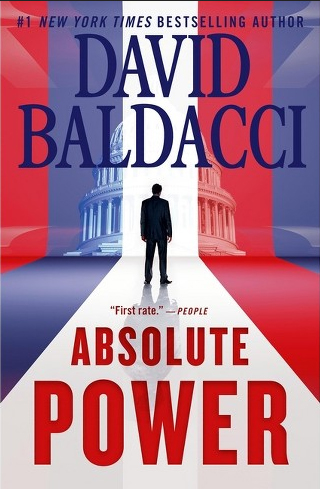 David Baldacci - AbsolutePower (1996), "The pacing is relentless. Each chapter ends
with a cliffhanger, making it hard to stop reading. The action scenes are vivid, and the political corruption
feels disturbingly plausible. Baldacci expertly balances high-stakes drama with quieter, character-driven
moments. What struck me most was the moral ambiguity. There’s no clear right or wrong, only shades of gray
that force you to question the systems meant to protect us. My only complaint is that some side characters
felt underdeveloped compared to Luther and the antagonist. Still, Absolute Power is a masterclass in suspense.
Sharp, intense, and unforgettable—it’s Baldacci at his best."
amyhagberg.com and
Kobo Books
David Baldacci - AbsolutePower (1996), "The pacing is relentless. Each chapter ends
with a cliffhanger, making it hard to stop reading. The action scenes are vivid, and the political corruption
feels disturbingly plausible. Baldacci expertly balances high-stakes drama with quieter, character-driven
moments. What struck me most was the moral ambiguity. There’s no clear right or wrong, only shades of gray
that force you to question the systems meant to protect us. My only complaint is that some side characters
felt underdeveloped compared to Luther and the antagonist. Still, Absolute Power is a masterclass in suspense.
Sharp, intense, and unforgettable—it’s Baldacci at his best."
amyhagberg.com and
Kobo Books
OTHER BOOK REVIEWS -
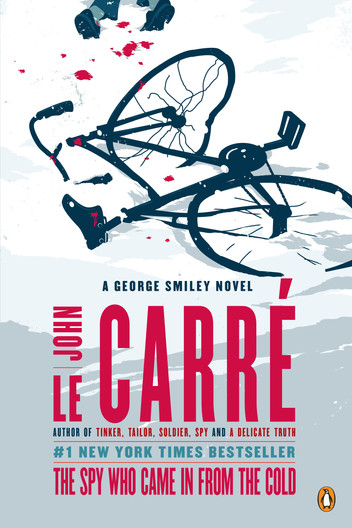 John le Carré - The Spy Who Came in from the Cold (1963), "The story follows Alec Leamas, a British spy nearing
the end of his career, as he is tasked with an elaborate deception to bring down a high-ranking East German intelligence
officer. Leamas must convincingly defect and become a disillusioned double agent, sacrificing his reputation and even
enduring a prison sentence to establish his cover. As the intricate plot unfolds, with its multiple twists and turns,
Leamas finds himself caught in a complex web of deception orchestrated by his own side, questioning the very loyalties
and ideologies he has devoted his life to."
henrykisor.com and
Kobo Books
John le Carré - The Spy Who Came in from the Cold (1963), "The story follows Alec Leamas, a British spy nearing
the end of his career, as he is tasked with an elaborate deception to bring down a high-ranking East German intelligence
officer. Leamas must convincingly defect and become a disillusioned double agent, sacrificing his reputation and even
enduring a prison sentence to establish his cover. As the intricate plot unfolds, with its multiple twists and turns,
Leamas finds himself caught in a complex web of deception orchestrated by his own side, questioning the very loyalties
and ideologies he has devoted his life to."
henrykisor.com and
Kobo Books
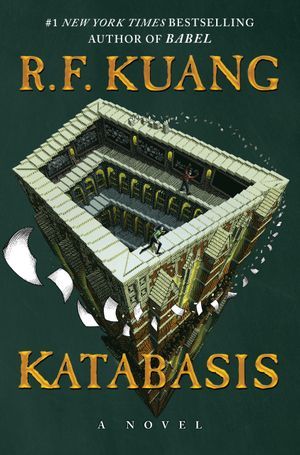 R. F. Kuang - KATABASIS (2025)
"Katabasis is the story of two PhD students who travel to hell with the sole purpose of rescuing the soul of
their advisor, Professor Jacob Grimes, who exploded in a freak magical accident that may or may not have been one
of the post-grads’ fault. However, it’s not remorse that leads Alice Law to making this journey. Why must they
descend into the pits of literal hell to save their thesis advisor, you may ask? So that he can write them job
recommendation letters, of course. In traversing the eight courts of hell, Alice Law and Peter Murdoch encounter
time-hardened souls awaiting divine judgement, spindly blood-thirsty bone creatures, a duo of even blood-thirstier
magicians, and plenty more infernal offerings, in order to save Grimes’ soul. "
~ grimdarkmagazine.com and
KOBO.com
R. F. Kuang - KATABASIS (2025)
"Katabasis is the story of two PhD students who travel to hell with the sole purpose of rescuing the soul of
their advisor, Professor Jacob Grimes, who exploded in a freak magical accident that may or may not have been one
of the post-grads’ fault. However, it’s not remorse that leads Alice Law to making this journey. Why must they
descend into the pits of literal hell to save their thesis advisor, you may ask? So that he can write them job
recommendation letters, of course. In traversing the eight courts of hell, Alice Law and Peter Murdoch encounter
time-hardened souls awaiting divine judgement, spindly blood-thirsty bone creatures, a duo of even blood-thirstier
magicians, and plenty more infernal offerings, in order to save Grimes’ soul. "
~ grimdarkmagazine.com and
KOBO.com
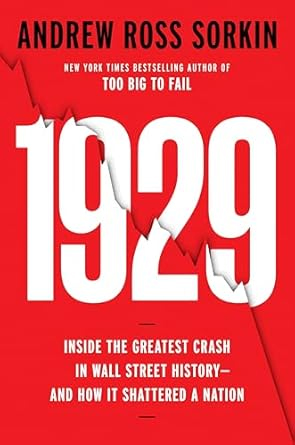 Andrew Ross Sorkin – 1929 (2025)
"An affluent age abruptly ends. Sorkin’s chronicle of economic calamity is well-versed in the language of high
finance and laser-focused on the rich and influential. Bankers and lawmakers share the limelight with actors and
statesmen seeking Wall Street wealth. The countless unsung Americans wrecked by the October 1929 stock market crash
and its aftermath are seldom heard from. This may frustrate some readers, but it’s not an oversight, as Sorkin
unapologetically—and not unreasonably—opts to concentrate on power players. As the New York Times columnist and
CNBC host explains, the “bloodbath” was triggered by chicanery, “easy credit” and the market’s “general opacity.”
During the run-up to the crash, bankers and affluent investors formed “stock pools.” These were a legal but “devious
and unfair” way to furtively accumulate “shares in a given company,” “artificially” raising the stock’s value. Some
market speculators tried to boost profits by “luring small-time speculators into” their “elaborate market schemes.” "
~ kirkusreviews.com and
KOBO.com
Andrew Ross Sorkin – 1929 (2025)
"An affluent age abruptly ends. Sorkin’s chronicle of economic calamity is well-versed in the language of high
finance and laser-focused on the rich and influential. Bankers and lawmakers share the limelight with actors and
statesmen seeking Wall Street wealth. The countless unsung Americans wrecked by the October 1929 stock market crash
and its aftermath are seldom heard from. This may frustrate some readers, but it’s not an oversight, as Sorkin
unapologetically—and not unreasonably—opts to concentrate on power players. As the New York Times columnist and
CNBC host explains, the “bloodbath” was triggered by chicanery, “easy credit” and the market’s “general opacity.”
During the run-up to the crash, bankers and affluent investors formed “stock pools.” These were a legal but “devious
and unfair” way to furtively accumulate “shares in a given company,” “artificially” raising the stock’s value. Some
market speculators tried to boost profits by “luring small-time speculators into” their “elaborate market schemes.” "
~ kirkusreviews.com and
KOBO.com
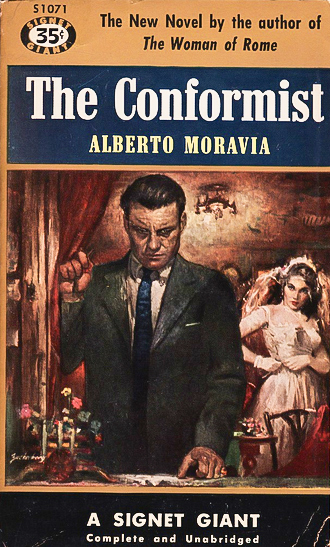 Alberto Moravia - The Conformist (1951), "an influential Italian author. First published
in 1951, the book delves into the psychological complexities of its main character, Marcello Clerici, as he
navigates through the political turmoil and societal pressures of Fascist Italy. Through its exploration of
conformity, identity, and the struggle between individualism and societal expectations, "The Conformist" offers
readers a profound and thought-provoking literary experience... set in Italy during the 1930s, a time when
Fascism was on the rise and Benito Mussolini ruled the country with an iron fist. The story follows the life of
Marcello Clerici, a young man who is plagued by feelings of insecurity and a desperate desire to fit in.
Determined to conform to the norms of his society, Marcello joins the Fascist Party and becomes an informant
for the secret police."
bookbrief.io and
Kobo Books
Alberto Moravia - The Conformist (1951), "an influential Italian author. First published
in 1951, the book delves into the psychological complexities of its main character, Marcello Clerici, as he
navigates through the political turmoil and societal pressures of Fascist Italy. Through its exploration of
conformity, identity, and the struggle between individualism and societal expectations, "The Conformist" offers
readers a profound and thought-provoking literary experience... set in Italy during the 1930s, a time when
Fascism was on the rise and Benito Mussolini ruled the country with an iron fist. The story follows the life of
Marcello Clerici, a young man who is plagued by feelings of insecurity and a desperate desire to fit in.
Determined to conform to the norms of his society, Marcello joins the Fascist Party and becomes an informant
for the secret police."
bookbrief.io and
Kobo Books
 Hiroshi Sakurazaka - All You Need Is Kill (2004)
"Sakuraska’s novel will likely conjure elements from some of the best of classic science fiction. It’s a great look at day-to-day
military encounters, with real world elements from Sun Tzu’s The Art of War, Richard Marcinko’s Rogue Warrior, Orson Scott Card’s Ender’s
Game, and Robert Heinlein’s Starship Troopers. It has its own thought-provoking “warning-sign” messages found in classics like Logan’s
Run and THX-1138, that adversity in the face of certain doom as in Pacific Rim, and the “what the heck is going on” feel from any number
of Philip K. Dick short stories (“Paycheck” and “We Can Remember it for You Wholesale” come to mind). "
~ Borg.com,
KOBO Books
Hiroshi Sakurazaka - All You Need Is Kill (2004)
"Sakuraska’s novel will likely conjure elements from some of the best of classic science fiction. It’s a great look at day-to-day
military encounters, with real world elements from Sun Tzu’s The Art of War, Richard Marcinko’s Rogue Warrior, Orson Scott Card’s Ender’s
Game, and Robert Heinlein’s Starship Troopers. It has its own thought-provoking “warning-sign” messages found in classics like Logan’s
Run and THX-1138, that adversity in the face of certain doom as in Pacific Rim, and the “what the heck is going on” feel from any number
of Philip K. Dick short stories (“Paycheck” and “We Can Remember it for You Wholesale” come to mind). "
~ Borg.com,
KOBO Books
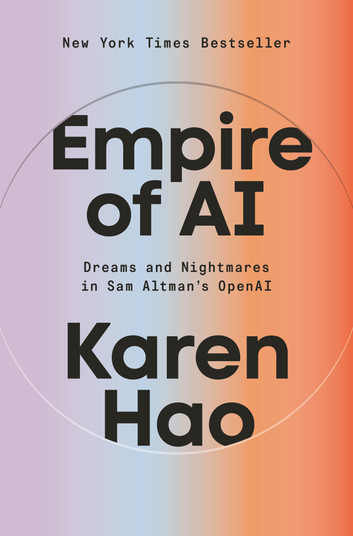 Karen Hao – Empire of AI (2025)
"If you’ve been following the meteoric rise of artificial intelligence in the last decade, you may have
read articles by tech journalist Karen Hao in the Atlantic, the Wall Street Journal or MIT Technology Review.
In her debut book, Empire of AI, Hao employs her expertise to investigate the cutthroat world of AI. The result
is a jaw-dropping indictment of an industry that operates with little check. The book chronicles the modern-day
race to develop AI, the breakneck pace of which has largely been set by the rise of OpenAI, the Microsoft-backed
startup behind the chatbot ChatGPT. "
~ sciencenews.org and
KOBO.com
Karen Hao – Empire of AI (2025)
"If you’ve been following the meteoric rise of artificial intelligence in the last decade, you may have
read articles by tech journalist Karen Hao in the Atlantic, the Wall Street Journal or MIT Technology Review.
In her debut book, Empire of AI, Hao employs her expertise to investigate the cutthroat world of AI. The result
is a jaw-dropping indictment of an industry that operates with little check. The book chronicles the modern-day
race to develop AI, the breakneck pace of which has largely been set by the rise of OpenAI, the Microsoft-backed
startup behind the chatbot ChatGPT. "
~ sciencenews.org and
KOBO.com
 Bobn Woodward – War (2025)
"If newspapers are the first draft of history, the books of Washington Post associate editor Bob Woodward can
claim to be the second draft. The quotes from major players are what newspaper reporters on a breaking story can only
dream of. War, Woodward’s new book on the inner workings of the Biden White House, is a worthy second draft, although
his story should perhaps have been better entitled Wars with an s. When he started writing, the Ukraine war was the
dominant issue, but the Oct. 7, 2023, Hamas attack on Israel has grabbed more headlines since. And, for continuity and
no doubt commercial timeliness, Woodward now includes the Harris/Trump presidential contest as another zone of combat."
~ washingtoninstitute.org and
KOBO.com
Bobn Woodward – War (2025)
"If newspapers are the first draft of history, the books of Washington Post associate editor Bob Woodward can
claim to be the second draft. The quotes from major players are what newspaper reporters on a breaking story can only
dream of. War, Woodward’s new book on the inner workings of the Biden White House, is a worthy second draft, although
his story should perhaps have been better entitled Wars with an s. When he started writing, the Ukraine war was the
dominant issue, but the Oct. 7, 2023, Hamas attack on Israel has grabbed more headlines since. And, for continuity and
no doubt commercial timeliness, Woodward now includes the Harris/Trump presidential contest as another zone of combat."
~ washingtoninstitute.org and
KOBO.com
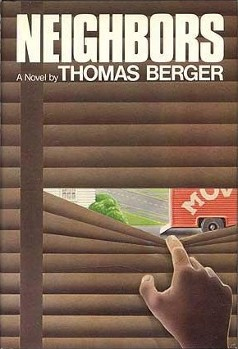 Thomas Berger –Neighbors (1980)
"Neighbors is a 1980 novel by American author Thomas Berger. It is a satire of manners and suburbia, and a comment on
emotional alienation with echoes of the works of Franz Kafka. Earl Keese’s character and situation begin realistically but become
increasingly fantastic. Keese is an Everyman whose life is swiftly turned upside down. As he scrambles to reclaim his sense of
normalcy and dignity, he comes to think that everyone, including his family, is against him. "
~ Wikipedia.com and
KOBO Books
Thomas Berger –Neighbors (1980)
"Neighbors is a 1980 novel by American author Thomas Berger. It is a satire of manners and suburbia, and a comment on
emotional alienation with echoes of the works of Franz Kafka. Earl Keese’s character and situation begin realistically but become
increasingly fantastic. Keese is an Everyman whose life is swiftly turned upside down. As he scrambles to reclaim his sense of
normalcy and dignity, he comes to think that everyone, including his family, is against him. "
~ Wikipedia.com and
KOBO BooksNeighbors (1981) movie adaptation: Belushi and wife, Walker, are suburbanites who live a comfortable if humdrum life. Their mundane existence is changed dramatically when Aykroyd and his wife, Moriarty, move in next door. While Walker finds the chaos they bring a refreshing change, Belushi is appalled by their Neighbors (1981) - Buy/Rent Watch online...
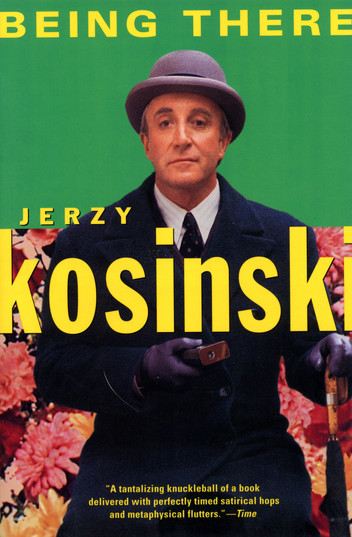 Jerzy Kosinski – Being There (1979)
"is a satirical novel by the Polish-born writer Jerzy Kosinski, published April 21, 1971.[1] Set in America,
the story concerns Chance, a simple gardener who unwittingly becomes a much sought-after political pundit and
commentator on the vagaries of the modern world. It has been suggested that Kosinski modeled the character
of Chance after a former greenhouse manager named Jerry Jarvis who became the national leader of the transcendental
meditation movement during the late 1960s and early 1970s,[2] whom Kosinski had met at the local TM Center in
Cambridge, Massachusetts, and who embodied the calm and simple manner of Chauncey Gardiner.[3] The Cambridge
TM Center was for years located at the corner of Chauncy and Garden Streets. "
~ Wikipedia. Link:
KOBO Books and
Jerzy Kosinski [Wikipedia]
Jerzy Kosinski – Being There (1979)
"is a satirical novel by the Polish-born writer Jerzy Kosinski, published April 21, 1971.[1] Set in America,
the story concerns Chance, a simple gardener who unwittingly becomes a much sought-after political pundit and
commentator on the vagaries of the modern world. It has been suggested that Kosinski modeled the character
of Chance after a former greenhouse manager named Jerry Jarvis who became the national leader of the transcendental
meditation movement during the late 1960s and early 1970s,[2] whom Kosinski had met at the local TM Center in
Cambridge, Massachusetts, and who embodied the calm and simple manner of Chauncey Gardiner.[3] The Cambridge
TM Center was for years located at the corner of Chauncy and Garden Streets. "
~ Wikipedia. Link:
KOBO Books and
Jerzy Kosinski [Wikipedia]
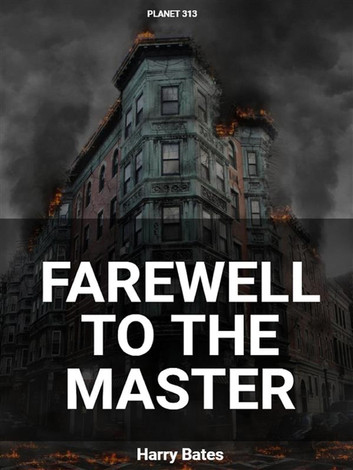 Harry Bates - Farewell to The Master (1940)
"The story is told from the viewpoint of Cliff Sutherland, a freelance picture reporter, who is present when a mysterious
"curving ovoid" ship suddenly appears on the grounds of the United States Capitol in Washington, D.C. Two days later, "visitors
from the Unknown" emerge: a "god-like" person in human form and an 8-foot (2.44 m) tall robot made of green metal. The former
only manages to state "I am Klaatu and this is Gnut" before he is shot and killed by a lunatic. Klaatu is buried nearby. In the
days that follow, Gnut remains motionless, while laboratories and a museum are built around it and the ship. Both prove impervious
to the investigations of scientists."
Wikipedia and
Kobo Books
Harry Bates - Farewell to The Master (1940)
"The story is told from the viewpoint of Cliff Sutherland, a freelance picture reporter, who is present when a mysterious
"curving ovoid" ship suddenly appears on the grounds of the United States Capitol in Washington, D.C. Two days later, "visitors
from the Unknown" emerge: a "god-like" person in human form and an 8-foot (2.44 m) tall robot made of green metal. The former
only manages to state "I am Klaatu and this is Gnut" before he is shot and killed by a lunatic. Klaatu is buried nearby. In the
days that follow, Gnut remains motionless, while laboratories and a museum are built around it and the ship. Both prove impervious
to the investigations of scientists."
Wikipedia and
Kobo Books
.jpg) Michael Crichton & James Patterson - Eruption (2024)
"It’s not often that two of the biggest storytellers (Crichton and Patterson) to ever put pen to paper
collaborate on a single project, and if anticipation wasn’t high enough already, toss in endorsements from
heavyweights like Don Winslow and Jeffrey Deaver, and you’ve got all the makings for a generational blockbuster.
The question is, can it live up to the hype? One thing is for sure . . . Eruption—a seismic event in today’s
literary world—is aptly titled, as it’s an explosion of stomach-knotting suspense, action, and the kind of
secrets worth killing to protect"
~ therealbookspy.com,
KOBO Books
Michael Crichton & James Patterson - Eruption (2024)
"It’s not often that two of the biggest storytellers (Crichton and Patterson) to ever put pen to paper
collaborate on a single project, and if anticipation wasn’t high enough already, toss in endorsements from
heavyweights like Don Winslow and Jeffrey Deaver, and you’ve got all the makings for a generational blockbuster.
The question is, can it live up to the hype? One thing is for sure . . . Eruption—a seismic event in today’s
literary world—is aptly titled, as it’s an explosion of stomach-knotting suspense, action, and the kind of
secrets worth killing to protect"
~ therealbookspy.com,
KOBO Books
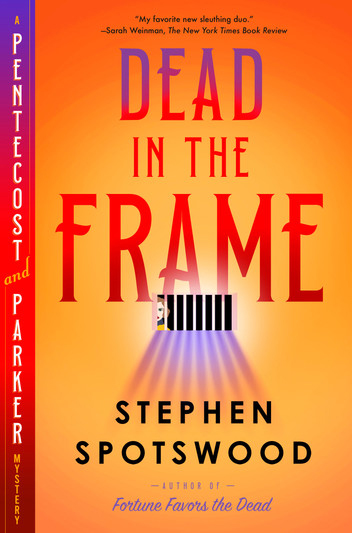 Stephen Spotswood – Dead in the Frame (2025)
"The most dramatic installment yet in the Nero Award-winning Pentecost and Parker series, as Will scrambles to
solve a shocking murder before Lillian takes the fall for the crime. NEW YORK CITY, 1947: Wealthy financier and
ghoulish connoisseur of crime, Jessup Quincannon, is dead, and famed detective Lillian Pentecost is under arrest
for his murder. Means, motive, and a mountain of evidence leave everyone believing she's guilty. Everyone, that is,
except Willowjean “Will” Parker, who knows for a fact her boss is innocent. She just doesn’t know if she can prove it."
~ readingreality.net and
KOBO.com
Stephen Spotswood – Dead in the Frame (2025)
"The most dramatic installment yet in the Nero Award-winning Pentecost and Parker series, as Will scrambles to
solve a shocking murder before Lillian takes the fall for the crime. NEW YORK CITY, 1947: Wealthy financier and
ghoulish connoisseur of crime, Jessup Quincannon, is dead, and famed detective Lillian Pentecost is under arrest
for his murder. Means, motive, and a mountain of evidence leave everyone believing she's guilty. Everyone, that is,
except Willowjean “Will” Parker, who knows for a fact her boss is innocent. She just doesn’t know if she can prove it."
~ readingreality.net and
KOBO.com
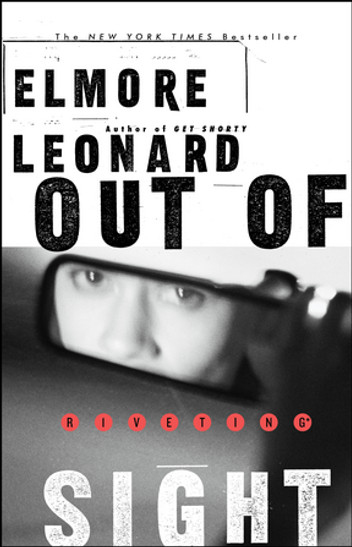 Elmore Leonard – Out of Sight (1996)
"THE oldest unsolved mystery on the books, human love, is the case to crack in ''Out of Sight,'' Elmore Leonard's new novel,
in which the cop is a lady with a gift for meeting Mr. Wrong and the robber is a guy who just might have been, in a
different life, Mr. Right. It begins auspiciously with a prison break, a group of convicts tunneling out of the medium-security
Florida pen where Jack Foley, a career bank robber, is doing time after his third major fall....
And here, for this reader at least, ''Out of Sight'' slides off the road into an Everglades of incredibility.
For in order to accept the main action of the rest of the novel, we must now accept that both kidnapped and kidnapper --
a female Federal law-enforcement officer and the man who has robbed more banks than anyone in the F.B.I.'s computer --
experience in the trunk of a moving car a conversational intimacy that leaves them helplessly infatuated with each other,
even as Karen Sisco conceals a .38-caliber pistol between her legs. It's a bizarrely relocated movie ''cute meet,'' and the
busy scribes of Hollywood should be stealing pages from Elmore Leonard's book, not the other way around. "
~ Ralph Lombreglia - New York Times. Link:
KOBO Books and
Elmore Leonard [Wikipedia]
Elmore Leonard – Out of Sight (1996)
"THE oldest unsolved mystery on the books, human love, is the case to crack in ''Out of Sight,'' Elmore Leonard's new novel,
in which the cop is a lady with a gift for meeting Mr. Wrong and the robber is a guy who just might have been, in a
different life, Mr. Right. It begins auspiciously with a prison break, a group of convicts tunneling out of the medium-security
Florida pen where Jack Foley, a career bank robber, is doing time after his third major fall....
And here, for this reader at least, ''Out of Sight'' slides off the road into an Everglades of incredibility.
For in order to accept the main action of the rest of the novel, we must now accept that both kidnapped and kidnapper --
a female Federal law-enforcement officer and the man who has robbed more banks than anyone in the F.B.I.'s computer --
experience in the trunk of a moving car a conversational intimacy that leaves them helplessly infatuated with each other,
even as Karen Sisco conceals a .38-caliber pistol between her legs. It's a bizarrely relocated movie ''cute meet,'' and the
busy scribes of Hollywood should be stealing pages from Elmore Leonard's book, not the other way around. "
~ Ralph Lombreglia - New York Times. Link:
KOBO Books and
Elmore Leonard [Wikipedia]
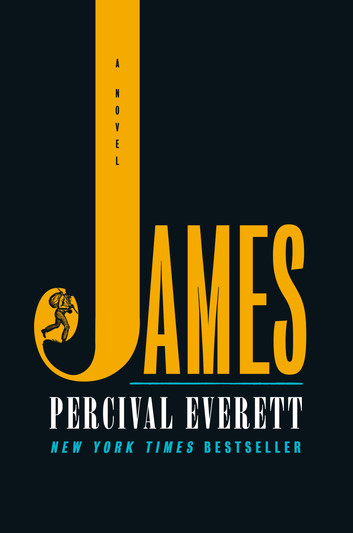 Percival Everett - James (2024)
"This isn’t the first novel to reimagine Twain’s 1885 masterpiece, but the audacious and prolific
Everett dives into the very heart of Twain’s epochal odyssey, shifting the central viewpoint from that
of the unschooled, often credulous, but basically good-hearted Huck to the more enigmatic and heroic Jim,
the Black slave with whom the boy escapes via raft on the Mississippi River. As in the original, the threat
of Jim’s being sold “down the river” and separated from his wife and daughter compels him to run away while
figuring out what to do next. He's soon joined by Huck, who has faked his own death to get away from an abusive
father, ramping up Jim’s panic. “Huck was supposedly murdered and I’d just run away,” Jim thinks. “Who did I
think they would suspect of the heinous crime?” "
Kirkus Review and
Kobo Books
Percival Everett - James (2024)
"This isn’t the first novel to reimagine Twain’s 1885 masterpiece, but the audacious and prolific
Everett dives into the very heart of Twain’s epochal odyssey, shifting the central viewpoint from that
of the unschooled, often credulous, but basically good-hearted Huck to the more enigmatic and heroic Jim,
the Black slave with whom the boy escapes via raft on the Mississippi River. As in the original, the threat
of Jim’s being sold “down the river” and separated from his wife and daughter compels him to run away while
figuring out what to do next. He's soon joined by Huck, who has faked his own death to get away from an abusive
father, ramping up Jim’s panic. “Huck was supposedly murdered and I’d just run away,” Jim thinks. “Who did I
think they would suspect of the heinous crime?” "
Kirkus Review and
Kobo Books
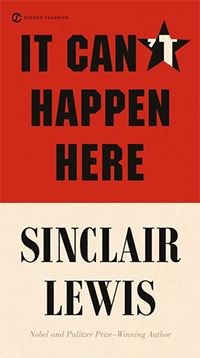 Sinclair Lewis – It Can't Happen Here (1935)
"The Vermont doctor, successful and respected, is with friends, listening to the radio as Senator Buzz Windrip
is nominated by the Democratic Party to become President of the United States. Windrip is a shoo-in in the 1936
election, and some of the friends around that radio fear that, given his proposals and the sorts of people he has
gathered around himself, Windrip will become an American dictator. Bosh, the doctor says... Yet, it does. And the
doctor is one of the first to be marched out behind the courthouse and summarily executed by a firing squad."
~ PatrickReardon.com and
KOBO.com
Sinclair Lewis – It Can't Happen Here (1935)
"The Vermont doctor, successful and respected, is with friends, listening to the radio as Senator Buzz Windrip
is nominated by the Democratic Party to become President of the United States. Windrip is a shoo-in in the 1936
election, and some of the friends around that radio fear that, given his proposals and the sorts of people he has
gathered around himself, Windrip will become an American dictator. Bosh, the doctor says... Yet, it does. And the
doctor is one of the first to be marched out behind the courthouse and summarily executed by a firing squad."
~ PatrickReardon.com and
KOBO.com
 Tomihiko Morimi - The Tatami Galaxy (2004) [Translated by Emily Balistrieri]
"Tomihiko Morimi’s “The Tatami Galaxy,” first published in Japan in 2004, is a frolicking novel packed with slacker
hijinks and escapades. At its core lies pithy wisdom about choice and destiny. Many anime fans are already familiar
with the “Tatami Galaxy” world, thanks to the TV series adaptation helmed by Masaaki Yuasa in 2010. In novel form,
Morimi’s sci-fi fusion of fun and the unfathomable offers a light touch that makes a lasting impression... What unfolds
is an adventure to read. The frenetic pace of the narrative is anchored by its repetition. The clever and subtle ways
in which each chapter informs the others reverberates across the storylines and “The Tatami Galaxy” as a whole becomes
a lightly philosophical look at the human condition."
~ Read Review: japantimes.co.jp,
KOBO Books and
The Tatami Galaxy - Wikipedia
Tomihiko Morimi - The Tatami Galaxy (2004) [Translated by Emily Balistrieri]
"Tomihiko Morimi’s “The Tatami Galaxy,” first published in Japan in 2004, is a frolicking novel packed with slacker
hijinks and escapades. At its core lies pithy wisdom about choice and destiny. Many anime fans are already familiar
with the “Tatami Galaxy” world, thanks to the TV series adaptation helmed by Masaaki Yuasa in 2010. In novel form,
Morimi’s sci-fi fusion of fun and the unfathomable offers a light touch that makes a lasting impression... What unfolds
is an adventure to read. The frenetic pace of the narrative is anchored by its repetition. The clever and subtle ways
in which each chapter informs the others reverberates across the storylines and “The Tatami Galaxy” as a whole becomes
a lightly philosophical look at the human condition."
~ Read Review: japantimes.co.jp,
KOBO Books and
The Tatami Galaxy - Wikipedia
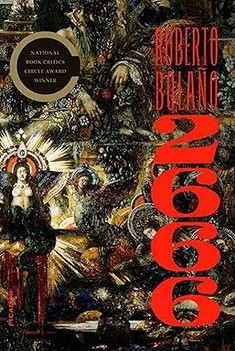 Roberto Bolaño - 2666 [Translated by Natasha Wimmer] (2004)
"Roberto Bolaño's 2666 is a difficult experience to shake off; it lingers in the unconscious
like a sizzling psychotropic for days or weeks after reading. It is a novel both prodigious in scope
and profound in implication, but a book ablaze with the furious passion of its own composition. At
times, it reads like a race against death. At others, you can only wonder at the reach and raw
intelligence of the writing. Having received adulatory reviews in Spain four years ago, 2666 is
now, in Natasha Wimmer's impressive translation, receiving the same kind of response in the
English-speaking world. Bolaño himself is sadly not around to enjoy the celebrations. He died
in 2003, awaiting a liver transplant, at the age of 50. He had only recently been acclaimed as
the pre-eminent figure of new Latin American writing, after years of obscurity.."
and
Kobo Books
Roberto Bolaño - 2666 [Translated by Natasha Wimmer] (2004)
"Roberto Bolaño's 2666 is a difficult experience to shake off; it lingers in the unconscious
like a sizzling psychotropic for days or weeks after reading. It is a novel both prodigious in scope
and profound in implication, but a book ablaze with the furious passion of its own composition. At
times, it reads like a race against death. At others, you can only wonder at the reach and raw
intelligence of the writing. Having received adulatory reviews in Spain four years ago, 2666 is
now, in Natasha Wimmer's impressive translation, receiving the same kind of response in the
English-speaking world. Bolaño himself is sadly not around to enjoy the celebrations. He died
in 2003, awaiting a liver transplant, at the age of 50. He had only recently been acclaimed as
the pre-eminent figure of new Latin American writing, after years of obscurity.."
and
Kobo Books
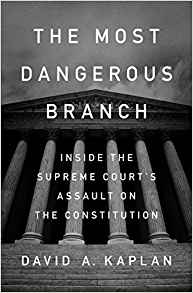 David A. Kaplan - The Most Dangerous Branch (2020)
"In the words of Alexander Hamilton, the Supreme Court is “the least dangerous branch…having neither
force nor will, but merely judgment.” And yet events of 2018 — especially the resignation of “swing vote”
Justice Anthony Kennedy, and the ugly and contentious Brett Kavanaugh hearings — were only the latest
manifestations of the court’s transformation into a political circus. David A. Kaplan’s new book, The
Most Dangerous Branch, which was published between Kavanaugh’s nomination and confirmation, asserts that
the Supreme Court has gone seriously off the rails: pushing itself into increasingly incendiary cases,
attempting to remake U.S. social order, and overturning acts of Congress at will (and, in the process,
weakening that branch of government). He mostly makes his case, although it will take a hardy reader to
stick with him until the end."
~ Elizabeth J. Moore - Washington Post,
KOBO Books
David A. Kaplan - The Most Dangerous Branch (2020)
"In the words of Alexander Hamilton, the Supreme Court is “the least dangerous branch…having neither
force nor will, but merely judgment.” And yet events of 2018 — especially the resignation of “swing vote”
Justice Anthony Kennedy, and the ugly and contentious Brett Kavanaugh hearings — were only the latest
manifestations of the court’s transformation into a political circus. David A. Kaplan’s new book, The
Most Dangerous Branch, which was published between Kavanaugh’s nomination and confirmation, asserts that
the Supreme Court has gone seriously off the rails: pushing itself into increasingly incendiary cases,
attempting to remake U.S. social order, and overturning acts of Congress at will (and, in the process,
weakening that branch of government). He mostly makes his case, although it will take a hardy reader to
stick with him until the end."
~ Elizabeth J. Moore - Washington Post,
KOBO Books
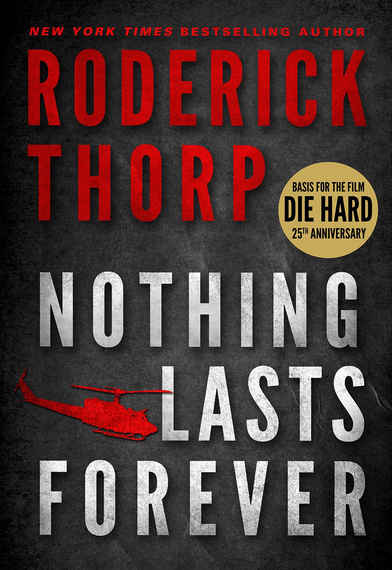 Roderick Thorp – Nothing Lasts Forever (1979)
"High atop a Los Angeles skyscraper, an office Christmas party turns into a deadly cage-match between a lone New York City
cop and a gang of international terrorists. Every action fan knows it could only be the explosive big-screen blockbuster Die
Hard. But before Bruce Willis blew away audiences as unstoppable hero John McClane, author Roderick Thorp knocked out thriller
readers with the bestseller that started it all."
Roderick Thorp – Nothing Lasts Forever (1979)
"High atop a Los Angeles skyscraper, an office Christmas party turns into a deadly cage-match between a lone New York City
cop and a gang of international terrorists. Every action fan knows it could only be the explosive big-screen blockbuster Die
Hard. But before Bruce Willis blew away audiences as unstoppable hero John McClane, author Roderick Thorp knocked out thriller
readers with the bestseller that started it all." ~ BookReporter.com, ~ Wikipedia.com,
and KOBO Books Author: Roderick Mayne Thorp Jr. (September 1, 1936 – April 28, 1999) was an American novelist specializing mainly in police procedural/crime novels. His novel The Detective was adapted into a film of the same name in 1968. Thorp is also better known for its sequel, the bestselling novel, Nothing Lasts Forever, which later served as the basis for the film Die Hard, thus Thorp became a creator of the entire media franchise of the same name. Two other Thorp novels, Rainbow Drive and Devlin, were also adapted into TV movies. Source: Wikipedia Watch movie: Die Hard (1988) - Buy/Rent Watch online
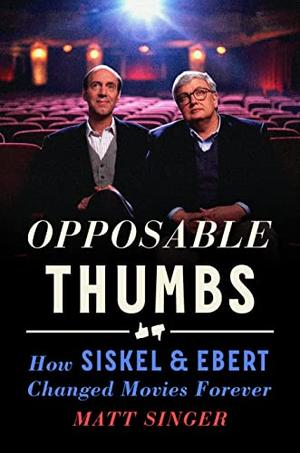 Matt Singer - OPPOSABLE THUMBS... How Siskel & Ebert Changed Movies Forever
"The author’s fulsome praise aside, there’s no questioning that Siskel and Ebert were a cultural phenomenon,
and while it’s debatable that they “invented an entirely new kind of film criticism,” they certainly had an impact. Since
both critics were dead at the writing of this book, Singer relies on copious previously published accounts—and YouTube–archived
episodes of their shows—for their voices. Interviews with both men’s widows and with former production staff help flesh out the
history. Readers who recall Siskel and Ebert will be delighted by this opportunity to reminisce. "
~ Kirkus Reviews,
KOBO Books
Matt Singer - OPPOSABLE THUMBS... How Siskel & Ebert Changed Movies Forever
"The author’s fulsome praise aside, there’s no questioning that Siskel and Ebert were a cultural phenomenon,
and while it’s debatable that they “invented an entirely new kind of film criticism,” they certainly had an impact. Since
both critics were dead at the writing of this book, Singer relies on copious previously published accounts—and YouTube–archived
episodes of their shows—for their voices. Interviews with both men’s widows and with former production staff help flesh out the
history. Readers who recall Siskel and Ebert will be delighted by this opportunity to reminisce. "
~ Kirkus Reviews,
KOBO Books
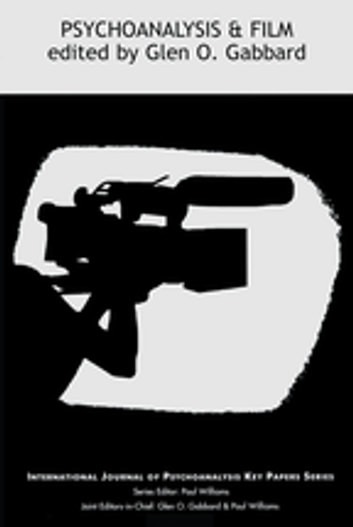 Glen O. Gabbard – Psychoanalysis and Film (2001)
"The connections between film and psychoanalysis exist at many levels of the imagination and mind as well as image and are. Even without
knowing it, film and psychoanalysis are allies in the exploration of how to see the human being. Here is a book that takes us into these
connections - a journey into both mysteries and light. It is as compelling as it is important.' - Hugh Brody, Film Director, Anthropologist,
Author. 'This exciting gathering of psychoanalytic studies of film represents a major breakthrough in applied psychoanalysis. a group of
leading international psychoanalysts explore film as a dominant expression of contemporary culture, its reflection of both universal myths
and contemporary anxiety. As Glen Gabbard rightly proposes, film serves as the cultural function that classical theatre played in ancient
Greece. The psychoanalytic exploration in this volume opens original views on the artistic expression of the anxieties and conflicts that
affect not only our patients but all of us.' - Otto Kernberg, Training and Supervising Analyst, Columbia University for Psychoanalytic
Training and Research."
~ karnacbooks.com,
Amazon Books
Glen O. Gabbard – Psychoanalysis and Film (2001)
"The connections between film and psychoanalysis exist at many levels of the imagination and mind as well as image and are. Even without
knowing it, film and psychoanalysis are allies in the exploration of how to see the human being. Here is a book that takes us into these
connections - a journey into both mysteries and light. It is as compelling as it is important.' - Hugh Brody, Film Director, Anthropologist,
Author. 'This exciting gathering of psychoanalytic studies of film represents a major breakthrough in applied psychoanalysis. a group of
leading international psychoanalysts explore film as a dominant expression of contemporary culture, its reflection of both universal myths
and contemporary anxiety. As Glen Gabbard rightly proposes, film serves as the cultural function that classical theatre played in ancient
Greece. The psychoanalytic exploration in this volume opens original views on the artistic expression of the anxieties and conflicts that
affect not only our patients but all of us.' - Otto Kernberg, Training and Supervising Analyst, Columbia University for Psychoanalytic
Training and Research."
~ karnacbooks.com,
Amazon Books
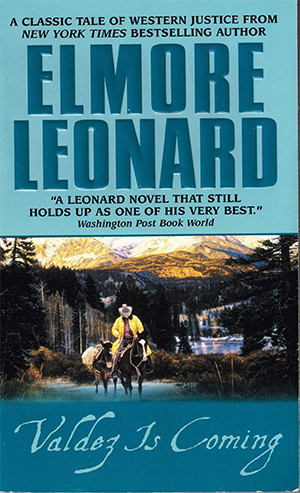 Elmore Leonard – Valdez Is Coming (1970)
"A man can be in different places, different times, and be different men. Everyone likes slow moving Western constable
Bob Valdez, who is allowed to patrol the Mexican part of town. He is a quiet man, a decent man who cares for the people he
serves. However, when cattle baron turned gunrunner Frank Tanner and his hardcase thugs cause Valdez to kill a black man
falsely accused of murder, another man, from another place and time, begins to stir. Seeking a lousy $100 to compensate
the dead man's pregnant Apache wife, Valdez becomes a target of Tanners disdain."
~ Read Review: sixgunjustice.com,
Amazon Books and
Website
Watch movie:
Valdez Is Coming (1971) - Buy/Rent Watch online
Elmore Leonard – Valdez Is Coming (1970)
"A man can be in different places, different times, and be different men. Everyone likes slow moving Western constable
Bob Valdez, who is allowed to patrol the Mexican part of town. He is a quiet man, a decent man who cares for the people he
serves. However, when cattle baron turned gunrunner Frank Tanner and his hardcase thugs cause Valdez to kill a black man
falsely accused of murder, another man, from another place and time, begins to stir. Seeking a lousy $100 to compensate
the dead man's pregnant Apache wife, Valdez becomes a target of Tanners disdain."
~ Read Review: sixgunjustice.com,
Amazon Books and
Website
Watch movie:
Valdez Is Coming (1971) - Buy/Rent Watch online
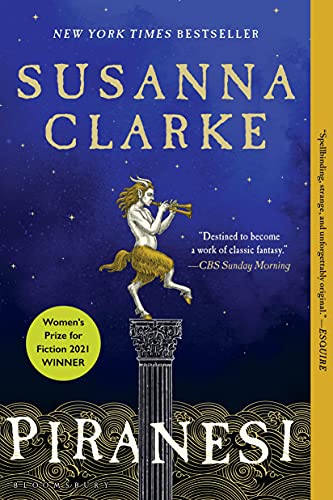 SusannaClarke - Piranesi (2020)
"What is the nature of magic? What is the nature of reason? Must one cancel out the other? And which is cloaked
in a greater illusion? In her new novel Piranesi, British writer Susanna Clarke limns a magic far more intrinsic than
the kind commanded through spells; a magic that is seemingly part of the fabric of the universe and as powerful as a
cosmic engine — yet fragile nonetheless. Clarke stunned readers 16 years ago with her mesmerizing tale of magic's return
to England in her debut novel, Jonathan Strange & Mr. Norrell. The book became an international bestseller, and was followed
by a collection of short stories, The Ladies of Grace Adieu. Then those of us who fell in love with her worlds had a
desperately long wait. (Thankfully not nearly as long as those awaiting magic's return in Jonathan Strange.)"
~ NPR and
Amazon Books
SusannaClarke - Piranesi (2020)
"What is the nature of magic? What is the nature of reason? Must one cancel out the other? And which is cloaked
in a greater illusion? In her new novel Piranesi, British writer Susanna Clarke limns a magic far more intrinsic than
the kind commanded through spells; a magic that is seemingly part of the fabric of the universe and as powerful as a
cosmic engine — yet fragile nonetheless. Clarke stunned readers 16 years ago with her mesmerizing tale of magic's return
to England in her debut novel, Jonathan Strange & Mr. Norrell. The book became an international bestseller, and was followed
by a collection of short stories, The Ladies of Grace Adieu. Then those of us who fell in love with her worlds had a
desperately long wait. (Thankfully not nearly as long as those awaiting magic's return in Jonathan Strange.)"
~ NPR and
Amazon Books
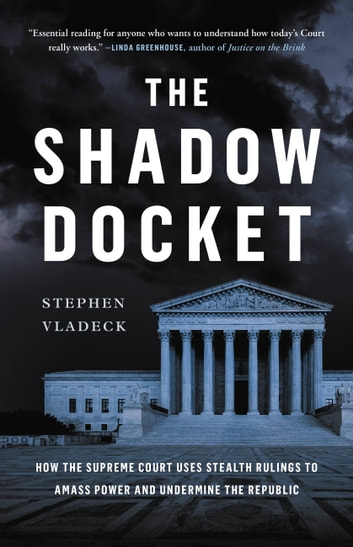 Stephen Vladeck – THE SHADOW DOCKET: How the Supreme Court Uses Stealth Rulings to Amass Power and Undermine the Republic (2023)
"The term “shadow docket” was coined in 2015, by William Baude, a University of Chicago law professor. In Vladeck’s words, it was “a catch-all
for a body of the supreme court’s work that was, to that point, receiving virtually no academic or public attention”. Strictly speaking, the
shadow docket is a vehicle for addressing issues that demand urgent attention, usually injunctions and orders to preserve the status quo. But
it has morphed into a fraught topic. The court has adjudicated cases involving abortion, voting rights and Covid policy by means of the shadow
docket. The docket also became the prime location for the elevation and reordering of religious rights, under the free exercise clause of the
first amendment."
~ Lloyd Green - The Guardian,
Rakuten Kobo Books
Stephen Vladeck – THE SHADOW DOCKET: How the Supreme Court Uses Stealth Rulings to Amass Power and Undermine the Republic (2023)
"The term “shadow docket” was coined in 2015, by William Baude, a University of Chicago law professor. In Vladeck’s words, it was “a catch-all
for a body of the supreme court’s work that was, to that point, receiving virtually no academic or public attention”. Strictly speaking, the
shadow docket is a vehicle for addressing issues that demand urgent attention, usually injunctions and orders to preserve the status quo. But
it has morphed into a fraught topic. The court has adjudicated cases involving abortion, voting rights and Covid policy by means of the shadow
docket. The docket also became the prime location for the elevation and reordering of religious rights, under the free exercise clause of the
first amendment."
~ Lloyd Green - The Guardian,
Rakuten Kobo Books
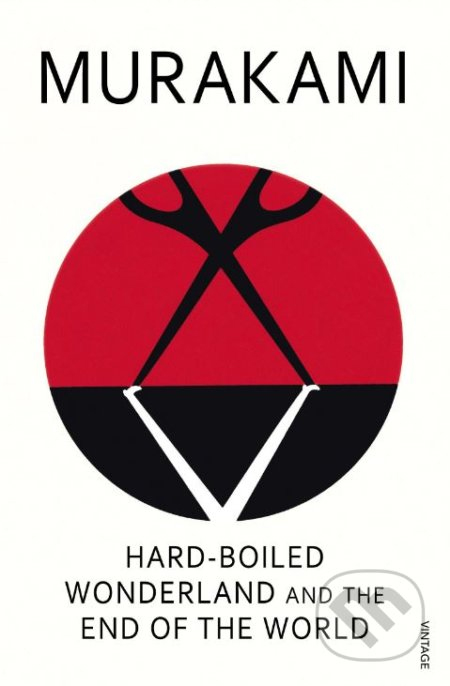 Murakami – Hard-Boiled Wonderland and the End of the World (1985)
"Winner of the Tanizaki Literary prize (the Japanese equivalent of the Pulitzer), by acclaimed young Japanese novelist
Murakami: a stunning combination of the contemporary and brash with elegiac allegory, all topped off by a strong measure
of cyberpunk... One of those rare postmodern novels that is as intellectually profound as stylistically accomplished,
by a writer with a bold and original vision."
~ Kirkusreviews.com,
Rakuten Kobo Books
Murakami – Hard-Boiled Wonderland and the End of the World (1985)
"Winner of the Tanizaki Literary prize (the Japanese equivalent of the Pulitzer), by acclaimed young Japanese novelist
Murakami: a stunning combination of the contemporary and brash with elegiac allegory, all topped off by a strong measure
of cyberpunk... One of those rare postmodern novels that is as intellectually profound as stylistically accomplished,
by a writer with a bold and original vision."
~ Kirkusreviews.com,
Rakuten Kobo Books
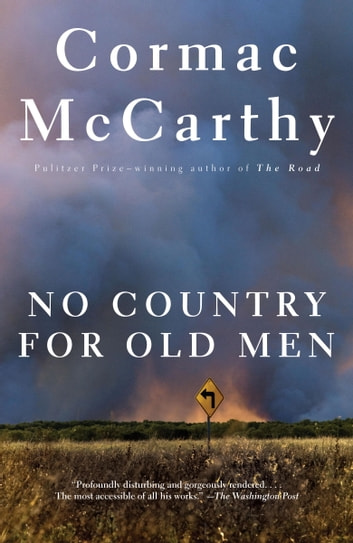 Cormac McCarthy - No Country for Old Men (2005)
"It’s a bleak chronicle of murder, revenge and implacable fate pocked with numerous echoes of McCarthy’s great Blood
Meridian (1985). Here, the story’s set in 1980 in southern Texas near the Mexican border, where aging Sheriff Bell, a
decorated WWII veteran, broods heroically over the territory he’s sworn to protect, while—in a superb, sorrowful
monologue—acknowledging the omnipresence of ineradicable evil all around him. Then the focus trains itself on Vietnam
vet Llewellyn Moss, a hunter who stumbles upon several dead bodies, a stash of Mexican heroin and more than $2 million
in cash that he absconds with."
~ kirkusreviews.com and
KOBO Books
Cormac McCarthy - No Country for Old Men (2005)
"It’s a bleak chronicle of murder, revenge and implacable fate pocked with numerous echoes of McCarthy’s great Blood
Meridian (1985). Here, the story’s set in 1980 in southern Texas near the Mexican border, where aging Sheriff Bell, a
decorated WWII veteran, broods heroically over the territory he’s sworn to protect, while—in a superb, sorrowful
monologue—acknowledging the omnipresence of ineradicable evil all around him. Then the focus trains itself on Vietnam
vet Llewellyn Moss, a hunter who stumbles upon several dead bodies, a stash of Mexican heroin and more than $2 million
in cash that he absconds with."
~ kirkusreviews.com and
KOBO Books
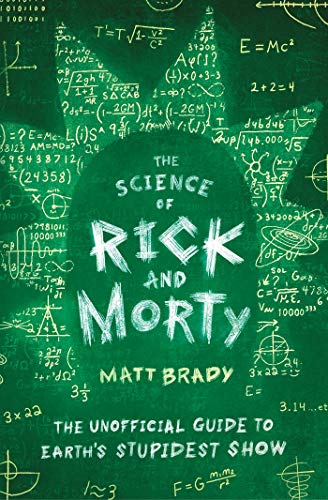 Matt Brady - The Science of Rick and Morty: The Unofficial Guide to Earth's Stupidest Show (2019)
"Adult Swim’s Rick and Morty is one of the smartest (and most insane) shows on television. Genius
alcoholic Rick Sanchez and his hapless grandson Morty have explored everything from particle physics
to human augmentation and much more in their intergalactic adventures through the multiverse. With
biting humor and plenty of nihilism, Rick and Morty employs cutting-edge scientific theories in every
episode. But, outside of Rick’s garage laboratory, what are these theories truly about and what can
they teach us about ourselves?"
~ scribd.com and
Amazon Books
Matt Brady - The Science of Rick and Morty: The Unofficial Guide to Earth's Stupidest Show (2019)
"Adult Swim’s Rick and Morty is one of the smartest (and most insane) shows on television. Genius
alcoholic Rick Sanchez and his hapless grandson Morty have explored everything from particle physics
to human augmentation and much more in their intergalactic adventures through the multiverse. With
biting humor and plenty of nihilism, Rick and Morty employs cutting-edge scientific theories in every
episode. But, outside of Rick’s garage laboratory, what are these theories truly about and what can
they teach us about ourselves?"
~ scribd.com and
Amazon Books
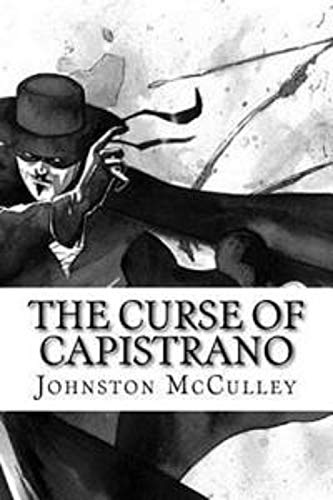 Johnston McCulley - The Curse of Capistrano
"One hundred years ago — on Aug. 9, 1919 — All-Story Weekly published the opening installment
of a serial entitled “The Curse of Capistrano.” Set in a highly idealized Southern California during
the early 19th century, when Spanish grandees ruled vast estates and Franciscan missions brought
Christianity to the indigenous population, the novel introduced a new adventure hero, the masked
avenger of the downtrodden and oppressed, the daring and debonair swordsman Zorro"
~ Michael Dirda - washingtonpost.com and
Archive.org
Johnston McCulley - The Curse of Capistrano
"One hundred years ago — on Aug. 9, 1919 — All-Story Weekly published the opening installment
of a serial entitled “The Curse of Capistrano.” Set in a highly idealized Southern California during
the early 19th century, when Spanish grandees ruled vast estates and Franciscan missions brought
Christianity to the indigenous population, the novel introduced a new adventure hero, the masked
avenger of the downtrodden and oppressed, the daring and debonair swordsman Zorro"
~ Michael Dirda - washingtonpost.com and
Archive.org
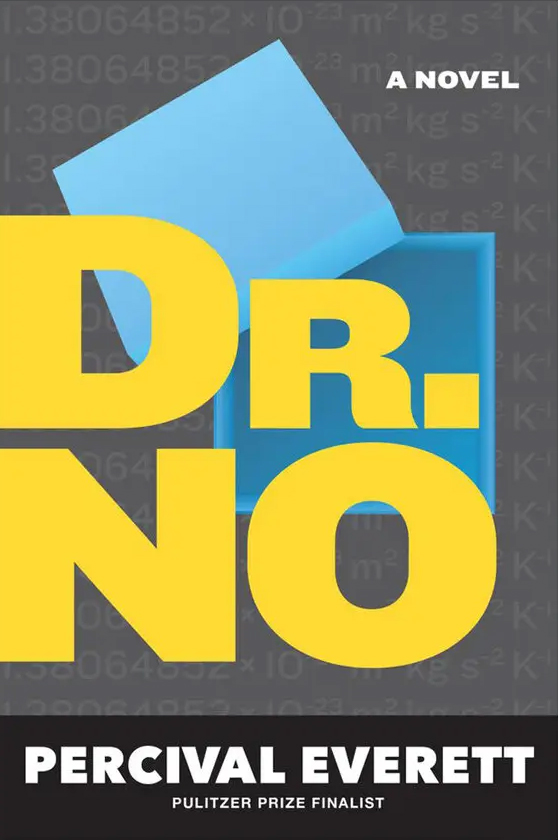 Percival Everett - Dr. No (2022)
"Everett is a formidably prolific author — the “Also by Percival Everett” list at the front of the book takes up an
entire page — and impossible to capture in a log line. Even if you concentrate only on the novels, leaving aside the poetry
and stories, you will be thwarted in every attempt to generalize. Everett writes parody and horror and magical realism; he
has produced an epistolary novel and a novel that was published in three variations but with the same cover."
Molly Young - New York Times,
Amazon Books
Percival Everett - Dr. No (2022)
"Everett is a formidably prolific author — the “Also by Percival Everett” list at the front of the book takes up an
entire page — and impossible to capture in a log line. Even if you concentrate only on the novels, leaving aside the poetry
and stories, you will be thwarted in every attempt to generalize. Everett writes parody and horror and magical realism; he
has produced an epistolary novel and a novel that was published in three variations but with the same cover."
Molly Young - New York Times,
Amazon Books
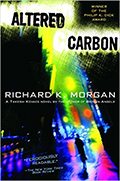 Richard K. Morgan - Altered Carbon (2003)
"In the far future universe of Richard K. Morgan's debut novel Altered Carbon, human consciousness
has been digitized. Every human being is implanted at birth with a cortical stack, which records
every second, every thought, every experience. If you have the money (or purchase the right
insurance policy), you can be brought back to life after you die by the simple expedient of
implanting your stack into a new body, a process known as sleeving. The penal system no longer
stores live criminals, but only their digital selves. Travelers beam their minds across space
via needlecast, and wake up in new sleeves. Wars are fought by troops whose minds are downloaded into
bodies on-site -- troops like the Envoy Corps, the enforcement arm of the despotic UN Protectorate,
which rules Earth and its colony worlds with an iron fist."
~ sfsite.com and
Amazon Books
Richard K. Morgan - Altered Carbon (2003)
"In the far future universe of Richard K. Morgan's debut novel Altered Carbon, human consciousness
has been digitized. Every human being is implanted at birth with a cortical stack, which records
every second, every thought, every experience. If you have the money (or purchase the right
insurance policy), you can be brought back to life after you die by the simple expedient of
implanting your stack into a new body, a process known as sleeving. The penal system no longer
stores live criminals, but only their digital selves. Travelers beam their minds across space
via needlecast, and wake up in new sleeves. Wars are fought by troops whose minds are downloaded into
bodies on-site -- troops like the Envoy Corps, the enforcement arm of the despotic UN Protectorate,
which rules Earth and its colony worlds with an iron fist."
~ sfsite.com and
Amazon Books
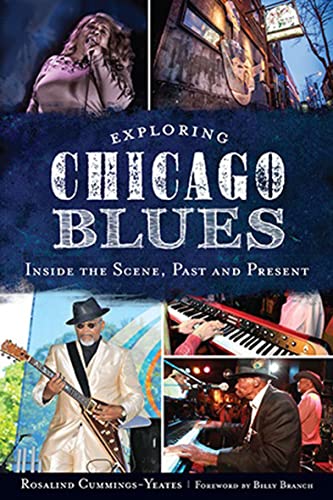 Exploring Chicago Blues: Inside the Scene, Past and Present
"Have you ever felt like you knew a place, only to learn something that peels back all your knowledge
and gives you more? Such is the case with Chicago to me, with a new book by one of my favorite cultural travel
writers, Rosalind Cummings-Yeates. She's written a book that is a must-read for Chicagoans, people that love
music, historians, and anyone heading to Chicago (it'll probably change where you go, whilst there). Exploring
Chicago Blues: Inside the Scene, Past and Present is an honest, carefully crafted, genuine portrait of a city,
musicians, musical trends, culture, history, and personality. It is, hands down, the best themed travel guide
I've ever read. I wasn't knowledgeable about Chicago Blues before; now I'm a huge fan. For what Cummings-Yeates
does, while carefully sharing history and her passion about this music, is to bring people - and music - to life."
~ Dr. Jessie Voigts - wanderingeducators.com and
Amazon Books
Exploring Chicago Blues: Inside the Scene, Past and Present
"Have you ever felt like you knew a place, only to learn something that peels back all your knowledge
and gives you more? Such is the case with Chicago to me, with a new book by one of my favorite cultural travel
writers, Rosalind Cummings-Yeates. She's written a book that is a must-read for Chicagoans, people that love
music, historians, and anyone heading to Chicago (it'll probably change where you go, whilst there). Exploring
Chicago Blues: Inside the Scene, Past and Present is an honest, carefully crafted, genuine portrait of a city,
musicians, musical trends, culture, history, and personality. It is, hands down, the best themed travel guide
I've ever read. I wasn't knowledgeable about Chicago Blues before; now I'm a huge fan. For what Cummings-Yeates
does, while carefully sharing history and her passion about this music, is to bring people - and music - to life."
~ Dr. Jessie Voigts - wanderingeducators.com and
Amazon Books
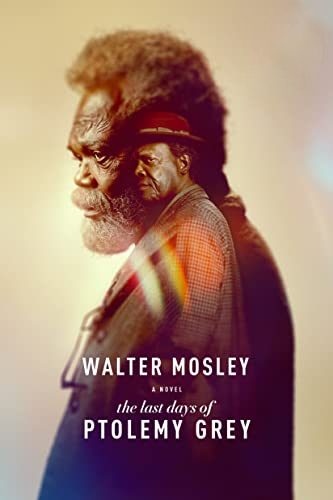 Walter Mosley - The Last Days of Ptolemy Grey (2010)
"With his 30th novel, "The Last Days of Ptolemy Grey," the fascinating Walter Mosley not only returns to top form,
but also extends once again the boundaries of the hard-boiled suspense genre in which his best work always has been rooted.
No other writer of the 58-year-old Mosley’s generation has done quite as much to keep the style of Hammett and Chandler
from lapsing into mere mannerism. His popular Easy Rawlins mysteries — probably his best books until now — extended the
genre’s affinity for social realism and added a dimension of historical recovery in portraying African Americans’ vital
but bittersweet life in postwar Los Angeles."
Tim Rutten - Los Angeles Times and
Amazon Books
Apple TV’s new limited series:
In ‘The Last Days of Ptolemy Grey,’ Samuel L. Jackson and Dominique Fishback Shine in Walter Mosley’s Whodunnit: TV Review ~ Joshua Alston - Variety
Walter Mosley - The Last Days of Ptolemy Grey (2010)
"With his 30th novel, "The Last Days of Ptolemy Grey," the fascinating Walter Mosley not only returns to top form,
but also extends once again the boundaries of the hard-boiled suspense genre in which his best work always has been rooted.
No other writer of the 58-year-old Mosley’s generation has done quite as much to keep the style of Hammett and Chandler
from lapsing into mere mannerism. His popular Easy Rawlins mysteries — probably his best books until now — extended the
genre’s affinity for social realism and added a dimension of historical recovery in portraying African Americans’ vital
but bittersweet life in postwar Los Angeles."
Tim Rutten - Los Angeles Times and
Amazon Books
Apple TV’s new limited series:
In ‘The Last Days of Ptolemy Grey,’ Samuel L. Jackson and Dominique Fishback Shine in Walter Mosley’s Whodunnit: TV Review ~ Joshua Alston - Variety
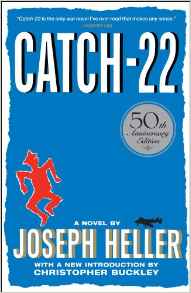 Joseph Heller - CATCH-22 (1961)
"Catch-22 tells the story of one Captain John Yossarian, an Air Force bomber pilot in WWII. While lots of people might think of him as a
hero for his brave service, Yossarian sees past all the pomp and patriotism and understands war as something else entirely: sheer madness. The
book condemns both war itself and the powers that carry out this systematic carnage. It's famous for its satirical tone, fractured narrative,
and linguistic flourishes—all of which reflect the nonsensical nature of the military enterprise that has Yossarian feeling hopelessly stuck.
And that phrase—hopelessly stuck—pretty much sums up the whole novel. These boys, as the title suggests, are in a classic catch-22."
Amazon Books
Joseph Heller - CATCH-22 (1961)
"Catch-22 tells the story of one Captain John Yossarian, an Air Force bomber pilot in WWII. While lots of people might think of him as a
hero for his brave service, Yossarian sees past all the pomp and patriotism and understands war as something else entirely: sheer madness. The
book condemns both war itself and the powers that carry out this systematic carnage. It's famous for its satirical tone, fractured narrative,
and linguistic flourishes—all of which reflect the nonsensical nature of the military enterprise that has Yossarian feeling hopelessly stuck.
And that phrase—hopelessly stuck—pretty much sums up the whole novel. These boys, as the title suggests, are in a classic catch-22."
Amazon Books
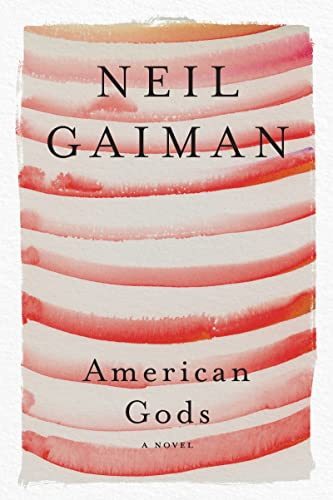 Neil Gaiman – American Gods: The Tenth Anniversary Edition (2011)
"Shadow is an ex-convict who is released from prison three days early when his wife Laura is killed in a car accident.
Shadow is devastated by her death, and is distraught to learn that she died alongside his best friend Robbie, with whom she
had been having an affair. He takes a job as a bodyguard for a mysterious con man, Mr. Wednesday, and travels with him across
the United States, visiting Wednesday's acquaintances. Shadow meets a leprechaun named Mad Sweeney, who gives Shadow a magical
gold coin after Shadow beats him in a fight. Shadow later tosses the coin into his wife's grave at her funeral, inadvertently
bringing her back from the dead as a semi-living revenant. Shadow meets Czernobog and the Zorya Sisters. One of the sisters
gives Shadow a silver coin, coming from the moon, that will protect him. Shadow learns that Wednesday is an incarnation of
Odin the All-Father, and that he is recruiting American manifestations of the Old Gods, whose powers have waned as their
believers have decreased in number, to participate in a battle against the New American Gods – manifestations of modern
life and technology, such as the Internet, media, and modern means of transport. Shadow meets many of Wednesday's allies,
including Mr. Nancy (Anansi), Easter (Eostre), Whiskey Jack (Wisakedjak) and John Chapman (Johnny Appleseed). "
~ Wikipedia and
Amazon.com
Neil Gaiman – American Gods: The Tenth Anniversary Edition (2011)
"Shadow is an ex-convict who is released from prison three days early when his wife Laura is killed in a car accident.
Shadow is devastated by her death, and is distraught to learn that she died alongside his best friend Robbie, with whom she
had been having an affair. He takes a job as a bodyguard for a mysterious con man, Mr. Wednesday, and travels with him across
the United States, visiting Wednesday's acquaintances. Shadow meets a leprechaun named Mad Sweeney, who gives Shadow a magical
gold coin after Shadow beats him in a fight. Shadow later tosses the coin into his wife's grave at her funeral, inadvertently
bringing her back from the dead as a semi-living revenant. Shadow meets Czernobog and the Zorya Sisters. One of the sisters
gives Shadow a silver coin, coming from the moon, that will protect him. Shadow learns that Wednesday is an incarnation of
Odin the All-Father, and that he is recruiting American manifestations of the Old Gods, whose powers have waned as their
believers have decreased in number, to participate in a battle against the New American Gods – manifestations of modern
life and technology, such as the Internet, media, and modern means of transport. Shadow meets many of Wednesday's allies,
including Mr. Nancy (Anansi), Easter (Eostre), Whiskey Jack (Wisakedjak) and John Chapman (Johnny Appleseed). "
~ Wikipedia and
Amazon.com
 Ernie Richards – Shakespeare's Women In Love: The women characters in Shakespeare’s plays (2014)
"This booklet is about the women characters in Shakespeare’s plays, and how he portrays them. He does
what no other writer has done – or could do. He presents women as the one force in society capable of saving
mankind from itself: the essential earth-mother, the nurturing force behind everything born, and the solver of
problems. He shows that women can be the main force in society for civilising men, for curbing their instincts
to fight and kill, and to replace those violent impulses with the gentler arts of tolerance, love and forgiveness."
~ Goodreads.com and
Amazon.com
Ernie Richards – Shakespeare's Women In Love: The women characters in Shakespeare’s plays (2014)
"This booklet is about the women characters in Shakespeare’s plays, and how he portrays them. He does
what no other writer has done – or could do. He presents women as the one force in society capable of saving
mankind from itself: the essential earth-mother, the nurturing force behind everything born, and the solver of
problems. He shows that women can be the main force in society for civilising men, for curbing their instincts
to fight and kill, and to replace those violent impulses with the gentler arts of tolerance, love and forgiveness."
~ Goodreads.com and
Amazon.com
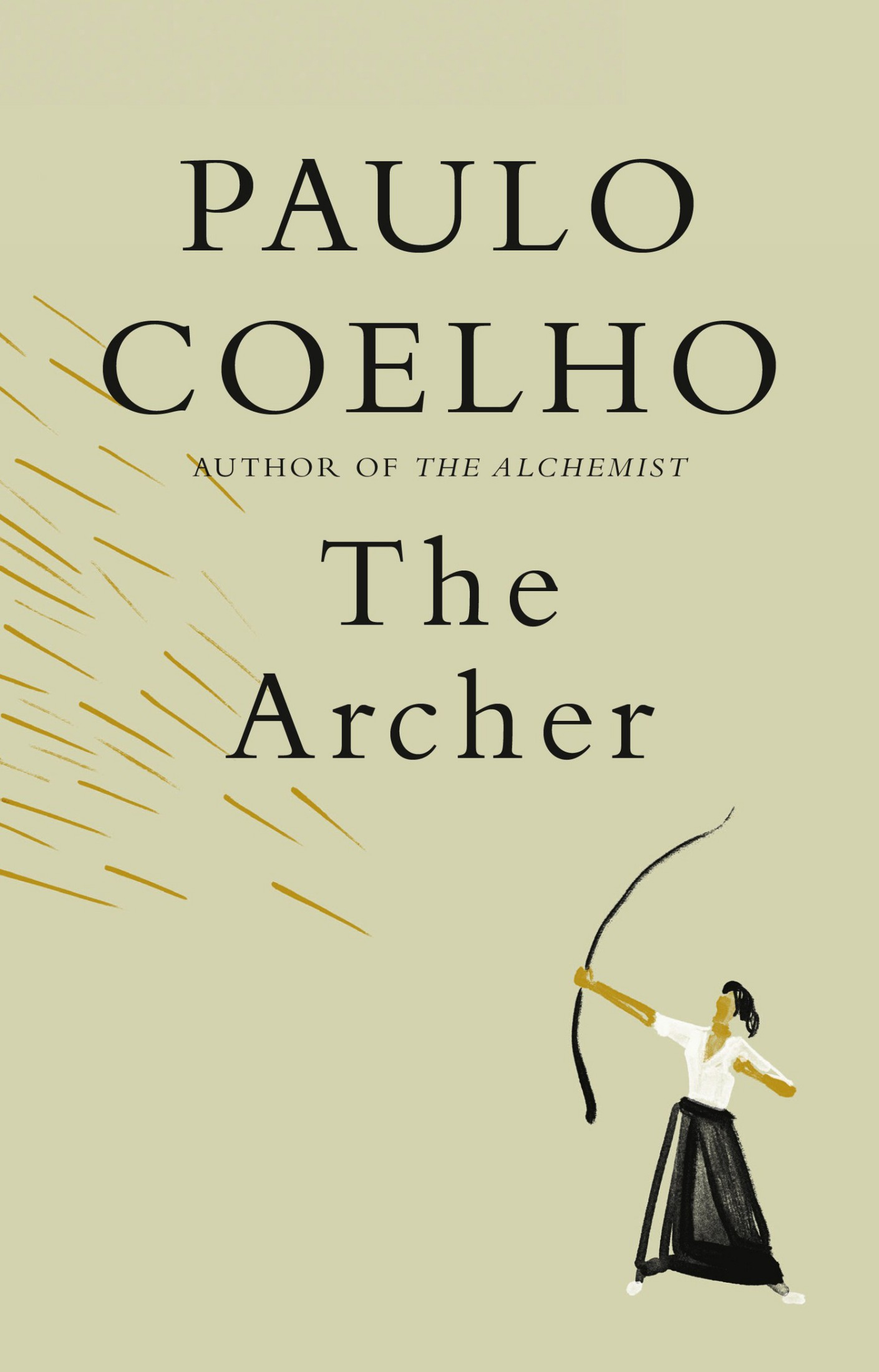 Paulo Coelho - The Archer (2020)
"Paulo Coelho provides his guidelines with a simple language and with a great amount of
moral lessons. He stated a main point that sums up the whole book: “choose your target, do
your best, have a goal in your life to hit it,” and that is through going into the “way of
the bow” which Coelho describes as “the way of joy and enthusiasm, of perfection and error,
of technique and instinct. Tetsuya, who is the main character in this story, represents the
author himself. Paulo Coelho said in an interview that he learned archery, and so he wrote
about his experience, “At the end of the day, it is life. You learn by living your life fully,”
he said. And, at the end of the interview, Coelho hoped that people “use The Archer to help
them learn the basics of life."”"
Joyce Bou Charaa - The Mark Literary Review and
Amazon Books
Paulo Coelho - The Archer (2020)
"Paulo Coelho provides his guidelines with a simple language and with a great amount of
moral lessons. He stated a main point that sums up the whole book: “choose your target, do
your best, have a goal in your life to hit it,” and that is through going into the “way of
the bow” which Coelho describes as “the way of joy and enthusiasm, of perfection and error,
of technique and instinct. Tetsuya, who is the main character in this story, represents the
author himself. Paulo Coelho said in an interview that he learned archery, and so he wrote
about his experience, “At the end of the day, it is life. You learn by living your life fully,”
he said. And, at the end of the interview, Coelho hoped that people “use The Archer to help
them learn the basics of life."”"
Joyce Bou Charaa - The Mark Literary Review and
Amazon Books
 Harry Harrison – Make Room! Make Room! (1966)
"Society has broken down. The weather’s weird. The air is foul with pollution. No one can travel anywhere.
The government is unaccountable, brutal, corrupt, criminal. The police spend their time beating up protestors
while ignoring most crimes because that uses up too many resources. People keep coming up with really crappy
vegan alternatives to meat. Everyone is exhausted. The only nice place left on Earth is Denmark...
There were even moments when I worried that the events in Make Room! Make Room! were blurring all too easily
into all the coronavirus news updates as I read. But mainly it’s been cathartic to experience this vision of
a society in peril. Harrison’s characters may be beaten down, but he also makes you feel that if they can keep
going, so can we. This book comes from a hopeful place, in spite of his portrayals of an unhappy future:
catastrophe can be averted. As Harrison once wrote, “if science fiction can teach us one thing, it is that
we have the power to change”. Let’s hope he’s at least right about that one. "
~ The Guardian and
Amazon.com
Harry Harrison – Make Room! Make Room! (1966)
"Society has broken down. The weather’s weird. The air is foul with pollution. No one can travel anywhere.
The government is unaccountable, brutal, corrupt, criminal. The police spend their time beating up protestors
while ignoring most crimes because that uses up too many resources. People keep coming up with really crappy
vegan alternatives to meat. Everyone is exhausted. The only nice place left on Earth is Denmark...
There were even moments when I worried that the events in Make Room! Make Room! were blurring all too easily
into all the coronavirus news updates as I read. But mainly it’s been cathartic to experience this vision of
a society in peril. Harrison’s characters may be beaten down, but he also makes you feel that if they can keep
going, so can we. This book comes from a hopeful place, in spite of his portrayals of an unhappy future:
catastrophe can be averted. As Harrison once wrote, “if science fiction can teach us one thing, it is that
we have the power to change”. Let’s hope he’s at least right about that one. "
~ The Guardian and
Amazon.com
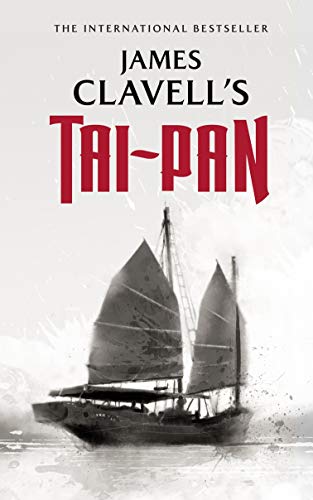 James Clavell - TAI-PAN (1966)
"A fat, gusty, commercial historical novel that will most probably sweep the bookstore windows
on the strength of its narrative, Tai-Pan is a much better book than Clavell's first, King Rat. It
describes the British occupation of Hong Kong in 1841 and an empire built upon opium smuggling. Tai-Pan
means "supreme power" and seadog Dirk Struan's Noble House is the supreme money power on the "godrotting"
island. Struan's rival is aging, one-eyed Tyler Brock, an opposition which extends nepotically through
their grown sons and daughters. Also in the power play are Russians, Americans and several Chinese factions.
Brock, the island's second richest operator, wants to be Tai-Pan himself, steal Noble House from Struan, and
set up his own sons as supreme powers. Both men smuggle opium for cash in order to buy tea. "
~ Kirkus Reviews and
Amazon Books
James Clavell - TAI-PAN (1966)
"A fat, gusty, commercial historical novel that will most probably sweep the bookstore windows
on the strength of its narrative, Tai-Pan is a much better book than Clavell's first, King Rat. It
describes the British occupation of Hong Kong in 1841 and an empire built upon opium smuggling. Tai-Pan
means "supreme power" and seadog Dirk Struan's Noble House is the supreme money power on the "godrotting"
island. Struan's rival is aging, one-eyed Tyler Brock, an opposition which extends nepotically through
their grown sons and daughters. Also in the power play are Russians, Americans and several Chinese factions.
Brock, the island's second richest operator, wants to be Tai-Pan himself, steal Noble House from Struan, and
set up his own sons as supreme powers. Both men smuggle opium for cash in order to buy tea. "
~ Kirkus Reviews and
Amazon Books
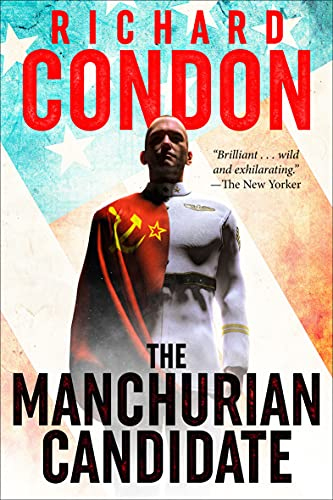 Richard Condon - The Manchurian Candidate (1959)
"It took some time to adjust to Condon’s prose; it is, as Louis Menand wrote in a 2003 New Yorker appraisal,
a deeply strange book with wildly shifting tones, odd word choices, and often baffling metaphors (some of that
may have been by design; one blogger found that Condon appeared to have cribbed certain phrases from Robert
Graves’s I, Claudius). The Times, in its initial review, called it “a wild, vigorous, curiously readable
melange.” But the further I got into it, the more I began to think that Condon, in his messy way, had tapped
into something bigger."
~ Michael Weinreb - Vulture.com and
Amazon.com
Richard Condon - The Manchurian Candidate (1959)
"It took some time to adjust to Condon’s prose; it is, as Louis Menand wrote in a 2003 New Yorker appraisal,
a deeply strange book with wildly shifting tones, odd word choices, and often baffling metaphors (some of that
may have been by design; one blogger found that Condon appeared to have cribbed certain phrases from Robert
Graves’s I, Claudius). The Times, in its initial review, called it “a wild, vigorous, curiously readable
melange.” But the further I got into it, the more I began to think that Condon, in his messy way, had tapped
into something bigger."
~ Michael Weinreb - Vulture.com and
Amazon.com
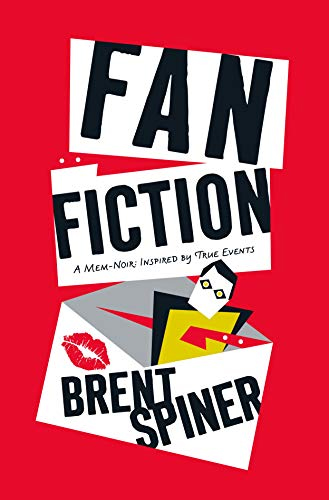 Brent Spiner – Fan Fiction (2021)
"Brent Spiner, known to fans as Data on Star Trek: The Next Generation (and in four movies, and on season 1 of Star Trek: Picard), has written a novel that blends fact, fiction, and a fun detective story into a story that is, whether you’re there for the Trekkish moments or the whodunit, a page-turner.
Fiction and memoir crisscross throughout, and it’s up to the reader to keep guessing which is which or to just sit back and enjoy the ride. "
~ TrekMovie.com and
Amazon.com
Brent Spiner – Fan Fiction (2021)
"Brent Spiner, known to fans as Data on Star Trek: The Next Generation (and in four movies, and on season 1 of Star Trek: Picard), has written a novel that blends fact, fiction, and a fun detective story into a story that is, whether you’re there for the Trekkish moments or the whodunit, a page-turner.
Fiction and memoir crisscross throughout, and it’s up to the reader to keep guessing which is which or to just sit back and enjoy the ride. "
~ TrekMovie.com and
Amazon.com
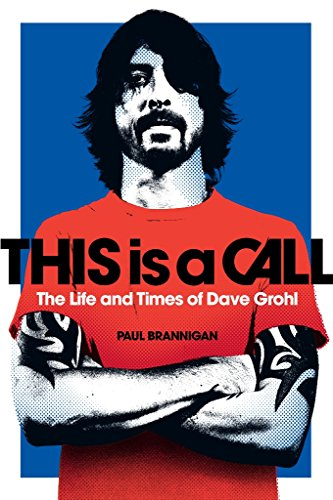 Paul Brannigan - This Is A Call (2021)
"Among musicians, drummers are a breed apart. On the one hand, the drummer is the timekeeper, the
one who counts off the song and keeps the other band members on the beat. On the other, the drummer sits
behind everyone else and usually doesn’t write songs or sing them, so often he’s 'only the drummer.'
Actually, Dave Grohl was in the habit of smiling and saying, “I’m only the drummer,” as a way of sidestepping
conversations about the financial affairs of his most famous band, Nirvana. By all accounts, though, he’s one
of the best in the business; if you look up Grohl on YouTube, you get a sense of just how good a musician he
is. He’s also, according to Paul Brannigan, the Nicest Man in Rock."
David Kirby - New York Times and
Amazon Books
Paul Brannigan - This Is A Call (2021)
"Among musicians, drummers are a breed apart. On the one hand, the drummer is the timekeeper, the
one who counts off the song and keeps the other band members on the beat. On the other, the drummer sits
behind everyone else and usually doesn’t write songs or sing them, so often he’s 'only the drummer.'
Actually, Dave Grohl was in the habit of smiling and saying, “I’m only the drummer,” as a way of sidestepping
conversations about the financial affairs of his most famous band, Nirvana. By all accounts, though, he’s one
of the best in the business; if you look up Grohl on YouTube, you get a sense of just how good a musician he
is. He’s also, according to Paul Brannigan, the Nicest Man in Rock."
David Kirby - New York Times and
Amazon Books
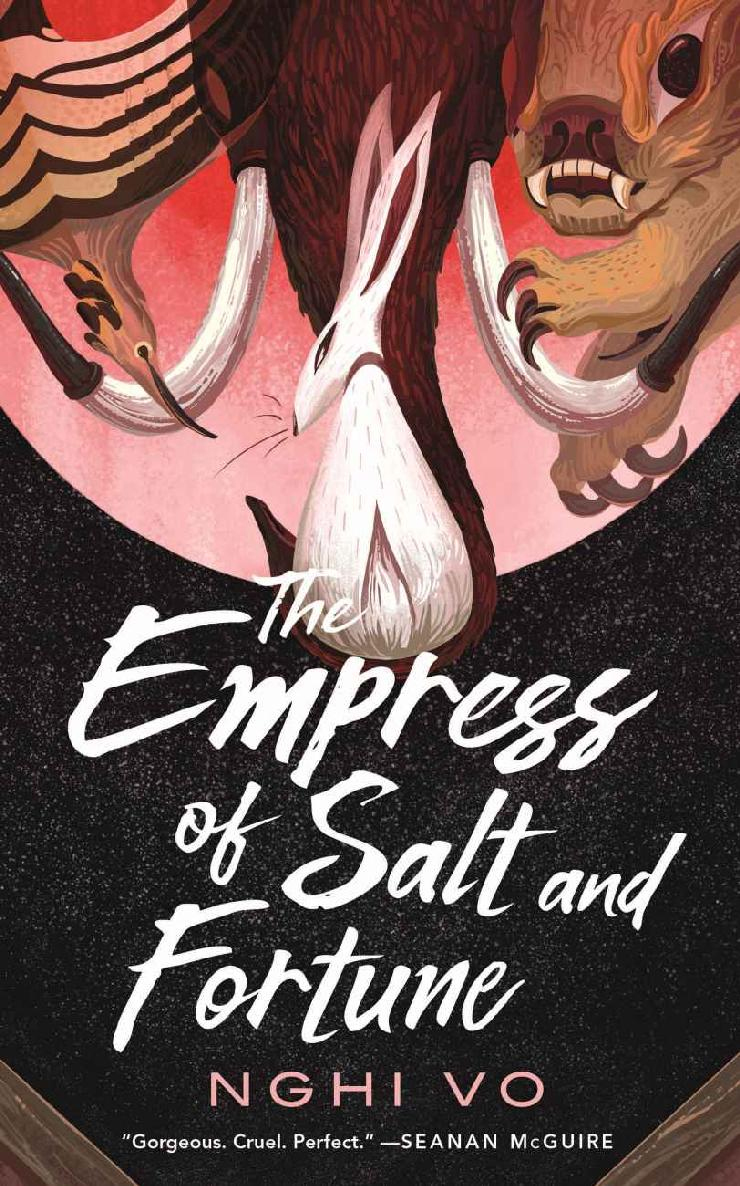 Nghi Vo – The Empress of Salt and Fortune (2020)
"This book is not a happy ending book. This is a salt and fortune book: dangerous, subtle, unexpected
and familiar, angry and ferocious and hopeful. Here, the truth is delicately, tenderly fished out of darkness.
Ugliness is couched in exquisite poetry and the ordinary is finely-drawn; any object, however plain in purpose
or silly in function, might be a relic of endurance and a witness to greatness. Nghi Vo's story of women and
intrigue at the end of one empire and beginning of another reveals in flashes that what you think you see isn't
all there is to see. It asks — and answers — the question: What is important? Who is important? Here, the old
aphorism "all that glitters is not gold" is particularly apt. "
~ Jessica P. Wick - NPR and
Amazon.com
Nghi Vo – The Empress of Salt and Fortune (2020)
"This book is not a happy ending book. This is a salt and fortune book: dangerous, subtle, unexpected
and familiar, angry and ferocious and hopeful. Here, the truth is delicately, tenderly fished out of darkness.
Ugliness is couched in exquisite poetry and the ordinary is finely-drawn; any object, however plain in purpose
or silly in function, might be a relic of endurance and a witness to greatness. Nghi Vo's story of women and
intrigue at the end of one empire and beginning of another reveals in flashes that what you think you see isn't
all there is to see. It asks — and answers — the question: What is important? Who is important? Here, the old
aphorism "all that glitters is not gold" is particularly apt. "
~ Jessica P. Wick - NPR and
Amazon.com
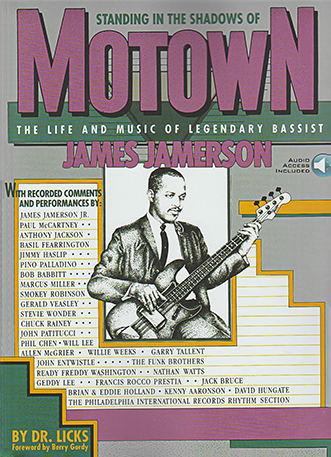 Dr Licks - Standing In The Shadow of Motown (1989)
"(Guitar Book). Bassist James Jamerson was the embodiment of the Motown spirit and
groove the invisible entity whose playing inspired thousands. His tumultuous life and
musical brilliance are explored in depth through hundreds of interviews, 49 transcribed
musical scores, two hours of recorded all-star performances, and more than 50 rarely seen
photos in this stellar tribute to behind-the-scenes Motown. Features access to 120-minutes
of audio! Allan Slutsky's 2002 documentary of the same name is the winner of the New York
Film Critics "Best Documentary of the Year" award! "
~ Amazon Promo and
Amazon Prime Video
Dr Licks - Standing In The Shadow of Motown (1989)
"(Guitar Book). Bassist James Jamerson was the embodiment of the Motown spirit and
groove the invisible entity whose playing inspired thousands. His tumultuous life and
musical brilliance are explored in depth through hundreds of interviews, 49 transcribed
musical scores, two hours of recorded all-star performances, and more than 50 rarely seen
photos in this stellar tribute to behind-the-scenes Motown. Features access to 120-minutes
of audio! Allan Slutsky's 2002 documentary of the same name is the winner of the New York
Film Critics "Best Documentary of the Year" award! "
~ Amazon Promo and
Amazon Prime Video
.jpg) Thomas Paine – The American Crisis (1776-1783ThomasPaine-1776-1783)
"The American Crisis was a series of pamphlets published from 1776 to 1783 during the
American Revolution by eighteenth century Enlightenment philosopher and author Thomas Paine.
The first volume begins with the famous words "These are the times that try men's souls".
There were sixteen pamphlets in total together often known as "The American Crisis" or simply
"The Crisis". Thirteen numbered pamphlets were published between 1776-1777 with three additional
pamphlets released between 1777-1783. The writings were contemporaneous with the early parts of
the American Revolution, during the times that colonists needed inspiring. They were written in a
language the common man could manage and are indicative of Paine's liberal philosophies. Paine
signed them with one of his many pseudonyms "Common Sense". The writings bolstered the morale of
the American colonists, appealed to the English people's consideration of the war with America,
clarified the issues at stake in the war and denounced the advocates of a negotiated peace. "
~ Wikipedia and
Amazon.com
Thomas Paine – The American Crisis (1776-1783ThomasPaine-1776-1783)
"The American Crisis was a series of pamphlets published from 1776 to 1783 during the
American Revolution by eighteenth century Enlightenment philosopher and author Thomas Paine.
The first volume begins with the famous words "These are the times that try men's souls".
There were sixteen pamphlets in total together often known as "The American Crisis" or simply
"The Crisis". Thirteen numbered pamphlets were published between 1776-1777 with three additional
pamphlets released between 1777-1783. The writings were contemporaneous with the early parts of
the American Revolution, during the times that colonists needed inspiring. They were written in a
language the common man could manage and are indicative of Paine's liberal philosophies. Paine
signed them with one of his many pseudonyms "Common Sense". The writings bolstered the morale of
the American colonists, appealed to the English people's consideration of the war with America,
clarified the issues at stake in the war and denounced the advocates of a negotiated peace. "
~ Wikipedia and
Amazon.com
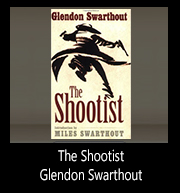 Glendon Swarthout - The Shootist (1975)
"It's 1901 and an end of an era. With the dawn of the new century, we meet a lone man who has outlived his time.
And as his days grow shorter, we witness that they run in parallel with the dying of the Old West. Receiving only resentment and
greed from others, he bravely decides his own fate and punches a statement onto his own legacy and for the West of the past.
Reading "The Shootist" you quickly realize you have a great book in your hands. Famed and labeled as a "gun man,"
a"man-killer," an "assassin," or a"shootist," 51 year-old John Bernard Books rides into El Paso to get a second option from
the town doctor. Unfortunately the news is the same, he has an advanced case of prostate cancer and can expect an excruciating death in a few weeks."
Vintage Hardboiled Reads and
<Amazon Books
Glendon Swarthout - The Shootist (1975)
"It's 1901 and an end of an era. With the dawn of the new century, we meet a lone man who has outlived his time.
And as his days grow shorter, we witness that they run in parallel with the dying of the Old West. Receiving only resentment and
greed from others, he bravely decides his own fate and punches a statement onto his own legacy and for the West of the past.
Reading "The Shootist" you quickly realize you have a great book in your hands. Famed and labeled as a "gun man,"
a"man-killer," an "assassin," or a"shootist," 51 year-old John Bernard Books rides into El Paso to get a second option from
the town doctor. Unfortunately the news is the same, he has an advanced case of prostate cancer and can expect an excruciating death in a few weeks."
Vintage Hardboiled Reads and
<Amazon Books
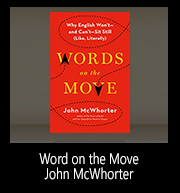 John Mcwhorter – Words on the Move (2016)
"A brisk look at how and why words change. In his 17th book investigating the variety, history, and idiosyncrasy of language, McWhorter (English and Comparative Literature/Columbia Univ.; The Language Hoax: Why the World Looks the Same in Any Language, 2014, etc.) enthusiastically makes the case that language is fluid. “It’s always a safe bet that a word will not be tomorrow what it is today,” he writes. Language is “something becoming rather than being” and “ever in flux; the changing is all there is.” To support this idea, repeated throughout the book, McWhorter offers myriad, and often fascinating, word histories. The word “silly,” for example, evolved from meaning “blessed” to “innocent” to “weak.” Some words narrow or broaden their meanings: “apple” once referred to all fruit, and what we call “meat” used to be “flesh.” The author devotes much discussion to “literally,” which originally meant “by the letter” but has gained “purely figurative usage” to mean something closer to “actually.” "
~ Wikipedia and
Amazon.com
John Mcwhorter – Words on the Move (2016)
"A brisk look at how and why words change. In his 17th book investigating the variety, history, and idiosyncrasy of language, McWhorter (English and Comparative Literature/Columbia Univ.; The Language Hoax: Why the World Looks the Same in Any Language, 2014, etc.) enthusiastically makes the case that language is fluid. “It’s always a safe bet that a word will not be tomorrow what it is today,” he writes. Language is “something becoming rather than being” and “ever in flux; the changing is all there is.” To support this idea, repeated throughout the book, McWhorter offers myriad, and often fascinating, word histories. The word “silly,” for example, evolved from meaning “blessed” to “innocent” to “weak.” Some words narrow or broaden their meanings: “apple” once referred to all fruit, and what we call “meat” used to be “flesh.” The author devotes much discussion to “literally,” which originally meant “by the letter” but has gained “purely figurative usage” to mean something closer to “actually.” "
~ Wikipedia and
Amazon.com
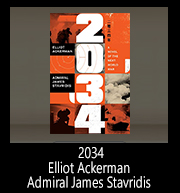 Elliot Ackerman and James Stavridis – '2034,' (2021)
"This crisply written and well-paced book reads like an all-caps warning for a world shackled to the machines we carry in our pockets and place on our laps, while only vaguely understanding how the information stored in and shared by those devices can be exploited... In “2034,” it’s as if Ackerman and Stavridis want to grab us by our lapels, give us a slap or two, and scream: Pay attention! George Orwell’s dystopian masterpiece, “Nineteen Eighty-four: A Novel” was published 35 years before 1984. Ackerman’s and Stavridis’s book takes place in the not-so-distant future when today’s high school military recruits will just be turning 30."
~ WashingtonPost.com and
Amazon Books
Elliot Ackerman and James Stavridis – '2034,' (2021)
"This crisply written and well-paced book reads like an all-caps warning for a world shackled to the machines we carry in our pockets and place on our laps, while only vaguely understanding how the information stored in and shared by those devices can be exploited... In “2034,” it’s as if Ackerman and Stavridis want to grab us by our lapels, give us a slap or two, and scream: Pay attention! George Orwell’s dystopian masterpiece, “Nineteen Eighty-four: A Novel” was published 35 years before 1984. Ackerman’s and Stavridis’s book takes place in the not-so-distant future when today’s high school military recruits will just be turning 30."
~ WashingtonPost.com and
Amazon Books
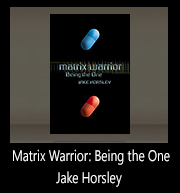 Jake Horsley – The Matrix Warrior (2003)
"In the Matrix movies, "reality" is just a dreamscape, a representation that six billion points of view agree to agree is "real." So if the only reality we know is a cunning and elaborate façade, what then does that signify for us? Matrix Warrior gives us the means to understand this premise and its implications on our knowledge of self and place. Combining an in-depth examination of the film with philosophical inquiry and the teachings of Castandeda, Jake Horsley has produced in Matrix Warrior a profound yet witty analysis-and all readers need to get "unplugged.""
~ SF Library and
Amazon Books
Jake Horsley – The Matrix Warrior (2003)
"In the Matrix movies, "reality" is just a dreamscape, a representation that six billion points of view agree to agree is "real." So if the only reality we know is a cunning and elaborate façade, what then does that signify for us? Matrix Warrior gives us the means to understand this premise and its implications on our knowledge of self and place. Combining an in-depth examination of the film with philosophical inquiry and the teachings of Castandeda, Jake Horsley has produced in Matrix Warrior a profound yet witty analysis-and all readers need to get "unplugged.""
~ SF Library and
Amazon Books
 Meagan Spooner – Sherwood (2019)
"Marian puts on Robin’s green cloak, having snuck into his old room to feel close to him one last time, and is wearing it when she sets out to find and save Will before the Sheriff’s men do. Being tall, strong, and a powerful rider–not to mention a better archer than Robin ever was–she is mistaken for a man. Not just any man–but Robin himself, back from the grave. Marian allows her legend to grow. Rob from the rich, give to the poor–and above all, never, ever let anyone guess the truth of her identity. Not even the new friends and allies–John, Alain, Will–because who would ever follow her? "
~ thebooksmugglers.com and
Amazon Books
Meagan Spooner – Sherwood (2019)
"Marian puts on Robin’s green cloak, having snuck into his old room to feel close to him one last time, and is wearing it when she sets out to find and save Will before the Sheriff’s men do. Being tall, strong, and a powerful rider–not to mention a better archer than Robin ever was–she is mistaken for a man. Not just any man–but Robin himself, back from the grave. Marian allows her legend to grow. Rob from the rich, give to the poor–and above all, never, ever let anyone guess the truth of her identity. Not even the new friends and allies–John, Alain, Will–because who would ever follow her? "
~ thebooksmugglers.com and
Amazon Books
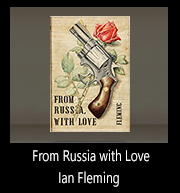 Ian Fleming – From Russia with Love (1956)
"It is perhaps not surprising that in 1956, when Fleming wrote the book, he could imagine only two roles for
women in the intelligence services: torturer or seductress. But it is a testament to his abiding influence that even
in the '90s, his was still the popular image. The idea that women like me might be leading investigations, running
sources or even running entire intelligence services was unimaginable. But this book isn't about reality. With its
exotic scenes in Istanbul, its struggle to the death with a psychopathic killer on the Orient Express, it is sheer escapism.
And reading it again, even now, when I know so much more about how things really are, I'm with JFK in thinking this
is one of the best of the Bond books."
~ My Guilty Pleasure - NPR and
Amazon Books
Ian Fleming – From Russia with Love (1956)
"It is perhaps not surprising that in 1956, when Fleming wrote the book, he could imagine only two roles for
women in the intelligence services: torturer or seductress. But it is a testament to his abiding influence that even
in the '90s, his was still the popular image. The idea that women like me might be leading investigations, running
sources or even running entire intelligence services was unimaginable. But this book isn't about reality. With its
exotic scenes in Istanbul, its struggle to the death with a psychopathic killer on the Orient Express, it is sheer escapism.
And reading it again, even now, when I know so much more about how things really are, I'm with JFK in thinking this
is one of the best of the Bond books."
~ My Guilty Pleasure - NPR and
Amazon Books
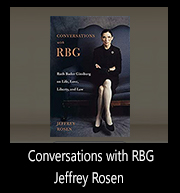 Jeffrey Rosen - Conversations with RBG (2019)
"It’s not for nothing that Ginsburg and her favorite Q&A partners (of whom Rosen is second only to NPR’s Nina Totenberg) sell
out law school auditoriums, amphitheaters, even Little Rock’s Verizon basketball arena. But readers who come for RBG’s Greatest
Hits will end up getting something richer: At its best, “Conversations” makes you feel like a student in the world’s coolest law school
seminar, with Ginsburg and Rosen deftly leading you through constitutional clauses and case law to elucidate how the court works
and why it matters."
~ bddailynews.com and
Amazon Books
Jeffrey Rosen - Conversations with RBG (2019)
"It’s not for nothing that Ginsburg and her favorite Q&A partners (of whom Rosen is second only to NPR’s Nina Totenberg) sell
out law school auditoriums, amphitheaters, even Little Rock’s Verizon basketball arena. But readers who come for RBG’s Greatest
Hits will end up getting something richer: At its best, “Conversations” makes you feel like a student in the world’s coolest law school
seminar, with Ginsburg and Rosen deftly leading you through constitutional clauses and case law to elucidate how the court works
and why it matters."
~ bddailynews.com and
Amazon Books
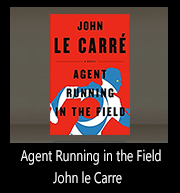 Agent Running in the Field (2019)
"At 288 pages, Agent Running in the Field is a miniature compared with le Carré’s great cold war novels, and it lacks the
ruthless clockwork precision of, say, The Spy Who Came in from the Cold. But it is a very classy entertainment about political ideals
and deception. There is a terrific scene set in a park, in particular, in which we gradually realise that all the bystanders are part of a
huge team of “watchers” marshalled by the spies to observe a secret conversation. The author leaves the reader to draw the
disturbing inference that this – in the age of ambient corporate and state surveillance by ubiquitous technology – is simply the way we all live now. "
~ The Guardian and
Amazon Books
Agent Running in the Field (2019)
"At 288 pages, Agent Running in the Field is a miniature compared with le Carré’s great cold war novels, and it lacks the
ruthless clockwork precision of, say, The Spy Who Came in from the Cold. But it is a very classy entertainment about political ideals
and deception. There is a terrific scene set in a park, in particular, in which we gradually realise that all the bystanders are part of a
huge team of “watchers” marshalled by the spies to observe a secret conversation. The author leaves the reader to draw the
disturbing inference that this – in the age of ambient corporate and state surveillance by ubiquitous technology – is simply the way we all live now. "
~ The Guardian and
Amazon Books
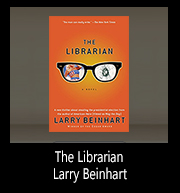 Larry Beinhart – The Librarian (2004)
"The key figure, and virtually the only innocent, in the game of hardball politics is David Goldberg, a college librarian
who gets eased into a second job cataloguing the papers of billionaire developer Alan Carston Stowe and then suddenly
learns that Col. Jack Morgan, of Homeland Security, is sending four underlings to kill him because he’s found out a dread
secret. The good news is that David’s alerted to the plot by Morgan’s sexy wife Niobe, somebody he’s already paying
special attention to. The bad news is that he doesn’t know what he’s supposed to know and has no obvious way to find
out in the five days before the forthcoming election ends the historic contest between hard-riding figurehead Augustus
Winfield Scott and his come-from-nowhere Democratic challenger, Sen. Anne Lynn Murphy. Both candidates field organizations
bent on decimating the opposition, but Scott’s America-first minions, David gradually realizes, have in reserve “one-one-three,”
a knockout punch as diabolical as it is legal. The man-on-the-run plot is proficient persiflage; the bonus here is another dose of
anti-Administration satire from the author of American Hero (1993), filmed with its target changed from Bush 41 to Clinton as Wag the Dog. "
~ Kirkus Reviews and
Amazon Books
Larry Beinhart – The Librarian (2004)
"The key figure, and virtually the only innocent, in the game of hardball politics is David Goldberg, a college librarian
who gets eased into a second job cataloguing the papers of billionaire developer Alan Carston Stowe and then suddenly
learns that Col. Jack Morgan, of Homeland Security, is sending four underlings to kill him because he’s found out a dread
secret. The good news is that David’s alerted to the plot by Morgan’s sexy wife Niobe, somebody he’s already paying
special attention to. The bad news is that he doesn’t know what he’s supposed to know and has no obvious way to find
out in the five days before the forthcoming election ends the historic contest between hard-riding figurehead Augustus
Winfield Scott and his come-from-nowhere Democratic challenger, Sen. Anne Lynn Murphy. Both candidates field organizations
bent on decimating the opposition, but Scott’s America-first minions, David gradually realizes, have in reserve “one-one-three,”
a knockout punch as diabolical as it is legal. The man-on-the-run plot is proficient persiflage; the bonus here is another dose of
anti-Administration satire from the author of American Hero (1993), filmed with its target changed from Bush 41 to Clinton as Wag the Dog. "
~ Kirkus Reviews and
Amazon Books
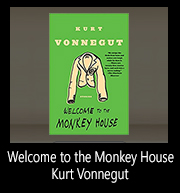 Kurt Vonnegut – Welcome to the Monkey House (1968)
"Drawn from both specialized science fiction magazines and the big-circulation general magazines which Vonnegut had
been one of the few science writers to sell, the collection includes some of his most accomplished work from 1950 to 1968. The
title story may be his most famous—a diabolical government asserts control through compulsory technology removing orgasm
from sex—but Vonnegut’s bitterness and wit, not in his earlier work as poisonous or unshielded as it later became, is well demonstrated. "
~ nopagegetsleftbehind.wordpress.com and
Amazon Books
Kurt Vonnegut – Welcome to the Monkey House (1968)
"Drawn from both specialized science fiction magazines and the big-circulation general magazines which Vonnegut had
been one of the few science writers to sell, the collection includes some of his most accomplished work from 1950 to 1968. The
title story may be his most famous—a diabolical government asserts control through compulsory technology removing orgasm
from sex—but Vonnegut’s bitterness and wit, not in his earlier work as poisonous or unshielded as it later became, is well demonstrated. "
~ nopagegetsleftbehind.wordpress.com and
Amazon Books
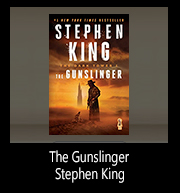 Stephen King - The Gunslinger (1982)
"The Gunslinger is a quiet, meditative novel; as inauspicious a way to start a sprawling epic fantasy series as I've ever
encountered. In Roland Deschain, the titular Gunslinger, there's a superb, violent, powerful and thoughtful protagonist –
Clint Eastwood's Man With No Name by way of Robert Browning's poem, Childe Rolande to the Dark Tower Came. He's
cold and dark, and we see him wander through dusty western towns, shooting and fucking his way towards his nemesis,
The Man in Black. This is Randall Flagg, whom you might remember from The Stand (though he is never called by that name here).
He's a Very Bad Man. It transpires that he's been a part of Roland's life, in various guises, since the Gunslinger was a child, and that's
he's responsible for some horrible things. Roland has to find him, catch him and kill him. That's what a Gunslinger does."
~ The Guardian and
Amazon Books
Stephen King - The Gunslinger (1982)
"The Gunslinger is a quiet, meditative novel; as inauspicious a way to start a sprawling epic fantasy series as I've ever
encountered. In Roland Deschain, the titular Gunslinger, there's a superb, violent, powerful and thoughtful protagonist –
Clint Eastwood's Man With No Name by way of Robert Browning's poem, Childe Rolande to the Dark Tower Came. He's
cold and dark, and we see him wander through dusty western towns, shooting and fucking his way towards his nemesis,
The Man in Black. This is Randall Flagg, whom you might remember from The Stand (though he is never called by that name here).
He's a Very Bad Man. It transpires that he's been a part of Roland's life, in various guises, since the Gunslinger was a child, and that's
he's responsible for some horrible things. Roland has to find him, catch him and kill him. That's what a Gunslinger does."
~ The Guardian and
Amazon Books
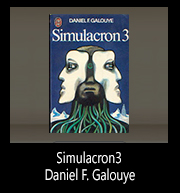 Daniel F. Galouye – Simulacron 3 (1964)
"Simulacron 3 is the story of a virtual city (total environment simulator) for marketing research, developed by a scientist to
reduce the need for opinion polls. The computer-generated city simulation is so well-programmed, that, although the inhabitants
have their own consciousness, they are unaware, except for one, that they are only electronic impulses in a computer. The
simulator's lead scientist, Hannon Fuller, dies mysteriously, and a co-worker, Morton Lynch, vanishes. The protagonist, Douglas
Hall, is with Lynch when he vanishes, and Hall subsequently struggles to suppress his inchoate madness. As time and events
unwind, he progressively grasps that his own world is probably not "real" and might be only a computer-generated simulation. "
~ Wikipedia and
Amazon Books
Daniel F. Galouye – Simulacron 3 (1964)
"Simulacron 3 is the story of a virtual city (total environment simulator) for marketing research, developed by a scientist to
reduce the need for opinion polls. The computer-generated city simulation is so well-programmed, that, although the inhabitants
have their own consciousness, they are unaware, except for one, that they are only electronic impulses in a computer. The
simulator's lead scientist, Hannon Fuller, dies mysteriously, and a co-worker, Morton Lynch, vanishes. The protagonist, Douglas
Hall, is with Lynch when he vanishes, and Hall subsequently struggles to suppress his inchoate madness. As time and events
unwind, he progressively grasps that his own world is probably not "real" and might be only a computer-generated simulation. "
~ Wikipedia and
Amazon Books
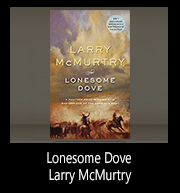 Larry McMurtry – Lonesome Dove (1986)
"A love story, an adventure, an American epic, Lonesome Dove embraces all the West legend and fact,
heroes and outlaws, whores and ladies, Indians and settlers in a novel that recreates the central American experience,
the most enduring of our national myths. Set in the late nineteenth century, Lonesome Dove is the story of a cattle drive
from Texas to Montana and much more. It is a drive that represents for everybody involved not only a daring, even a
foolhardy, adventure, but a part of the American Dream the attempt to carve out of the last remaining wilderness a new life."
~ Prize Winning Fiction and
Amazon Books
Larry McMurtry – Lonesome Dove (1986)
"A love story, an adventure, an American epic, Lonesome Dove embraces all the West legend and fact,
heroes and outlaws, whores and ladies, Indians and settlers in a novel that recreates the central American experience,
the most enduring of our national myths. Set in the late nineteenth century, Lonesome Dove is the story of a cattle drive
from Texas to Montana and much more. It is a drive that represents for everybody involved not only a daring, even a
foolhardy, adventure, but a part of the American Dream the attempt to carve out of the last remaining wilderness a new life."
~ Prize Winning Fiction and
Amazon Books
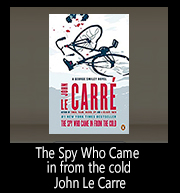 John Le Carre - The Spy Who Came in from the Cold (1963)
"The Spy is the story, to put it very simply, of a complicated act of deadly triple-bluff perpetrated by the British Secret
Service against its enemies in the German Democratic Republic, as communist East Germany was then known. At its centre is
Alec Leamas, sent, he believes, on a clever under-cover mission of revenge but in fact the unwitting tool of even cleverer British
brains with other motives. So much so relatively straightforward, but one of the sheer pleasures of the grade one espionage
novel is in unravelling its multifarious complexities and Le Carré handles the unspooling web of narrative and motive with exemplary poise."
~ William Boyd - theguardian.com and
Amazon Books
John Le Carre - The Spy Who Came in from the Cold (1963)
"The Spy is the story, to put it very simply, of a complicated act of deadly triple-bluff perpetrated by the British Secret
Service against its enemies in the German Democratic Republic, as communist East Germany was then known. At its centre is
Alec Leamas, sent, he believes, on a clever under-cover mission of revenge but in fact the unwitting tool of even cleverer British
brains with other motives. So much so relatively straightforward, but one of the sheer pleasures of the grade one espionage
novel is in unravelling its multifarious complexities and Le Carré handles the unspooling web of narrative and motive with exemplary poise."
~ William Boyd - theguardian.com and
Amazon Books
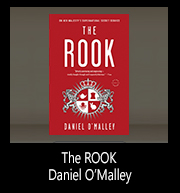 Daniel O'Malley – The ROOK (2012)
"Daniel O'Malley's contribution to the growing field of high-octane paranormal spy thrillers is filled with smart flourishes.
The Checquy is a centuries-old institution, with a command structure modeled after chess pieces, and clever bits of its history
occasionally pop up in the background. (There's a reference to at least one British horror classic; a more astute reader might
be able to find others.) As Myfanwy regains her footing, she realizes that her previous self was shy and unassertive, but she
decides to take a much more aggressive approach as she resumes the hunt for the traitor (or traitors) within the organization.
Good thing, too: on her first day back at the office, she supervises an interrogation that reveals the return of the Grafters,
a secret society of Belgian genetic engineers who first tried to invade England back in 1677."
~ Ron Hogan - Shelf-awareness.com and
Amazon Books
Daniel O'Malley – The ROOK (2012)
"Daniel O'Malley's contribution to the growing field of high-octane paranormal spy thrillers is filled with smart flourishes.
The Checquy is a centuries-old institution, with a command structure modeled after chess pieces, and clever bits of its history
occasionally pop up in the background. (There's a reference to at least one British horror classic; a more astute reader might
be able to find others.) As Myfanwy regains her footing, she realizes that her previous self was shy and unassertive, but she
decides to take a much more aggressive approach as she resumes the hunt for the traitor (or traitors) within the organization.
Good thing, too: on her first day back at the office, she supervises an interrogation that reveals the return of the Grafters,
a secret society of Belgian genetic engineers who first tried to invade England back in 1677."
~ Ron Hogan - Shelf-awareness.com and
Amazon Books
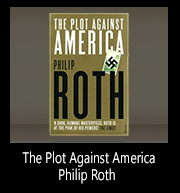 Philip Roth - The Plot Against America (2004)
"It is an alternative history in which Franklin D. Roosevelt is defeated in the presidential election of 1940
by Charles Lindbergh. The novel follows the fortunes of the Roth family during the Lindbergh presidency, as antisemitism
becomes more accepted in American life and Jewish-American families like the Roths are persecuted on various levels.
The narrator and central character in the novel is the young Philip, and the care with which his confusion and terror
are rendered makes the novel as much about the mysteries of growing up as about American politics. "
~ Wikipedia.org and
Amazon Books
Philip Roth - The Plot Against America (2004)
"It is an alternative history in which Franklin D. Roosevelt is defeated in the presidential election of 1940
by Charles Lindbergh. The novel follows the fortunes of the Roth family during the Lindbergh presidency, as antisemitism
becomes more accepted in American life and Jewish-American families like the Roths are persecuted on various levels.
The narrator and central character in the novel is the young Philip, and the care with which his confusion and terror
are rendered makes the novel as much about the mysteries of growing up as about American politics. "
~ Wikipedia.org and
Amazon Books
.jpg) Joab Stieglitz – The Old Man's Request (2018)
"The Old Man's Request is an occult mystery and work of horror. In a summoning gone awry, five men
brought forth a creature from a parallel dimension occupied by ancient beings. During the ritual,
the circle was broken and one was killed and the creature was released into the realm of men and it has
continued to kill.
The last living member of the group that botched the summoning, planned and assemble a team of gifted
individuals to tackle the job of sending the creature back to its own plane of existence. Russian
anthropologist Anna Rykov, Doctor Harry Lamb, and Father Sean O'Malley take on the dying man's request."
~ DC Bebop review and
Amazon Books
Joab Stieglitz – The Old Man's Request (2018)
"The Old Man's Request is an occult mystery and work of horror. In a summoning gone awry, five men
brought forth a creature from a parallel dimension occupied by ancient beings. During the ritual,
the circle was broken and one was killed and the creature was released into the realm of men and it has
continued to kill.
The last living member of the group that botched the summoning, planned and assemble a team of gifted
individuals to tackle the job of sending the creature back to its own plane of existence. Russian
anthropologist Anna Rykov, Doctor Harry Lamb, and Father Sean O'Malley take on the dying man's request."
~ DC Bebop review and
Amazon Books
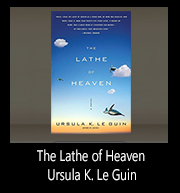 Ursula K. Le Guin – The Lathe of Heaven (1971)
"The Lathe of Heaven is one of those books for which the term mind-bending was invented. Ursula K.
Le Guin’s 1971 novel about a man whose dreams can alter the very nature of reality is a masterful
examination of the mind’s ability to shape our perception of the world around us and our powerful
need to change that to fit our desires. While it shares thematic similarities to a lot of Philip K. Dick’s
work in its discussion of alternate realities and the untrustworthy nature of our perceptions, Le Guin
makes it uniquely her own by imagining how an effort to manipulate reality (even with the best of
intentions) can have disastrous consequences. At turns contemplative, moody, exhilarating and terrifying,
The Lathe of Heaven is one of my favorite science fiction novels of all time and an absolute must-read."
~ Andrew Kaufman - top-science-fiction-novels.com and
Amazon Books
Ursula K. Le Guin – The Lathe of Heaven (1971)
"The Lathe of Heaven is one of those books for which the term mind-bending was invented. Ursula K.
Le Guin’s 1971 novel about a man whose dreams can alter the very nature of reality is a masterful
examination of the mind’s ability to shape our perception of the world around us and our powerful
need to change that to fit our desires. While it shares thematic similarities to a lot of Philip K. Dick’s
work in its discussion of alternate realities and the untrustworthy nature of our perceptions, Le Guin
makes it uniquely her own by imagining how an effort to manipulate reality (even with the best of
intentions) can have disastrous consequences. At turns contemplative, moody, exhilarating and terrifying,
The Lathe of Heaven is one of my favorite science fiction novels of all time and an absolute must-read."
~ Andrew Kaufman - top-science-fiction-novels.com and
Amazon Books
 Mario Vargas Llosa - Who Killed Palomino Molero? (1998)
" In Peru during the 50's, a young Air Force cadet is found murdered and mutilated. The half-breed cadet,
Palomino Molero, was draft-exempt yet joined the military anyway. Why? For love, it seems--love for the colonel's
daughter, a love that for a number of reasons (race, class rank) cannot be. But is it reason for slaughter? It falls to two
absolutely hapless hick Civil Guards--Officer Lituma (the narrator) and Lieutenant Silva--to investigate the case,
and it's on their wheels that the fun zooms. Silva is lust-crazy for a particular local (quite hefty) married woman, and
spends most of his time thinking, talking, and dreaming of her. Meanwhile, he "interrogates" various witnesses and
suspects in the cadet's murder, getting them to answer questions he never asks, to make connections he's too
sex-woozy to have formulated. Through it all, though, Lituma is convinced that Silva is another Sherlock Holmes. "
~ kirkusreviews.com and
Amazon Books
Mario Vargas Llosa - Who Killed Palomino Molero? (1998)
" In Peru during the 50's, a young Air Force cadet is found murdered and mutilated. The half-breed cadet,
Palomino Molero, was draft-exempt yet joined the military anyway. Why? For love, it seems--love for the colonel's
daughter, a love that for a number of reasons (race, class rank) cannot be. But is it reason for slaughter? It falls to two
absolutely hapless hick Civil Guards--Officer Lituma (the narrator) and Lieutenant Silva--to investigate the case,
and it's on their wheels that the fun zooms. Silva is lust-crazy for a particular local (quite hefty) married woman, and
spends most of his time thinking, talking, and dreaming of her. Meanwhile, he "interrogates" various witnesses and
suspects in the cadet's murder, getting them to answer questions he never asks, to make connections he's too
sex-woozy to have formulated. Through it all, though, Lituma is convinced that Silva is another Sherlock Holmes. "
~ kirkusreviews.com and
Amazon Books
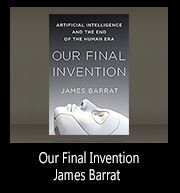 James Barret – Our Final Invention (2013)
"Computers already perform essential tasks in our national infrastructure and daily lives, including several beyond the capacity of the
smartest individual—e.g., playing chess or competing against humans on Jeopardy. While dazzling, these accomplishments are too specialized for
the artificial intelligence the author and the many philosophers, scientists and entrepreneurs he interviews have in mind. Within decades,
computers will operate at the speed of a human brain and become rational, allowing them to learn, rewrite their own programs to learn better,
solve problems better, make decisions and perhaps create more computers like themselves. Having reached this level, they have achieved artificial
general intelligence. Inevitably, working on their own without human input, they will exceed human intelligence by factors of 100 and eventually
thousands, achieving artificial superintelligence. "
~ KirkusReviews.org and
Amazon Books
James Barret – Our Final Invention (2013)
"Computers already perform essential tasks in our national infrastructure and daily lives, including several beyond the capacity of the
smartest individual—e.g., playing chess or competing against humans on Jeopardy. While dazzling, these accomplishments are too specialized for
the artificial intelligence the author and the many philosophers, scientists and entrepreneurs he interviews have in mind. Within decades,
computers will operate at the speed of a human brain and become rational, allowing them to learn, rewrite their own programs to learn better,
solve problems better, make decisions and perhaps create more computers like themselves. Having reached this level, they have achieved artificial
general intelligence. Inevitably, working on their own without human input, they will exceed human intelligence by factors of 100 and eventually
thousands, achieving artificial superintelligence. "
~ KirkusReviews.org and
Amazon Books
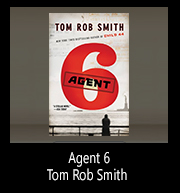 Tom Rob Smith - Agent 6 (2012)
" AGENT 6 is the final installment in the Child 44 trilogy, which features Soviet secret police agent Leo
Demidov. It is a wonderful conclusion to a series that is epic in scope. AGENT opens in 1951 in Moscow,
where the young agent Leo is assigned the prestigious duty of escorting a black American singer, Jesse
Austin, around Moscow. "
~ Goodreads and
Amazon Books
Tom Rob Smith - Agent 6 (2012)
" AGENT 6 is the final installment in the Child 44 trilogy, which features Soviet secret police agent Leo
Demidov. It is a wonderful conclusion to a series that is epic in scope. AGENT opens in 1951 in Moscow,
where the young agent Leo is assigned the prestigious duty of escorting a black American singer, Jesse
Austin, around Moscow. "
~ Goodreads and
Amazon Books
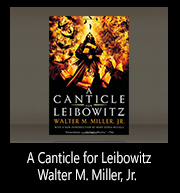 Walter M. Miller, Jr. - A Canticle for Leibowitz (1960)
"A Canticle for Leibowitz is a post-apocalyptic science fiction novel by American writer Walter M. Miller Jr.,
first published in 1960. Set in a Catholic monastery in the desert of the Southwestern United States after a devastating
nuclear war, the story spans thousands of years as civilization rebuilds itself. The monks of the fictional Albertian
Order of Leibowitz take up the mission of preserving the surviving remnants of man's scientific knowledge until the day
the outside world is again ready for it."
~ Wikipedia and
Amazon Books
Walter M. Miller, Jr. - A Canticle for Leibowitz (1960)
"A Canticle for Leibowitz is a post-apocalyptic science fiction novel by American writer Walter M. Miller Jr.,
first published in 1960. Set in a Catholic monastery in the desert of the Southwestern United States after a devastating
nuclear war, the story spans thousands of years as civilization rebuilds itself. The monks of the fictional Albertian
Order of Leibowitz take up the mission of preserving the surviving remnants of man's scientific knowledge until the day
the outside world is again ready for it."
~ Wikipedia and
Amazon Books
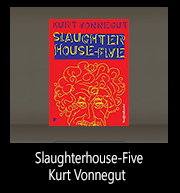 Kurt Vonnegut - Slaughterhouse-Five (1966)
"Kurt Vonnegut introduces his seventh novel, “Slaughterhouse-Five” (Delacorte), apologetically, calling it a failure.
Coming from most writers, an apology like that would be inadequate; a writer can always take a vow of permanent abstinence
from writing, and there is a shortage of cabdrivers. Mr. Vonnegut’s penitential gesture is objectionable because it implies
that he might have succeeded in solving a problem that he properly represents as insoluble. In 1945, a German prisoner of
war, he lived through the American and British bombing of Dresden, in which a hundred and thirty-five thousand people died—nearly
twice as many, he notes, as were killed by the atomic bombing of Hiroshima, whose devastation was at least officially honored by
a Presidential announcement. “Slaughterhouse-Five” is Vonnegut’s tribute to the strain imposed on his conscience by the fact that
he survived, and by his increasing awareness, since the war, of the scope and variety of death. The vibrant simplicity of the book
to which he finally surrendered his emotion makes his apology seem disingenuous, like Alexander the Great putting himself down for
not dedicating his life to untying the Gordian knot. Besides, any book that is touted as a “masterpiece,” “long-awaited,” and
“twenty years in the making” can’t be all bad if it turns out to be just a neat hundred and eighty-six pages long."
~ Susan Lardner - newyorker.com and
Amazon Books
Kurt Vonnegut - Slaughterhouse-Five (1966)
"Kurt Vonnegut introduces his seventh novel, “Slaughterhouse-Five” (Delacorte), apologetically, calling it a failure.
Coming from most writers, an apology like that would be inadequate; a writer can always take a vow of permanent abstinence
from writing, and there is a shortage of cabdrivers. Mr. Vonnegut’s penitential gesture is objectionable because it implies
that he might have succeeded in solving a problem that he properly represents as insoluble. In 1945, a German prisoner of
war, he lived through the American and British bombing of Dresden, in which a hundred and thirty-five thousand people died—nearly
twice as many, he notes, as were killed by the atomic bombing of Hiroshima, whose devastation was at least officially honored by
a Presidential announcement. “Slaughterhouse-Five” is Vonnegut’s tribute to the strain imposed on his conscience by the fact that
he survived, and by his increasing awareness, since the war, of the scope and variety of death. The vibrant simplicity of the book
to which he finally surrendered his emotion makes his apology seem disingenuous, like Alexander the Great putting himself down for
not dedicating his life to untying the Gordian knot. Besides, any book that is touted as a “masterpiece,” “long-awaited,” and
“twenty years in the making” can’t be all bad if it turns out to be just a neat hundred and eighty-six pages long."
~ Susan Lardner - newyorker.com and
Amazon Books
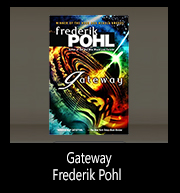 Frederik Pohl - Gateway (1976)
"Gateway is without a doubt one of the most entertaining and readable books on this list. It’s a page-turner in the best
sense of the word, with an ingenious set up, a relatable main character, a dash of humor and a sustained sense of tension and
suspense that keeps you on edge throughout. Add to that Pohl’s gift for clear, concise and engaging writing (something Science
Fiction is not always known for) and you have a highly satisfying read that is able to entertain while also displaying the wonder
and imagination that Science Fiction IS known for. Frederik Pohl represents a middle ground when it comes to Sci-Fi writers. He’s
not too “Hard,” not too “Soft,” and he has just the right combination of grand ideas and compelling story lines to make his work
instantly compelling – and Gateway is one of the best examples of his gifts as a storyteller. "
~ top-science-fiction-novels.com and
Amazon Books
Frederik Pohl - Gateway (1976)
"Gateway is without a doubt one of the most entertaining and readable books on this list. It’s a page-turner in the best
sense of the word, with an ingenious set up, a relatable main character, a dash of humor and a sustained sense of tension and
suspense that keeps you on edge throughout. Add to that Pohl’s gift for clear, concise and engaging writing (something Science
Fiction is not always known for) and you have a highly satisfying read that is able to entertain while also displaying the wonder
and imagination that Science Fiction IS known for. Frederik Pohl represents a middle ground when it comes to Sci-Fi writers. He’s
not too “Hard,” not too “Soft,” and he has just the right combination of grand ideas and compelling story lines to make his work
instantly compelling – and Gateway is one of the best examples of his gifts as a storyteller. "
~ top-science-fiction-novels.com and
Amazon Books
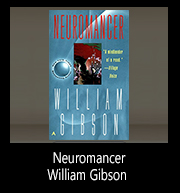 William Gibson – Neuromancer (1984)
"Neuromancer is not truly where it all began. Cyberpunk predates the publication of the novel by several years and was already
a growing phenomenon. The film Blade Runner, loosely based on a 1968 novel by Philip K. Dick, was released in 1982, establishing a
similar asethetic. But Neuromancer was the breakout hit. It won both the Hugo and the Nebula award (and the Philip K. Dick award, which
does not, contrary to Wikipedia, have the same cachet). Gibson coined the word "cyberpunk" earlier, but Neuromancer is the novel that
put it into the popular lexicon. "
~ Eyrie.org and
Amazon Books
William Gibson – Neuromancer (1984)
"Neuromancer is not truly where it all began. Cyberpunk predates the publication of the novel by several years and was already
a growing phenomenon. The film Blade Runner, loosely based on a 1968 novel by Philip K. Dick, was released in 1982, establishing a
similar asethetic. But Neuromancer was the breakout hit. It won both the Hugo and the Nebula award (and the Philip K. Dick award, which
does not, contrary to Wikipedia, have the same cachet). Gibson coined the word "cyberpunk" earlier, but Neuromancer is the novel that
put it into the popular lexicon. "
~ Eyrie.org and
Amazon Books
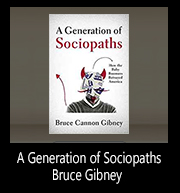 Bruce Gibney - A Generation of Sociopaths (2017)
"Millennials are killing everything from the American mediocre dining experience to Donald Trump’s chosen form of exercise.
Given this propensity for destroying everything America holds dear, one might be forgiven for assuming that any work offering a
collective psychological assessment of an entire generation would focus on the one that seemingly murders American institutions
with impunity. Generation X venture capitalist-turned-author Bruce Gibney turns the tables on this millennial blaming with his work, A
Generation of Sociopaths: How the Baby Boomers Betrayed America. Gibney offers an explanation for the disintegration of the
American economic and political system that rests on the backs of the generation that raised millennials: baby boomers. "
~ Eric Morgenson - ActivistHistory.com and
Amazon Books
Bruce Gibney - A Generation of Sociopaths (2017)
"Millennials are killing everything from the American mediocre dining experience to Donald Trump’s chosen form of exercise.
Given this propensity for destroying everything America holds dear, one might be forgiven for assuming that any work offering a
collective psychological assessment of an entire generation would focus on the one that seemingly murders American institutions
with impunity. Generation X venture capitalist-turned-author Bruce Gibney turns the tables on this millennial blaming with his work, A
Generation of Sociopaths: How the Baby Boomers Betrayed America. Gibney offers an explanation for the disintegration of the
American economic and political system that rests on the backs of the generation that raised millennials: baby boomers. "
~ Eric Morgenson - ActivistHistory.com and
Amazon Books
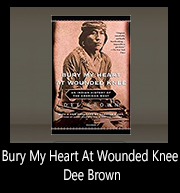 Dee Brown – Bury My Heart at Wounded Knee (1970)
"Surely revolutionary at the time that it was released, and even now, still an incredibly incisive look at
how white American politics, backstabbing, greed, and genocide decimated the American Indian population,
Bury My Heart at Wounded Knee: An Indian History of the American West is not a comfortable read. Wounded
Knee is relentless in its documentation of the betrayals and battles suffered by the United States’ indigenous
populations, from the Comanche to the Blackfeet to the Kiowa."
~ BookWanderer.com and
Amazon Books
Dee Brown – Bury My Heart at Wounded Knee (1970)
"Surely revolutionary at the time that it was released, and even now, still an incredibly incisive look at
how white American politics, backstabbing, greed, and genocide decimated the American Indian population,
Bury My Heart at Wounded Knee: An Indian History of the American West is not a comfortable read. Wounded
Knee is relentless in its documentation of the betrayals and battles suffered by the United States’ indigenous
populations, from the Comanche to the Blackfeet to the Kiowa."
~ BookWanderer.com and
Amazon Books
 David Fromkin - A Peace To End All Peace (1989)
"'A Peace to End All Peace'' is about the dissolution of the centuries-old Ottoman Empire at the close of
World War I and the consequences of that breakup for the Western powers, the Soviet Union and, to a lesser
extent, the peoples of the Middle East themselves. On a still larger scale, the book concerns the political origins
of the present-day Middle East. It concludes with the piecemeal territorial settlements of 1922, when political lines
were drawn that bear a striking resemblance to the boundaries of today. "
~ NYTimes.com and
Amazon Books
David Fromkin - A Peace To End All Peace (1989)
"'A Peace to End All Peace'' is about the dissolution of the centuries-old Ottoman Empire at the close of
World War I and the consequences of that breakup for the Western powers, the Soviet Union and, to a lesser
extent, the peoples of the Middle East themselves. On a still larger scale, the book concerns the political origins
of the present-day Middle East. It concludes with the piecemeal territorial settlements of 1922, when political lines
were drawn that bear a striking resemblance to the boundaries of today. "
~ NYTimes.com and
Amazon Books
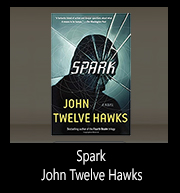 John Twelve Hawks - Spark (2017)
"Jacob Underwood is dead. At least, he thinks he is. Suffering the after effects of a traumatic accident, Jacob believes
he is dead, just a spark existing inside a body, but unable to fully interact with anything around him. Emotionally detached and
living in a shadowy, silent world, Jacob is the ideal assassin. When a new hit is assigned to him, Jacob must prepare himself -
and his journey will change both his self, and how he sees the world around him. John Twelve Hawks is an interesting character -
he rose to fame following the publication of his 'Fourth Realm Trilogy', and yet the real identity of the author is unknown. His fear of
publicity, fame, and putting details in the public domain, are used wonderfully in this novel, and really help to build the world. The
world itself is a dystopian future, one in which privacy is long extinct, and all thoughts are monitored for deviations against the norm.
Jacob Underwood, the main character, fits in well in the world - his lack of emotions making him able to carry out assassinations
without much fear of detection. "
~ TheBookBag.co.uk and
Amazon Books
John Twelve Hawks - Spark (2017)
"Jacob Underwood is dead. At least, he thinks he is. Suffering the after effects of a traumatic accident, Jacob believes
he is dead, just a spark existing inside a body, but unable to fully interact with anything around him. Emotionally detached and
living in a shadowy, silent world, Jacob is the ideal assassin. When a new hit is assigned to him, Jacob must prepare himself -
and his journey will change both his self, and how he sees the world around him. John Twelve Hawks is an interesting character -
he rose to fame following the publication of his 'Fourth Realm Trilogy', and yet the real identity of the author is unknown. His fear of
publicity, fame, and putting details in the public domain, are used wonderfully in this novel, and really help to build the world. The
world itself is a dystopian future, one in which privacy is long extinct, and all thoughts are monitored for deviations against the norm.
Jacob Underwood, the main character, fits in well in the world - his lack of emotions making him able to carry out assassinations
without much fear of detection. "
~ TheBookBag.co.uk and
Amazon Books
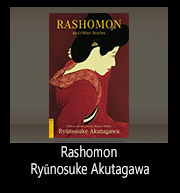 Ryunosuke Akutagawa - Rashomon (1914)
"The author’s gifted and tortured soul is visible throughout this amazing collection of stories. It is divided into four sections:
(1) A World in Decay, (2) Under the Sword, (3) Modern Tragicomedy and (4) Akutagawa’s Own Story. These sections correspond
to four periods of Japanese history as well as four creative styles which took birth from Akutagawa’s fertile imagination. In the first
section, stories (most of them retelling of old legends) set in the Heian Period (A.C.E. 794 – 1185) are included. This was Japan’s
classical era; a time of peace, prosperity and opulence when art and culture flourished. But as is common with most ancient
kingdoms, it declined and power slipped from the hands of the aristocrats into the hands of the warlords. It is this twilight period
that Akutagawa uses as a backdrop for his stories of degeneration and decay. The title story of the collection, Rashomon,
encapsulates the entire misery of the country in the symbol of the gate of the capital city of Kyoto."
~ nandakishorevarma.wordpress.com and
Amazon Books
Ryunosuke Akutagawa - Rashomon (1914)
"The author’s gifted and tortured soul is visible throughout this amazing collection of stories. It is divided into four sections:
(1) A World in Decay, (2) Under the Sword, (3) Modern Tragicomedy and (4) Akutagawa’s Own Story. These sections correspond
to four periods of Japanese history as well as four creative styles which took birth from Akutagawa’s fertile imagination. In the first
section, stories (most of them retelling of old legends) set in the Heian Period (A.C.E. 794 – 1185) are included. This was Japan’s
classical era; a time of peace, prosperity and opulence when art and culture flourished. But as is common with most ancient
kingdoms, it declined and power slipped from the hands of the aristocrats into the hands of the warlords. It is this twilight period
that Akutagawa uses as a backdrop for his stories of degeneration and decay. The title story of the collection, Rashomon,
encapsulates the entire misery of the country in the symbol of the gate of the capital city of Kyoto."
~ nandakishorevarma.wordpress.com and
Amazon Books
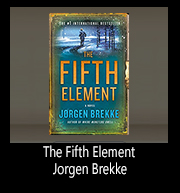 Jorgen Brekke - The Fifth Element (2017)
" Forgoing the historical excursions that tangled the first two cases of Trondheim’s Inspector Odd Singsaker
(Dreamless, 2015, etc.), Brekke mingles the immediate past, present, and future to produce an even more tangled,
but deeply rewarding, tale... The intricately linked plotlines will appeal to puzzle fans. But it’s Brekke’s prodigious
powers of invention, his ability to keep coming up with unforgettable characters and indelible episodes, that lift this
above his own earlier work and most of the heavy Nordic competition."
~ KirkusReviews.com and
Amazon Books
Jorgen Brekke - The Fifth Element (2017)
" Forgoing the historical excursions that tangled the first two cases of Trondheim’s Inspector Odd Singsaker
(Dreamless, 2015, etc.), Brekke mingles the immediate past, present, and future to produce an even more tangled,
but deeply rewarding, tale... The intricately linked plotlines will appeal to puzzle fans. But it’s Brekke’s prodigious
powers of invention, his ability to keep coming up with unforgettable characters and indelible episodes, that lift this
above his own earlier work and most of the heavy Nordic competition."
~ KirkusReviews.com and
Amazon Books
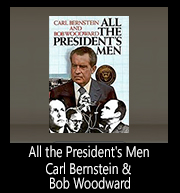 Carl Bernstein & Bob Woodward - All the President's Men (1973)
" In the course of a gripping narrative, rather like a good detective story, we are treated to gossipy peeks
behind the scenes of power in Washington (Ken Clawson of the White House staff hysterically upset not because
the Post was about to print a story saying he had confessed to writing the infamous "Canuck letter," but because his
confession had been given one night to Post reporter Marilyn Berger over drinks in her apartment and he was afraid
the story might reveal that, too; Clawson was a Nixonian family man, after all). More important, we are treated to a
detailed description of the process of diggin"
~ Ron Dorfman - Chicago Tribune and
Amazon Books
Carl Bernstein & Bob Woodward - All the President's Men (1973)
" In the course of a gripping narrative, rather like a good detective story, we are treated to gossipy peeks
behind the scenes of power in Washington (Ken Clawson of the White House staff hysterically upset not because
the Post was about to print a story saying he had confessed to writing the infamous "Canuck letter," but because his
confession had been given one night to Post reporter Marilyn Berger over drinks in her apartment and he was afraid
the story might reveal that, too; Clawson was a Nixonian family man, after all). More important, we are treated to a
detailed description of the process of diggin"
~ Ron Dorfman - Chicago Tribune and
Amazon Books
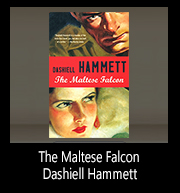 DashiellHammett - The Maltese Falcon (1930)
" is the Hammett novel that jumps from the pages of its genre and into literature. It's the book that
introduces Sam Spade, the private detective who seduced a generation of readers, leading directly to Philip
Marlowe. Dorothy Parker, never a pushover, confessed herself "in a daze of love" such as she had not known
in literature "since I encountered Sir Lancelot" and claimed to have read the novel some 30 or 40 times."
~ Robert McCrum - TheGuardian.com and
Amazon Books
DashiellHammett - The Maltese Falcon (1930)
" is the Hammett novel that jumps from the pages of its genre and into literature. It's the book that
introduces Sam Spade, the private detective who seduced a generation of readers, leading directly to Philip
Marlowe. Dorothy Parker, never a pushover, confessed herself "in a daze of love" such as she had not known
in literature "since I encountered Sir Lancelot" and claimed to have read the novel some 30 or 40 times."
~ Robert McCrum - TheGuardian.com and
Amazon Books
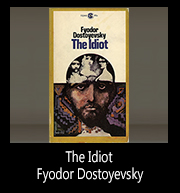 Fyodor Dostoyevsky - The Idiot (1868-9)
"is a novel by the 19th-century Russian author Fyodor Dostoyevsky. It was first published serially in the journal
The Russian Messenger in 1868-9. The title is an ironic reference to the central character of the novel, Prince (Knyaz)
Lyov Nikolaevich Myshkin, a young man whose goodness and open-hearted simplicity lead many of the more worldly characters
he encounters to mistakenly assume that he lacks intelligence and insight. In the character of Prince Myshkin, Dostoevsky
set himself the task of depicting "the positively good and beautiful man".[2] The novel examines the consequences of
placing such a unique individual at the centre of the conflicts, desires, passions and egoism of worldly society, both
for the man himself and for those with whom he becomes involved. The result, according to philosopher A.C. Grayling, is
"one of the most excoriating, compelling and remarkable books ever written; and without question one of the greatest."[3]"
~ Wikipedia and
Amazon Books
Fyodor Dostoyevsky - The Idiot (1868-9)
"is a novel by the 19th-century Russian author Fyodor Dostoyevsky. It was first published serially in the journal
The Russian Messenger in 1868-9. The title is an ironic reference to the central character of the novel, Prince (Knyaz)
Lyov Nikolaevich Myshkin, a young man whose goodness and open-hearted simplicity lead many of the more worldly characters
he encounters to mistakenly assume that he lacks intelligence and insight. In the character of Prince Myshkin, Dostoevsky
set himself the task of depicting "the positively good and beautiful man".[2] The novel examines the consequences of
placing such a unique individual at the centre of the conflicts, desires, passions and egoism of worldly society, both
for the man himself and for those with whom he becomes involved. The result, according to philosopher A.C. Grayling, is
"one of the most excoriating, compelling and remarkable books ever written; and without question one of the greatest."[3]"
~ Wikipedia and
Amazon Books
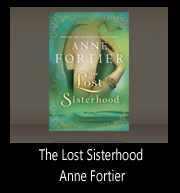 Anne Fortier - The Lost Sisterhood (2014)
"Diana Morgan has focused her career as a philologist (one who engages in the study of
literary text and written records), on the Amazons, the legendary warrior women of ancient
Greece—and with good reason. They’re rooted in her own family history. Before disappearing
without a trace, Diana’s grandmother used to regale her with stories about the lost tribe
of warrior women. Her grandmother even went as far as to suggest that she was an Amazon
herself, leading the rest of the family to doubt her mental capacity. Diana’s scholarly
work at Oxford University centers on the discovery and dissection of the Amazon race;
however, other professors warn her that she is committing career suicide if she continues
to focus on a part of history that most regard as completely fantastical."
~ BookPage® Review by Elisabeth Atwood and
Amazon Books
Anne Fortier - The Lost Sisterhood (2014)
"Diana Morgan has focused her career as a philologist (one who engages in the study of
literary text and written records), on the Amazons, the legendary warrior women of ancient
Greece—and with good reason. They’re rooted in her own family history. Before disappearing
without a trace, Diana’s grandmother used to regale her with stories about the lost tribe
of warrior women. Her grandmother even went as far as to suggest that she was an Amazon
herself, leading the rest of the family to doubt her mental capacity. Diana’s scholarly
work at Oxford University centers on the discovery and dissection of the Amazon race;
however, other professors warn her that she is committing career suicide if she continues
to focus on a part of history that most regard as completely fantastical."
~ BookPage® Review by Elisabeth Atwood and
Amazon Books
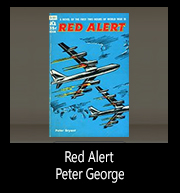 Peter George: Red Alert (1958)
"SAC ATTACK!: Every minute of every hour of every day, there are American bombers
in the air, loaded with H-bombs, ready to fly into action at the mere spark of the right
radio signal. These are the planes and the men of the Strategic Air Command. What happens
once that signal flashes is described vividly in this tensly dramatic novel. The command
came to the men of the 843rd Wing, high in the air near the Soviet border. Asking no
questions, obeying their standing orders, they headed straight towards their assigned
targets. Had America already been attacked? Or was it the action of a single determined
general, and unauthorized by the Pentagon and the president? RED ALERT is the story of the
two tensest hours in human history. Is the basis for the Stanley Kubrick film, "Dr.
Strangelove: Or How I Learned To Stop Worrying And Love The Bomb." Not to be confused
with the later screenplay/novel by Peter George and Stanley Kubrick. This story is very
different from that book and the film.""
~ FantasticFiction.com and
Amazon Books
Peter George: Red Alert (1958)
"SAC ATTACK!: Every minute of every hour of every day, there are American bombers
in the air, loaded with H-bombs, ready to fly into action at the mere spark of the right
radio signal. These are the planes and the men of the Strategic Air Command. What happens
once that signal flashes is described vividly in this tensly dramatic novel. The command
came to the men of the 843rd Wing, high in the air near the Soviet border. Asking no
questions, obeying their standing orders, they headed straight towards their assigned
targets. Had America already been attacked? Or was it the action of a single determined
general, and unauthorized by the Pentagon and the president? RED ALERT is the story of the
two tensest hours in human history. Is the basis for the Stanley Kubrick film, "Dr.
Strangelove: Or How I Learned To Stop Worrying And Love The Bomb." Not to be confused
with the later screenplay/novel by Peter George and Stanley Kubrick. This story is very
different from that book and the film.""
~ FantasticFiction.com and
Amazon Books
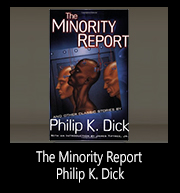 Philip K. Dick: The Minority Report (1956)
"is a 1956 science fiction short story by Philip K. Dick, first published in Fantastic Universe. In a future society,
three mutants foresee all crime before it occurs. Plugged into a great machine, these "precogs" allow the Precrime
Division to arrest suspects prior to any infliction of public harm. When the head of Precrime, John A. Anderton, is accused
of murdering Leopold Kaplan, a man whom he has never met, Anderton is convinced a great conspiracy is afoot.""
~ Wikipedia.org and
Amazon Books
Philip K. Dick: The Minority Report (1956)
"is a 1956 science fiction short story by Philip K. Dick, first published in Fantastic Universe. In a future society,
three mutants foresee all crime before it occurs. Plugged into a great machine, these "precogs" allow the Precrime
Division to arrest suspects prior to any infliction of public harm. When the head of Precrime, John A. Anderton, is accused
of murdering Leopold Kaplan, a man whom he has never met, Anderton is convinced a great conspiracy is afoot.""
~ Wikipedia.org and
Amazon Books
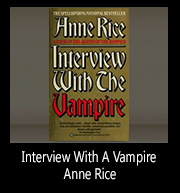 Anne Rice – Interview with a Vampire (1976)
"Interview with the Vampire is a debut gothic horror and vampire novel by American
author Anne Rice, published in 1976. Based on a short story Rice wrote around 1968, the
novel centers on vampire Louis de Pointe du Lac, who tells the story of his life to a
reporter. Rice composed the novel shortly after the death of her young daughter Michelle,
who served as an inspiration for the child-vampire character Claudia. Though initially the
subject of mixed critical reception, the book was followed by a large number of widely
popular sequels, collectively known as The Vampire Chronicles."
~ Wikipedia.org and
Amazon Books
Anne Rice – Interview with a Vampire (1976)
"Interview with the Vampire is a debut gothic horror and vampire novel by American
author Anne Rice, published in 1976. Based on a short story Rice wrote around 1968, the
novel centers on vampire Louis de Pointe du Lac, who tells the story of his life to a
reporter. Rice composed the novel shortly after the death of her young daughter Michelle,
who served as an inspiration for the child-vampire character Claudia. Though initially the
subject of mixed critical reception, the book was followed by a large number of widely
popular sequels, collectively known as The Vampire Chronicles."
~ Wikipedia.org and
Amazon Books
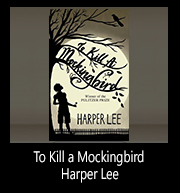 Harper Lee - To Kill a Mockingbird (1960)
"To Kill a Mockingbird focuses on that gut instinct of right and wrong, and distinguishes
it from just following the law. Even the titular quote: "Shoot all the blue jays you want, if
you can hit 'em, but remember it's a sin to kill a mockingbird" is in itself an allegory for
this message. Being in itself a generic message, the idea of 'doing what's right' obviously
has a different meaning depending on when and where you're reading the book."
~ independent.co.uk and
Amazon Books
Harper Lee - To Kill a Mockingbird (1960)
"To Kill a Mockingbird focuses on that gut instinct of right and wrong, and distinguishes
it from just following the law. Even the titular quote: "Shoot all the blue jays you want, if
you can hit 'em, but remember it's a sin to kill a mockingbird" is in itself an allegory for
this message. Being in itself a generic message, the idea of 'doing what's right' obviously
has a different meaning depending on when and where you're reading the book."
~ independent.co.uk and
Amazon Books
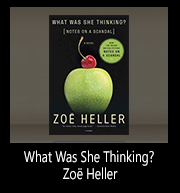 Zoë Heller - What Was She Thinking? (2003)
"This is one of those disquieting novels that proffers its apparent theme then cunningly reveals itself to be
about something else altogether. As its title and first pages suggest, its surface plot concerns a tabloid-pleasing
sizzler of a scandal. Sheba Hart, a 41-year-old pottery teacher, arrives at a dreggy north London comp trailing the
kind of tarnished glamour that sets the school's sex-starved males mildly abuzz. The suitor who presses his case
first is 15-year-old Steven Connolly, a reasonably gormless lad with mild artistic proclivities, a cabbie father,
and a home on an estate."
~ TheGuardian.com and
Amazon Books
Zoë Heller - What Was She Thinking? (2003)
"This is one of those disquieting novels that proffers its apparent theme then cunningly reveals itself to be
about something else altogether. As its title and first pages suggest, its surface plot concerns a tabloid-pleasing
sizzler of a scandal. Sheba Hart, a 41-year-old pottery teacher, arrives at a dreggy north London comp trailing the
kind of tarnished glamour that sets the school's sex-starved males mildly abuzz. The suitor who presses his case
first is 15-year-old Steven Connolly, a reasonably gormless lad with mild artistic proclivities, a cabbie father,
and a home on an estate."
~ TheGuardian.com and
Amazon Books
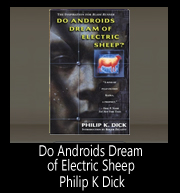 Philip K Dick - Do Androids Dream of Electric Sheep (1968)
"Philip K Dick's vision of a dystopian post-apocalyptic earth is a seminal work
of science fiction, created in 1968 it was way ahead of it's time and predicted
such technology as the video phone. There are many ideas subtly played
throughout the novel, while on the surface we've got the examination of the
human condition which asks questions about identity and altruism, we've also got
the religious theory of Mercerism - a pseudo-religion that offers many a clearly
false hope."
~ Anthony - SF Book Reviewsand
Amazon Books
Philip K Dick - Do Androids Dream of Electric Sheep (1968)
"Philip K Dick's vision of a dystopian post-apocalyptic earth is a seminal work
of science fiction, created in 1968 it was way ahead of it's time and predicted
such technology as the video phone. There are many ideas subtly played
throughout the novel, while on the surface we've got the examination of the
human condition which asks questions about identity and altruism, we've also got
the religious theory of Mercerism - a pseudo-religion that offers many a clearly
false hope."
~ Anthony - SF Book Reviewsand
Amazon Books
 Anne Tyler - The Accidental Tourist (1985)
"'The Accidental Tourist' combines comedy and tragedy without veering into farce or sentimentality. It's a novel
that runs deep and showcases her ability to make the everyday both entirely recognisable and extraordinary. This novel,
full of wisdom and writing that sneaks up on you with its brilliance, its insights, and its sheer humanity, gave me back
my appetite for reading - while its author became an enduring professional role-model."
~ independent.co.uk and
Amazon Books
Anne Tyler - The Accidental Tourist (1985)
"'The Accidental Tourist' combines comedy and tragedy without veering into farce or sentimentality. It's a novel
that runs deep and showcases her ability to make the everyday both entirely recognisable and extraordinary. This novel,
full of wisdom and writing that sneaks up on you with its brilliance, its insights, and its sheer humanity, gave me back
my appetite for reading - while its author became an enduring professional role-model."
~ independent.co.uk and
Amazon Books
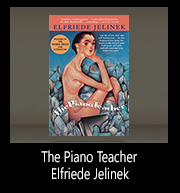 Michael Haneke - The Piano Teacher (1983)
"In Michael Haneke's 2001 adaptation of Elfriede Jelinek's novel, the role of the piano teacher
is played, with a chilling impenetrability, by Isabelle Huppert. Her performance allows us to apprehend
her character's intense inner life, but from a distance. The actual novel is far more terrifying. Jelinek
plunges us into the mind of Erika Kohut, a repressed piano teacher and failed concert pianist who
self-harms and joylessly engages in sexual voyeurism."
~ theguardian.com and
Amazon Books
Michael Haneke - The Piano Teacher (1983)
"In Michael Haneke's 2001 adaptation of Elfriede Jelinek's novel, the role of the piano teacher
is played, with a chilling impenetrability, by Isabelle Huppert. Her performance allows us to apprehend
her character's intense inner life, but from a distance. The actual novel is far more terrifying. Jelinek
plunges us into the mind of Erika Kohut, a repressed piano teacher and failed concert pianist who
self-harms and joylessly engages in sexual voyeurism."
~ theguardian.com and
Amazon Books
 Delacorta - DIVA (1997)
"This short novel is a light-hearted but hard-edged trip through the seedy underside of
Parisian life and the business side of operatic music. It seems pertinent to point out that
the book was later made into a stylish movie in 1981, which has since gained cult status and
remains a favorite of this reader. As the movie was so widely known (perhaps not so much any
more?), the novel is perhaps a bit of a curiosity as one of the few works of its author,
Delacorta (nom de plume of Swiss author Daniel Odier), to have been translated into English.
The movie diverged from the book in the protagonists it focused upon, as well as in its more
romantic storytelling. "
~ John Q McDonald - The Thumbnail Book Reviews and
Abe Books
Delacorta - DIVA (1997)
"This short novel is a light-hearted but hard-edged trip through the seedy underside of
Parisian life and the business side of operatic music. It seems pertinent to point out that
the book was later made into a stylish movie in 1981, which has since gained cult status and
remains a favorite of this reader. As the movie was so widely known (perhaps not so much any
more?), the novel is perhaps a bit of a curiosity as one of the few works of its author,
Delacorta (nom de plume of Swiss author Daniel Odier), to have been translated into English.
The movie diverged from the book in the protagonists it focused upon, as well as in its more
romantic storytelling. "
~ John Q McDonald - The Thumbnail Book Reviews and
Abe Books
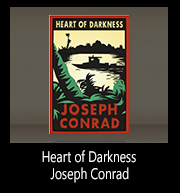 Joseph Conrad - Heart of Darkness (1899)
"In 1890, Joseph Conrad, an officer aboard the Roi des Belges, sailed up the River Congo into
the hinterland of the Congo Free State, in effect the private fiefdom of King Leopold of Belgium.
Eight years later, just as details of Leopold's genocidal regime began to become public, Conrad's
experiences there inspired him to write Heart of Darkness, as powerful a condemnation of imperialism
as has ever been written, and still a deeply unsettling read more than a century on."
Wikipedia,
Amazon Books
Joseph Conrad - Heart of Darkness (1899)
"In 1890, Joseph Conrad, an officer aboard the Roi des Belges, sailed up the River Congo into
the hinterland of the Congo Free State, in effect the private fiefdom of King Leopold of Belgium.
Eight years later, just as details of Leopold's genocidal regime began to become public, Conrad's
experiences there inspired him to write Heart of Darkness, as powerful a condemnation of imperialism
as has ever been written, and still a deeply unsettling read more than a century on."
Wikipedia,
Amazon Books
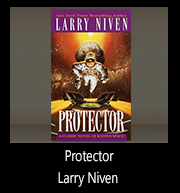 Larry Niven - Protector (1987)
"The novel comprises two phases in the same space that are separated by 220 years of time. Its central
conceit is that Humans evolved from the juvenile stage of the Pak, a species with a distinct adult form
("protectors") that have immense strength and intelligence and care only about younger Pak of their bloodline.
A key plot point is that transition to the protector stage is mediated by consumption of the root of a particular
plant called Tree-of-Life, which cannot be effectively cultivated on Earth."
Wikipedia,
Amazon Books
Larry Niven - Protector (1987)
"The novel comprises two phases in the same space that are separated by 220 years of time. Its central
conceit is that Humans evolved from the juvenile stage of the Pak, a species with a distinct adult form
("protectors") that have immense strength and intelligence and care only about younger Pak of their bloodline.
A key plot point is that transition to the protector stage is mediated by consumption of the root of a particular
plant called Tree-of-Life, which cannot be effectively cultivated on Earth."
Wikipedia,
Amazon Books
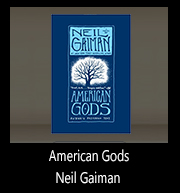 Neil Gaiman - American Gods (2001)
"In what is one of his most celebrated works, up there along with Sandman, Neil Gaiman’s American Gods is one
of the best books of its genre. The real dilemma presented us however is understanding just which genre Gaiman was
writing. This is not a negative opinion of his writing ability, suggesting that he doesn’t seem to have any idea
what he is doing. Just the contrary, American Gods manages to broach several genre barriers all the while making
it look as if Gaiman was creating his own genre."
Fantasy Book Review,
Amazon Books
Neil Gaiman - American Gods (2001)
"In what is one of his most celebrated works, up there along with Sandman, Neil Gaiman’s American Gods is one
of the best books of its genre. The real dilemma presented us however is understanding just which genre Gaiman was
writing. This is not a negative opinion of his writing ability, suggesting that he doesn’t seem to have any idea
what he is doing. Just the contrary, American Gods manages to broach several genre barriers all the while making
it look as if Gaiman was creating his own genre."
Fantasy Book Review,
Amazon Books
 Rob Thomas & Jennifer Graham - Veronica Mars: The Thousand-Dollar Tan Line (2014)
"Ten years after graduating from high school in Neptune, California, Veronica Mars is back in
the land of sun, sand, crime, and corruption. She's traded in her law degree for her old private
investigating license, struggling to keep Mars Investigations afloat on the scant cash earned by
catching cheating spouses until she can score her first big case."
Goodreads,
Amazon Books
Rob Thomas & Jennifer Graham - Veronica Mars: The Thousand-Dollar Tan Line (2014)
"Ten years after graduating from high school in Neptune, California, Veronica Mars is back in
the land of sun, sand, crime, and corruption. She's traded in her law degree for her old private
investigating license, struggling to keep Mars Investigations afloat on the scant cash earned by
catching cheating spouses until she can score her first big case."
Goodreads,
Amazon Books
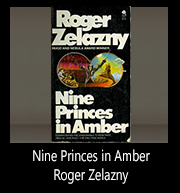 ROGER ZELAZNY - Nine Princes in Amber (1970)
"The first novel of the series, which would eventually span ten volumes (but all of which together perhaps have no
greater a cumulative word-count than a single Terry Goodkind book), introduces us to Corwin, the long-lost heir to the
throne of Amber, the "true" Earth beneath which all other worlds, including our own, belong to the realm of Shadow.
Exiled to our world years before by his brother Eric, Corwin's tale begins in a hospital where he awakens with total
amnesia and is forced to piece his identity and destiny together with only the scantiest of clues. Reacquainted with
two siblings, his sister Flora and brother Random, Corwin learns, gradually, of his true identity even as Eric, fearing
his return to Amber, is sending thugs and killers after him. Corwin and Random return — through magical means that
Zelazny disdains to explain fully so as, one assumes, not to rob the story of its poetry — to Amber. There Corwin's
memory is restored through an ordeal involving a magical Pattern, and the fight against Eric is quickly joined after that."
sfreviews.net,
Amazon Books
ROGER ZELAZNY - Nine Princes in Amber (1970)
"The first novel of the series, which would eventually span ten volumes (but all of which together perhaps have no
greater a cumulative word-count than a single Terry Goodkind book), introduces us to Corwin, the long-lost heir to the
throne of Amber, the "true" Earth beneath which all other worlds, including our own, belong to the realm of Shadow.
Exiled to our world years before by his brother Eric, Corwin's tale begins in a hospital where he awakens with total
amnesia and is forced to piece his identity and destiny together with only the scantiest of clues. Reacquainted with
two siblings, his sister Flora and brother Random, Corwin learns, gradually, of his true identity even as Eric, fearing
his return to Amber, is sending thugs and killers after him. Corwin and Random return — through magical means that
Zelazny disdains to explain fully so as, one assumes, not to rob the story of its poetry — to Amber. There Corwin's
memory is restored through an ordeal involving a magical Pattern, and the fight against Eric is quickly joined after that."
sfreviews.net,
Amazon Books
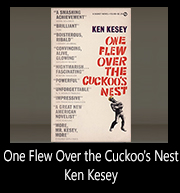 Ken Kesey - One Flew Over the Cuckoo's Nest (1962)
"Kesey uses a risky narrative device. The story's told by Chief Bromden, a longtime mental patient who has been electroshocked
and overmedicated, leaving his perception wavery and confused. At times lost between a dream state and reality, Chief is hampered by
fear and his vision that the real world is controlled by a massive, metallic superstructure he calls the Combine. Everyone believes,
incorrectly, that Chief is deaf and dumb; his perceived disability allows him to move essentially unseen throughout the ward,
witnessing private conversations. This means he can tell us everything that's happening, although sometimes he tells it slant."
latimes.com,
Amazon Books
Ken Kesey - One Flew Over the Cuckoo's Nest (1962)
"Kesey uses a risky narrative device. The story's told by Chief Bromden, a longtime mental patient who has been electroshocked
and overmedicated, leaving his perception wavery and confused. At times lost between a dream state and reality, Chief is hampered by
fear and his vision that the real world is controlled by a massive, metallic superstructure he calls the Combine. Everyone believes,
incorrectly, that Chief is deaf and dumb; his perceived disability allows him to move essentially unseen throughout the ward,
witnessing private conversations. This means he can tell us everything that's happening, although sometimes he tells it slant."
latimes.com,
Amazon Books
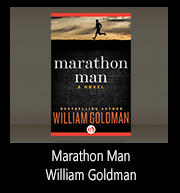 William Goldman - Marathon Man (1974)
"Okay it's the mid-seventies and times aren't so great in the United States. Watergate, Vietnam, recession, inflation, energy crises,
oil embargo, dramatic increase in crime, Richard Nixon and Disco. People were tired, wearing double-knit polyester leisure suits, angry,
afraid (of everything) paranoid, and feeling spiritually bankrupt. So along comes William Goldman with Marathon Man. A grim, violent,
paranoid thriller. People ate it up."
StephenKing.com,
Amazon Books
William Goldman - Marathon Man (1974)
"Okay it's the mid-seventies and times aren't so great in the United States. Watergate, Vietnam, recession, inflation, energy crises,
oil embargo, dramatic increase in crime, Richard Nixon and Disco. People were tired, wearing double-knit polyester leisure suits, angry,
afraid (of everything) paranoid, and feeling spiritually bankrupt. So along comes William Goldman with Marathon Man. A grim, violent,
paranoid thriller. People ate it up."
StephenKing.com,
Amazon Books
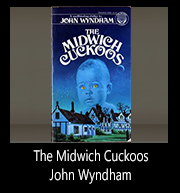 John Wyndham - The Midwich Cuckoos (1957)
"For those of you still in the dark as to this novel's plot: it all begins when the sleepy little country hamlet of Midwich,
a town the book's narrator goes to great pains to describe as utterly nondescript, experiences a bizarre phenomenon. For a full day,
every living thing is rendered unconscious by a mysterious force that forms a perfect circle enveloping the whole town. With a few
obvious exceptions (someone killed falling down stairs, etc.), everyone wakes up from the ordeal — which will soon be referred to as
the "Dayout" — none the worse for their experience. Until it is revealed that every woman of child-bearing age in Midwich is pregnant."
SFReviews.net and
Amazon Books
John Wyndham - The Midwich Cuckoos (1957)
"For those of you still in the dark as to this novel's plot: it all begins when the sleepy little country hamlet of Midwich,
a town the book's narrator goes to great pains to describe as utterly nondescript, experiences a bizarre phenomenon. For a full day,
every living thing is rendered unconscious by a mysterious force that forms a perfect circle enveloping the whole town. With a few
obvious exceptions (someone killed falling down stairs, etc.), everyone wakes up from the ordeal — which will soon be referred to as
the "Dayout" — none the worse for their experience. Until it is revealed that every woman of child-bearing age in Midwich is pregnant."
SFReviews.net and
Amazon Books
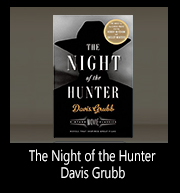 Davis Grubb - Night of the Hunter (1953)
"When the actor James O'Neill played the title character in a stage version of The Count of Monte Cristo, it was a piece
of "good bad luck," his son Eugene O'Neill later said. James O'Neill could never escape the shadow of the role that made him famous.
A related kind of "good bad luck" befell Davis Grubb in 1955, when a movie was made of the novel he had published two years earlier,
The Night of the Hunter. So vivid and menacing is the film, which stars Robert Mitchum as the sinister predator with l-o-v-e tattooed on the
knuckles of one hand and h-a-t-e on the other, that most people have forgotten all about the novel. That's a shame, because The Night of
the Hunter is a gorgeous gut-punch of a book, a crime novel and ghost story and morality tale all rolled into one, an ugly-beautiful book that
makes you leap at shadows and shudder when the sun goes down."
Julia Keller - NPR Books
Amazon Books
Davis Grubb - Night of the Hunter (1953)
"When the actor James O'Neill played the title character in a stage version of The Count of Monte Cristo, it was a piece
of "good bad luck," his son Eugene O'Neill later said. James O'Neill could never escape the shadow of the role that made him famous.
A related kind of "good bad luck" befell Davis Grubb in 1955, when a movie was made of the novel he had published two years earlier,
The Night of the Hunter. So vivid and menacing is the film, which stars Robert Mitchum as the sinister predator with l-o-v-e tattooed on the
knuckles of one hand and h-a-t-e on the other, that most people have forgotten all about the novel. That's a shame, because The Night of
the Hunter is a gorgeous gut-punch of a book, a crime novel and ghost story and morality tale all rolled into one, an ugly-beautiful book that
makes you leap at shadows and shudder when the sun goes down."
Julia Keller - NPR Books
Amazon Books
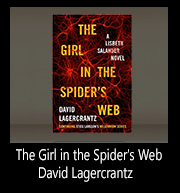 David Lagercrantz – The Girl in the Spider's Web: A Lisbeth Salander novel (2015)
"Without ever becoming pastiche, the book is a respectful and affectionate homage to the originals. Two of the new characters
deliberately nod to the Pippi Longstocking books, which were one of Larsson’s inspirations for Salander; and the Swedish title,
Men Who Hate Women, of the first Millennium book, The Girl with the Dragon Tattoo, is alluded to in a number of references to
misogny and maltreatment of women. There may still be arguments about whether continuation novels should be written at all,
but Lagercrantz could not have fulfilled the commission any more efficiently. The novel leaves much to be said between Salander
and Blomkvist and so surely increases the chances of the sequence continuing on towards the 10 books that Larsson is said to
have originally imagined."
~ Mark Lawson - The Guardian. Link:
Amazon Books and
Wikipedia
David Lagercrantz – The Girl in the Spider's Web: A Lisbeth Salander novel (2015)
"Without ever becoming pastiche, the book is a respectful and affectionate homage to the originals. Two of the new characters
deliberately nod to the Pippi Longstocking books, which were one of Larsson’s inspirations for Salander; and the Swedish title,
Men Who Hate Women, of the first Millennium book, The Girl with the Dragon Tattoo, is alluded to in a number of references to
misogny and maltreatment of women. There may still be arguments about whether continuation novels should be written at all,
but Lagercrantz could not have fulfilled the commission any more efficiently. The novel leaves much to be said between Salander
and Blomkvist and so surely increases the chances of the sequence continuing on towards the 10 books that Larsson is said to
have originally imagined."
~ Mark Lawson - The Guardian. Link:
Amazon Books and
Wikipedia
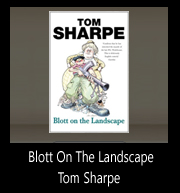 Blott On The Landscape - Tom Sharpe (1975)
"The novel Blott on the Landscape by Tom Sharpe is a fine English comedy. It feels realistic
even when the situations escalate into outrageousness. The eccentric, misplaced, or merely
crooked personalities blunder through their crises with often risque mutual attraction and
repulsion. The action is fast, the plot tight, and the deceptively straightforward style
well laced with wit... Blott on the Landscape, like Tom Sharpe's works generally, is not
for young or tender sensibilities. There is skullduggery of an adult nature. The psychological
and legal maneuverings escalate hilariously, and Sharpe is capable of considerable mayhem as the
"normal" procedures spiral out of control. A very funny novel."
~ Read Review: ~ Robert Wilfred Franson - troynovant.com and
Amazon Books
Blott On The Landscape - Tom Sharpe (1975)
"The novel Blott on the Landscape by Tom Sharpe is a fine English comedy. It feels realistic
even when the situations escalate into outrageousness. The eccentric, misplaced, or merely
crooked personalities blunder through their crises with often risque mutual attraction and
repulsion. The action is fast, the plot tight, and the deceptively straightforward style
well laced with wit... Blott on the Landscape, like Tom Sharpe's works generally, is not
for young or tender sensibilities. There is skullduggery of an adult nature. The psychological
and legal maneuverings escalate hilariously, and Sharpe is capable of considerable mayhem as the
"normal" procedures spiral out of control. A very funny novel."
~ Read Review: ~ Robert Wilfred Franson - troynovant.com and
Amazon Books
 All You Need Is Kill - Hiroshi Sakurazaka (2004)
"Hiroshi Sakurazaka has written a grim story. Main character Kiriya Keiji is stuck in
an unending nightmare of war and death. Where other people would break, however, Keiji
is determined to break out of his personal hell and pay those alien invaders back for
all the pain they inflict on him and his comrades. Reliving the same two days countless
times, he struggles, learns, adapts and kills. "
~ Read Review: Reading Lamp Blog Spot and
Amazon Books
All You Need Is Kill - Hiroshi Sakurazaka (2004)
"Hiroshi Sakurazaka has written a grim story. Main character Kiriya Keiji is stuck in
an unending nightmare of war and death. Where other people would break, however, Keiji
is determined to break out of his personal hell and pay those alien invaders back for
all the pain they inflict on him and his comrades. Reliving the same two days countless
times, he struggles, learns, adapts and kills. "
~ Read Review: Reading Lamp Blog Spot and
Amazon Books
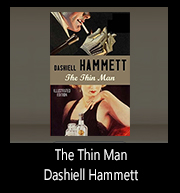 Dashiell Hammett – The Thin Man (1934)
"Steven Marcus, editor of Hammett for The Library of America, said "In a few years of extraordinary
creative energy Dashiell Hammett invented the modern crime novel." In referring to The Thin Man
"His last novel, The Thin Man, a ruefully comic tip of the hat to the traditional mystery form,
introduces Nick and Nora Charles, the sophisticated inebriates who would enjoy a long afterlife
in the movies." So, call me a heretic. I didn't find anything particularly appealing about Nick
and Nora. I am going to watch the movie since I'm leading a book discussion for "Adapted For the
Silver Screen". With the book, I found Nick to be a bored man who married a younger wife. He quit
his profession, drinks too much (constantly), and flirts too much. Nora just seems bored with her
life, looks for excitement wherever she can find it, and, again, drinks, flirts, and pushes Nick
into trouble."
~ Read Review: Lesa's Book Critiques,
Wikipedia and Amazon Books
Dashiell Hammett – The Thin Man (1934)
"Steven Marcus, editor of Hammett for The Library of America, said "In a few years of extraordinary
creative energy Dashiell Hammett invented the modern crime novel." In referring to The Thin Man
"His last novel, The Thin Man, a ruefully comic tip of the hat to the traditional mystery form,
introduces Nick and Nora Charles, the sophisticated inebriates who would enjoy a long afterlife
in the movies." So, call me a heretic. I didn't find anything particularly appealing about Nick
and Nora. I am going to watch the movie since I'm leading a book discussion for "Adapted For the
Silver Screen". With the book, I found Nick to be a bored man who married a younger wife. He quit
his profession, drinks too much (constantly), and flirts too much. Nora just seems bored with her
life, looks for excitement wherever she can find it, and, again, drinks, flirts, and pushes Nick
into trouble."
~ Read Review: Lesa's Book Critiques,
Wikipedia and Amazon Books
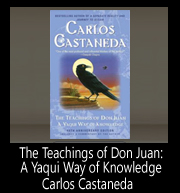 Carlos Castaneda – The Teachings of Don Juan: a Yaqui Way of Knowledge (1968)
"OLD YAQUI. The book was The Teachings of Don Juan: a Yaqui Way of Knowledge
(1968). With its sequels, A Separate Reality (1971) and the current Journey to
Ixtlan (1972), it has made U.S. cult figures of its author and subject an
anthropologist named Carlos Castaneda and a mysterious old Yaqui Indian from
Sonora called Juan Matus. In essence, Castaneda's books are the story of how a
European rationalist was initiated into the practice of Indian sorcery. They
cover a span of ten years, during which, under the weird, taxing and sometimes
comic tutelage of Don Juan, a young academic labored to penetrate and grasp what
he calls the "separate reality" of the sorcerer's world."
~ Read Review: Time Magazine (1973) - erowid.org,
Wikipedia,
Amazon Books and
Website
Carlos Castaneda – The Teachings of Don Juan: a Yaqui Way of Knowledge (1968)
"OLD YAQUI. The book was The Teachings of Don Juan: a Yaqui Way of Knowledge
(1968). With its sequels, A Separate Reality (1971) and the current Journey to
Ixtlan (1972), it has made U.S. cult figures of its author and subject an
anthropologist named Carlos Castaneda and a mysterious old Yaqui Indian from
Sonora called Juan Matus. In essence, Castaneda's books are the story of how a
European rationalist was initiated into the practice of Indian sorcery. They
cover a span of ten years, during which, under the weird, taxing and sometimes
comic tutelage of Don Juan, a young academic labored to penetrate and grasp what
he calls the "separate reality" of the sorcerer's world."
~ Read Review: Time Magazine (1973) - erowid.org,
Wikipedia,
Amazon Books and
Website
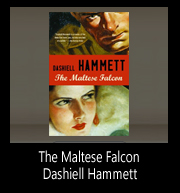 Dashiell Hammett - The Maltese Falcon (1941)
"Raymond Chandler, who has yet to appear in this series, once said: "Hammett is all right. I give
him everything. There were a lot of things he could not do, but what he did, he did superbly." He added,
in a summary that helps define Hammett’s achievement: "He was spare, frugal, hard-boiled, but he did over
and over again what only the best writers can ever do at all. He wrote scenes that seemed never to have
been written before." He also gave his characters a distinctive language and convincing motivations in a
genre that had grown stereotyped, flaccid and uninvolving. The Maltese Falcon is the Hammett novel that
jumps from the pages of its genre and into literature. It’s the book that introduces Sam Spade, the private
detective who seduced a generation of readers, leading directly to Philip Marlowe. Dorothy Parker, never a
pushover, confessed herself "in a daze of love" such as she had not known in literature "since I encountered
Sir Lancelot" and claimed to have read the novel some 30 or 40 times."
~ Robert McCrum - theguardian.com and
Amazon Books
Dashiell Hammett - The Maltese Falcon (1941)
"Raymond Chandler, who has yet to appear in this series, once said: "Hammett is all right. I give
him everything. There were a lot of things he could not do, but what he did, he did superbly." He added,
in a summary that helps define Hammett’s achievement: "He was spare, frugal, hard-boiled, but he did over
and over again what only the best writers can ever do at all. He wrote scenes that seemed never to have
been written before." He also gave his characters a distinctive language and convincing motivations in a
genre that had grown stereotyped, flaccid and uninvolving. The Maltese Falcon is the Hammett novel that
jumps from the pages of its genre and into literature. It’s the book that introduces Sam Spade, the private
detective who seduced a generation of readers, leading directly to Philip Marlowe. Dorothy Parker, never a
pushover, confessed herself "in a daze of love" such as she had not known in literature "since I encountered
Sir Lancelot" and claimed to have read the novel some 30 or 40 times."
~ Robert McCrum - theguardian.com and
Amazon Books
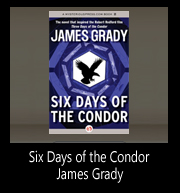 James Grady - Six Days of the Condor (1974)
"The novel that inspired the Robert Redford film Three Days of the Condor.
Sandwiches save Ronald Malcolm’s life. On the day that gunmen pay a visit
to the American Literary Historical Society, he’s out at lunch. The Society
is actually a backwater of the Central Intelligence Agency, where Malcolm
and a few other bookworms comb mystery novels for clues that might unlock
real life diplomatic questions. One of his colleagues has learned something
he wasn’t meant to know. A sinister conspiracy has penetrated the CIA, and
the gunmen are its representatives. They massacre the office, and only learn
later of Malcolm—a loose end that needs to be dealt with."
~ mysteriouspress.com and
Amazon Books
James Grady - Six Days of the Condor (1974)
"The novel that inspired the Robert Redford film Three Days of the Condor.
Sandwiches save Ronald Malcolm’s life. On the day that gunmen pay a visit
to the American Literary Historical Society, he’s out at lunch. The Society
is actually a backwater of the Central Intelligence Agency, where Malcolm
and a few other bookworms comb mystery novels for clues that might unlock
real life diplomatic questions. One of his colleagues has learned something
he wasn’t meant to know. A sinister conspiracy has penetrated the CIA, and
the gunmen are its representatives. They massacre the office, and only learn
later of Malcolm—a loose end that needs to be dealt with."
~ mysteriouspress.com and
Amazon Books
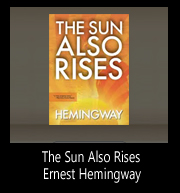 Ernest Hemingway - The Sun Also Rises (1926)
"The Sun Also Rises endures as one of the most popular and significant books to emerge
from American literature of the 1920s – along with Hemingway’s friend F. Scott Fitzgerald’s masterpiece,
The Great Gatsby (published only a year earlier in 1925), which examines postwar life stateside, The
Sun Also Rises is generally regarded as a definitive guide to life in the hedonistic, confusing, and
fascinating post-WWI era."
~ shmoop.com and
Amazon Books
Ernest Hemingway - The Sun Also Rises (1926)
"The Sun Also Rises endures as one of the most popular and significant books to emerge
from American literature of the 1920s – along with Hemingway’s friend F. Scott Fitzgerald’s masterpiece,
The Great Gatsby (published only a year earlier in 1925), which examines postwar life stateside, The
Sun Also Rises is generally regarded as a definitive guide to life in the hedonistic, confusing, and
fascinating post-WWI era."
~ shmoop.com and
Amazon Books
.jpg) Kim Harrison - UNDEAD POOL (2014)
"Witch and day-walking demon Rachel Morgan has managed to save the demonic ever after from shrinking,
but at a high cost. Now strange magic is attacking Cincinnati and the Hollows, causing spells to backfire
or go horribly wrong, and the truce between the races, between Inderlander and human, is shattering.
Rachel must stop the occurrences before the undead vampire masters who keep the rest of the undead
under control are lost and it becomes all-out supernatural war. However, the only way to do so is
through the ancient elven wild magic, which carries its own perils"
~ Caffeinated Book Reviewer and
Amazon Books
Kim Harrison - UNDEAD POOL (2014)
"Witch and day-walking demon Rachel Morgan has managed to save the demonic ever after from shrinking,
but at a high cost. Now strange magic is attacking Cincinnati and the Hollows, causing spells to backfire
or go horribly wrong, and the truce between the races, between Inderlander and human, is shattering.
Rachel must stop the occurrences before the undead vampire masters who keep the rest of the undead
under control are lost and it becomes all-out supernatural war. However, the only way to do so is
through the ancient elven wild magic, which carries its own perils"
~ Caffeinated Book Reviewer and
Amazon Books
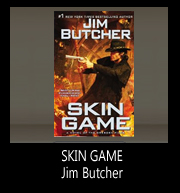 Jim Butcher - SKIN GAME (2014)
"Now if you are reading this book, you know what to expect in a Harry Dresden story,
Jim Butcher piles up the comedy (Parkour), terrific action sequences, crafty plot
twists and some neat character reappearances. Firstly why I think this book rocks
so much is because of Nicodemus and the Denarians. As far as the villains of this
series go, Nicodemus and bunch are pretty much at the top of the sociopathic heap.
What makes Nicodemus IMHO so intriguing is that he's a willing partner with Anduriel
and so far has been the one guy who rivals Harry in his determination! Johnny Marcone
is another fascinating rival for Harry but he's the subject for another book review."
~ Fantasy Book Critic and
Amazon Books
Jim Butcher - SKIN GAME (2014)
"Now if you are reading this book, you know what to expect in a Harry Dresden story,
Jim Butcher piles up the comedy (Parkour), terrific action sequences, crafty plot
twists and some neat character reappearances. Firstly why I think this book rocks
so much is because of Nicodemus and the Denarians. As far as the villains of this
series go, Nicodemus and bunch are pretty much at the top of the sociopathic heap.
What makes Nicodemus IMHO so intriguing is that he's a willing partner with Anduriel
and so far has been the one guy who rivals Harry in his determination! Johnny Marcone
is another fascinating rival for Harry but he's the subject for another book review."
~ Fantasy Book Critic and
Amazon Books
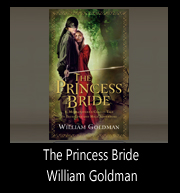 William Goldman - The Princess Bride (1973)
"There are actually two stories here. The first is the supposedly abridged
version of S. Morgenstern's darkly humorous take on the archetypal fairy tale of
high adventure in pitting good and noble young innocents against the treacherous
forces of evil. The second recounts the transformational events that led William
Goldman to write "The Good Parts" abridgement and screenplay of The Princess
Bride in which the forces of good (the creative storyteller) triumph over the
forces of evil (corporate suits who control the purse strings). There's a fairy
tale story here, too, equally archetypal, concerning the reconciliation of a
father and son and the quest to regain a seemingly lost gift. It, too, is a
humorous story with shadowy overtones. Both tales leave us not quite sure if
there's a happy ending. "
~ SF Site: A review by David Soyka and
Amazon Books
William Goldman - The Princess Bride (1973)
"There are actually two stories here. The first is the supposedly abridged
version of S. Morgenstern's darkly humorous take on the archetypal fairy tale of
high adventure in pitting good and noble young innocents against the treacherous
forces of evil. The second recounts the transformational events that led William
Goldman to write "The Good Parts" abridgement and screenplay of The Princess
Bride in which the forces of good (the creative storyteller) triumph over the
forces of evil (corporate suits who control the purse strings). There's a fairy
tale story here, too, equally archetypal, concerning the reconciliation of a
father and son and the quest to regain a seemingly lost gift. It, too, is a
humorous story with shadowy overtones. Both tales leave us not quite sure if
there's a happy ending. "
~ SF Site: A review by David Soyka and
Amazon Books
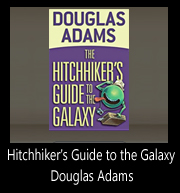 Douglas Adams - The Hitchhiker's Guide to the Galaxy (1978)
"Seconds before the Earth is demolished to make way for a galactic freeway,
Arthur Dent is plucked off the planet by his friend Ford Prefect, a researcher
for the revised edition of The Hitchhiker’s Guide to the Galaxy who, for the
last fifteen years, has been posing as an out-of-work actor. Together this
dynamic pair begin a journey through space aided by quotes from The Hitchhiker’s
Guide and a galaxy-full of fellow travelers."
~ prettybooks.com and
Amazon Books
Douglas Adams - The Hitchhiker's Guide to the Galaxy (1978)
"Seconds before the Earth is demolished to make way for a galactic freeway,
Arthur Dent is plucked off the planet by his friend Ford Prefect, a researcher
for the revised edition of The Hitchhiker’s Guide to the Galaxy who, for the
last fifteen years, has been posing as an out-of-work actor. Together this
dynamic pair begin a journey through space aided by quotes from The Hitchhiker’s
Guide and a galaxy-full of fellow travelers."
~ prettybooks.com and
Amazon Books
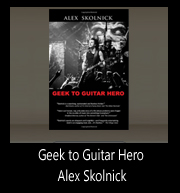 Alex Skolnick - Geek to Guitar Hero (2013)
"Alex Skolnick. Metal fans know him as the lead guitarist for the band
Testament. Jazz fans know him from his band AST – Alex Skolnick Trio. I first
saw and heard him in 2006 when he played with the Trans-Siberian Orchestra. I
remember sensing an immediate connection with him, though at the time I didn’t
know why. I’d see him play with TSO a few more times, really enjoy his playing,
and each time sense there was something more to this guy than great guitar
playing."
~ klyvian.com and
Amazon Books
Alex Skolnick - Geek to Guitar Hero (2013)
"Alex Skolnick. Metal fans know him as the lead guitarist for the band
Testament. Jazz fans know him from his band AST – Alex Skolnick Trio. I first
saw and heard him in 2006 when he played with the Trans-Siberian Orchestra. I
remember sensing an immediate connection with him, though at the time I didn’t
know why. I’d see him play with TSO a few more times, really enjoy his playing,
and each time sense there was something more to this guy than great guitar
playing."
~ klyvian.com and
Amazon Books
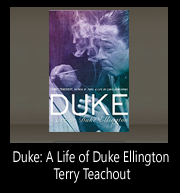 Terry Teachout – Duke: A Life of Duke Ellington ’ (2013)
"Edward Kennedy "Duke" Ellington was the greatest jazz composer of the twentieth
century—and an impenetrably enigmatic personality whom no one, not even his
closest friends, claimed to understand. The grandson of a slave, he dropped out
of high school to become one of the world’s most famous musicians, a showman of
incomparable suavity who was as comfortable in Carnegie Hall as in the
nightclubs where he honed his style. He wrote some fifteen hundred compositions,
many of which, like "Mood Indigo" and "Sophisticated Lady," remain beloved
standards, and he sought inspiration in an endless string of transient lovers,
concealing his inner self behind a smiling mask of flowery language and ironic
charm."
~ 2013 National Book Award Longlist and
Amazon Books
Terry Teachout – Duke: A Life of Duke Ellington ’ (2013)
"Edward Kennedy "Duke" Ellington was the greatest jazz composer of the twentieth
century—and an impenetrably enigmatic personality whom no one, not even his
closest friends, claimed to understand. The grandson of a slave, he dropped out
of high school to become one of the world’s most famous musicians, a showman of
incomparable suavity who was as comfortable in Carnegie Hall as in the
nightclubs where he honed his style. He wrote some fifteen hundred compositions,
many of which, like "Mood Indigo" and "Sophisticated Lady," remain beloved
standards, and he sought inspiration in an endless string of transient lovers,
concealing his inner self behind a smiling mask of flowery language and ironic
charm."
~ 2013 National Book Award Longlist and
Amazon Books
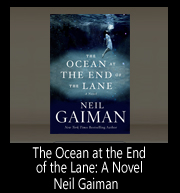 Neil
Gaiman – Ocean at the End of the Lane’ (2013)
""Childhood memories are sometimes covered and obscured beneath the things that
come later, like childhood toys forgotten at the bottom of a crammed adult
closet," Neil Gaiman writes in his slim, dark dream of a new novel, "The Ocean
at the End of the Lane." "But they are never lost for good." Who we used to be
sometimes seems like a faint shadow of who we are now, but Gaiman helps us
remember the wonder and terror and powerlessness that owned us as children."
~ BENJAMIN PERCY - The New York Times and
Amazon Books
Neil
Gaiman – Ocean at the End of the Lane’ (2013)
""Childhood memories are sometimes covered and obscured beneath the things that
come later, like childhood toys forgotten at the bottom of a crammed adult
closet," Neil Gaiman writes in his slim, dark dream of a new novel, "The Ocean
at the End of the Lane." "But they are never lost for good." Who we used to be
sometimes seems like a faint shadow of who we are now, but Gaiman helps us
remember the wonder and terror and powerlessness that owned us as children."
~ BENJAMIN PERCY - The New York Times and
Amazon Books
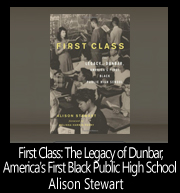 Alison Stewart – First Class: The Legacy of Dunbar, America's First Black Public High School (2013)
"The nation's first black public high school, Paul Laurence Dunbar High, opened
its doors in Washington, D.C., in 1870. But more than 140 years later, Dunbar —
like many urban schools — has fallen on hard times. The crumbling,
brutalist-style building is often described as a prison, and graduation rates
hover around 60 percent. But it wasn't always that way. Once upon a time, the
yearbook read like a Who's Who of black America."
~ NPR Staff article, and
audio interview link.
Amazon Books
Alison Stewart – First Class: The Legacy of Dunbar, America's First Black Public High School (2013)
"The nation's first black public high school, Paul Laurence Dunbar High, opened
its doors in Washington, D.C., in 1870. But more than 140 years later, Dunbar —
like many urban schools — has fallen on hard times. The crumbling,
brutalist-style building is often described as a prison, and graduation rates
hover around 60 percent. But it wasn't always that way. Once upon a time, the
yearbook read like a Who's Who of black America."
~ NPR Staff article, and
audio interview link.
Amazon Books
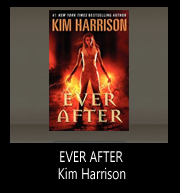 Kim Harrison – Ever After (2012)
"With Ever After, Harrison has presented an emotional, game changing entry into
what is already one of the best urban fantasy series out there right now. Rachel
is much surer of herself in this one, and while she does have her moments of
indecision and some healthy self-doubt (things get pretty bad at times), she’s
at the top of her form magically and she’s not afraid to let her demon flag fly.
"
~ Kristin Centorcelli - SF Signal,
Wikipedia,
Amazon Books and
Website
Kim Harrison – Ever After (2012)
"With Ever After, Harrison has presented an emotional, game changing entry into
what is already one of the best urban fantasy series out there right now. Rachel
is much surer of herself in this one, and while she does have her moments of
indecision and some healthy self-doubt (things get pretty bad at times), she’s
at the top of her form magically and she’s not afraid to let her demon flag fly.
"
~ Kristin Centorcelli - SF Signal,
Wikipedia,
Amazon Books and
Website
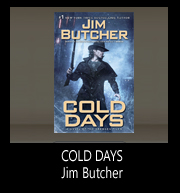 Jim Butcher – Cold Days (2012)
"Cold Days is one hell of a ride. In many ways it’s designed to get us excited
about the series again, and I have to say that it worked for me. After the first
twelve books, and then the transitional Ghost Story, it seems like Butcher is
gearing up for the plunge toward the end. He’s clearly become a better writer
over the years, too, deftly handling multiple plotlines in a confident, assured
way. I used to be someone who was bored by his epic battle scenes in the ends of
the books (I guess I’m more into the character moments), but the one in this
book is solid. In fact, and I mean this in a very good way, I found the action
toward the end cinematic. I could clearly see it taking shape in my mind and it
would thrive on a screen (though it did just fine in my imagination)."
~ Rajan Khanna - tor.com/blogs,
Wikipedia,
Amazon Books &
Website
Jim Butcher – Cold Days (2012)
"Cold Days is one hell of a ride. In many ways it’s designed to get us excited
about the series again, and I have to say that it worked for me. After the first
twelve books, and then the transitional Ghost Story, it seems like Butcher is
gearing up for the plunge toward the end. He’s clearly become a better writer
over the years, too, deftly handling multiple plotlines in a confident, assured
way. I used to be someone who was bored by his epic battle scenes in the ends of
the books (I guess I’m more into the character moments), but the one in this
book is solid. In fact, and I mean this in a very good way, I found the action
toward the end cinematic. I could clearly see it taking shape in my mind and it
would thrive on a screen (though it did just fine in my imagination)."
~ Rajan Khanna - tor.com/blogs,
Wikipedia,
Amazon Books &
Website
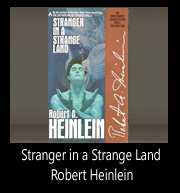 Robert A Heinlein – Stranger in a Strange Land (1961)
"Though this fascinating and controversial novel begins on Mars, the vast
majority of the story is set on earth and concerns terrestrial pre-occupations
such as sex and religion, and yet despite the largely earth-bound setting, Mars
and Martians remain at the heart of the story, mirroring back an avalanche of
ideas on the human condition, both the sacred and profane."
Robert A Heinlein – Stranger in a Strange Land (1961)
"Though this fascinating and controversial novel begins on Mars, the vast
majority of the story is set on earth and concerns terrestrial pre-occupations
such as sex and religion, and yet despite the largely earth-bound setting, Mars
and Martians remain at the heart of the story, mirroring back an avalanche of
ideas on the human condition, both the sacred and profane."
~ war-ofthe-worlds.co.uk, Wikipedia, Amazon Books and Website
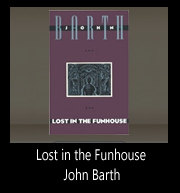 John Barth – Lost in the Funhouse (1968)
"If you study 20th century literature in college, chances are Lost in the
Funhouse will make the syllabus (or at least the recommended reading list).
Barth started getting really wacky with the short stories in this collection,
but what the heck, it was the ’60s. One of these tales ("Menelaiad") was meant
to be read aloud with synchronized looping tape recorders. One ("Night-Sea
Journey") is written from the point of view of a sperm. One ("Frame-tale") is an
endless loop, both the shortest and longest story ever written."
~ Synopsis~ The John Barth Information Center,
Wikipedia,
Amazon Books and
Website
John Barth – Lost in the Funhouse (1968)
"If you study 20th century literature in college, chances are Lost in the
Funhouse will make the syllabus (or at least the recommended reading list).
Barth started getting really wacky with the short stories in this collection,
but what the heck, it was the ’60s. One of these tales ("Menelaiad") was meant
to be read aloud with synchronized looping tape recorders. One ("Night-Sea
Journey") is written from the point of view of a sperm. One ("Frame-tale") is an
endless loop, both the shortest and longest story ever written."
~ Synopsis~ The John Barth Information Center,
Wikipedia,
Amazon Books and
Website
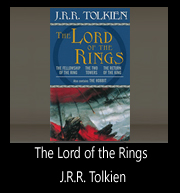 JRR
Tolkien – The Lord of the Rings (1954)
"In ancient times the Rings of Power were crafted by the Elven-smiths, and
Sauron, the Dark Lord, forged the One Ring, filling it with his own power so
that he could rule all others. But the One Ring was taken from him, and though
he sought it throughout Middle-earth still it remained lost to him. After many
ages it fell, by chance, into the hands of the hobbit, Bilbo Baggins. From his
fastness in the Dark Tower of Mordor, Sauron's power spread far and wide. He
gathered all the Great Rings to him, but ever he searched far and wide for the
One Ring that would complete his dominion. On his eleventy-first birthday, Bilbo
disappeared, bequeathing to his young cousin, Frodo, the Ruling Ring, and a
perilous quest: to journey across Middle-earth, deep into the shadow of the Dark
Lord and destroy the Ring by casting it into the Cracks of Doom. The Lord of the
Rings tells of the great quest undertaken by Frodo and the Fellowship of the
Ring: Gandalf the wizard, Merry, Pippin and Sam, Gimli the Dwarf, Legolas the
Elf, Boromir of Gondor, and a tall, mysterious stranger called Strider... "
~ Read Review~ FantasyBookReview.co.uk
Amazon Books
JRR
Tolkien – The Lord of the Rings (1954)
"In ancient times the Rings of Power were crafted by the Elven-smiths, and
Sauron, the Dark Lord, forged the One Ring, filling it with his own power so
that he could rule all others. But the One Ring was taken from him, and though
he sought it throughout Middle-earth still it remained lost to him. After many
ages it fell, by chance, into the hands of the hobbit, Bilbo Baggins. From his
fastness in the Dark Tower of Mordor, Sauron's power spread far and wide. He
gathered all the Great Rings to him, but ever he searched far and wide for the
One Ring that would complete his dominion. On his eleventy-first birthday, Bilbo
disappeared, bequeathing to his young cousin, Frodo, the Ruling Ring, and a
perilous quest: to journey across Middle-earth, deep into the shadow of the Dark
Lord and destroy the Ring by casting it into the Cracks of Doom. The Lord of the
Rings tells of the great quest undertaken by Frodo and the Fellowship of the
Ring: Gandalf the wizard, Merry, Pippin and Sam, Gimli the Dwarf, Legolas the
Elf, Boromir of Gondor, and a tall, mysterious stranger called Strider... "
~ Read Review~ FantasyBookReview.co.uk
Amazon Books
 Paul de Barros – 'Shall We Play That One Together?': The life of piano jazz legend Marian McPartland (2012)
"Jazz critic and Seattle Times music editor Paul de Barros' compelling new
biography of Marian McPartland, "Shall We Play That One Together?," is a
knowledgeable and evenhanded account of the life of McPartland, from her birth
in England to her long tenure as NPR's "Piano Jazz" host. "
~ Read Review ~ Gene Seymour - seattletimes.com and
Interview ~ Paul de Barros: Critically Speaking
Paul de Barros – 'Shall We Play That One Together?': The life of piano jazz legend Marian McPartland (2012)
"Jazz critic and Seattle Times music editor Paul de Barros' compelling new
biography of Marian McPartland, "Shall We Play That One Together?," is a
knowledgeable and evenhanded account of the life of McPartland, from her birth
in England to her long tenure as NPR's "Piano Jazz" host. "
~ Read Review ~ Gene Seymour - seattletimes.com and
Interview ~ Paul de Barros: Critically Speaking
 Laura Joh Rowland – Shinju (1994)
"Shinju is a novel that introduces its reader to Sano Ichiro, a member of the
shogun class who serves as a yoriki, investigating crimes in seventeenth-century
Edo (Tokyo). It’s a position he’d rather not be in, since he gained his position
through connections; and many of his contemporaries resent him for it. When the
daughter of one of the most preeminent families in Edo turns up dead in the
company of a lowly artist, everyone assumes that they were a double
love-suicide, or Shinju. But Sano Ichiro suspects otherwise, and his search for
a murderer leads him into dangerous territory—especially since the family of the
dead girl would rather keep the matter closed. "
~ Read Review: agirlwalksintoabookstore blogspot,
Wikipedia,
Amazon Books and
Website
Laura Joh Rowland – Shinju (1994)
"Shinju is a novel that introduces its reader to Sano Ichiro, a member of the
shogun class who serves as a yoriki, investigating crimes in seventeenth-century
Edo (Tokyo). It’s a position he’d rather not be in, since he gained his position
through connections; and many of his contemporaries resent him for it. When the
daughter of one of the most preeminent families in Edo turns up dead in the
company of a lowly artist, everyone assumes that they were a double
love-suicide, or Shinju. But Sano Ichiro suspects otherwise, and his search for
a murderer leads him into dangerous territory—especially since the family of the
dead girl would rather keep the matter closed. "
~ Read Review: agirlwalksintoabookstore blogspot,
Wikipedia,
Amazon Books and
Website
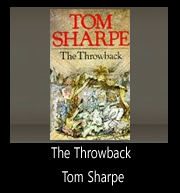 Tom
Sharpe – The Throwback (1978)
"Tom Sharpe, best known for the Wilt novels, has been described as Britain's
funniest living novelist, but unforgivably I had never read any of his books
apart from an extract from Wilt in an English A level class in 1996. So when I
came across a copy of The Throwback among the second hand bookstall at Barnes
Village Fair, I pounced on it. Gosh. Lockhart Flawse is a bastard. Literally.
The identity of his father is a vexing question to his grandfather, who takes
Lockhart under his wing and raises him at Flawse Hall to be completely innocent
in all matters of sexuality."
~ Read Review: Kenneth Andrews - Helium.com,
Wikipedia,
Amazon Books and
Website
Tom
Sharpe – The Throwback (1978)
"Tom Sharpe, best known for the Wilt novels, has been described as Britain's
funniest living novelist, but unforgivably I had never read any of his books
apart from an extract from Wilt in an English A level class in 1996. So when I
came across a copy of The Throwback among the second hand bookstall at Barnes
Village Fair, I pounced on it. Gosh. Lockhart Flawse is a bastard. Literally.
The identity of his father is a vexing question to his grandfather, who takes
Lockhart under his wing and raises him at Flawse Hall to be completely innocent
in all matters of sexuality."
~ Read Review: Kenneth Andrews - Helium.com,
Wikipedia,
Amazon Books and
Website
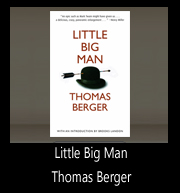 Thomas Berger – Little Big Man (1989)
- A Classic Novel of Lies and Counter-Lies in the Old West -
"Little Big Man by Thomas Berger is a classic novel that explores the shifting
sands between truth and fiction, lies and facts. It is an excellent read,
beautifully written, and on top of all that a poignant and memorable story. But
the novel goes deeper because at its core it challenges what we think about the
Old West, and why we think and believe the things we do. "
~ Read Review: Kenneth Mark Hoover - thewesternonline.com,
Wikipedia,
Amazon Books and
Official Publisher Page
Thomas Berger – Little Big Man (1989)
- A Classic Novel of Lies and Counter-Lies in the Old West -
"Little Big Man by Thomas Berger is a classic novel that explores the shifting
sands between truth and fiction, lies and facts. It is an excellent read,
beautifully written, and on top of all that a poignant and memorable story. But
the novel goes deeper because at its core it challenges what we think about the
Old West, and why we think and believe the things we do. "
~ Read Review: Kenneth Mark Hoover - thewesternonline.com,
Wikipedia,
Amazon Books and
Official Publisher Page
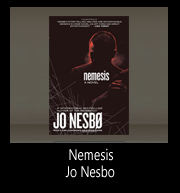 Jo Nesbø – Nemesis (2002) - "Nemesis is the fourth book in Jo
Nesbo’s excellent Harry Hole series, but the second available in English
translation if you wish to read the books in chronological order. It is
confusing as the first two Harry Hole books have not been translated into
English and the rest have been translated out of order. For the correct reading
order, I’ve provided a list at the end of this review. I strongly recommend
reading the series in order if you can. While the mysteries are self-contained
and solved by the end of each novel, there is a subplot which forms a continuing
story arc over a few books."
~ Read Review: Sarah - monkeybearreviews.com,
Wikipedia,
Amazon Books and
Website
Jo Nesbø – Nemesis (2002) - "Nemesis is the fourth book in Jo
Nesbo’s excellent Harry Hole series, but the second available in English
translation if you wish to read the books in chronological order. It is
confusing as the first two Harry Hole books have not been translated into
English and the rest have been translated out of order. For the correct reading
order, I’ve provided a list at the end of this review. I strongly recommend
reading the series in order if you can. While the mysteries are self-contained
and solved by the end of each novel, there is a subplot which forms a continuing
story arc over a few books."
~ Read Review: Sarah - monkeybearreviews.com,
Wikipedia,
Amazon Books and
Website
 Kim Harrison – A Perfect Blood (2012) "Everyone's
favourite itchy witch is quickly in trouble again as she becomes involved in
solving a series of gruesome murders perpetrated by HAPA, a human hate group
whose attentions are directed at Inderlanders. And of course Rachel is suspected
of nefarious involvement now that her status as a demon has been revealed.
Events unfold with plenty of twists and turns. A Perfect Blood is a solid and
welcome entry in the The Hollows mythology. It doesn't resolve any of the really
big overreaching story arc questions and that may disappoint some fans, but
ultimately Rachel is the heart of the series and deservedly so. She shines in A
Perfect Blood, easily carrying the mystery thriller on her shoulders."
~ Read Review: scifiguy.ca,
Wikipedia,
Amazon Books and
Website
Kim Harrison – A Perfect Blood (2012) "Everyone's
favourite itchy witch is quickly in trouble again as she becomes involved in
solving a series of gruesome murders perpetrated by HAPA, a human hate group
whose attentions are directed at Inderlanders. And of course Rachel is suspected
of nefarious involvement now that her status as a demon has been revealed.
Events unfold with plenty of twists and turns. A Perfect Blood is a solid and
welcome entry in the The Hollows mythology. It doesn't resolve any of the really
big overreaching story arc questions and that may disappoint some fans, but
ultimately Rachel is the heart of the series and deservedly so. She shines in A
Perfect Blood, easily carrying the mystery thriller on her shoulders."
~ Read Review: scifiguy.ca,
Wikipedia,
Amazon Books and
Website
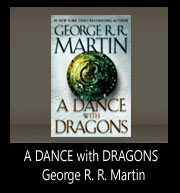 George
R.R. Martin – A Dance with Dragons (2011)
"the fifth book in the hugely popular Song of Ice and Fire fantasy series, is
one of the most anticipated novel of the last few years. In the four previous
volumes of this sprawling fantasy epic, which was inspired by England's War of
the Roses in the 1400s, Martin has captivated readers with complex story lines,
fascinating characters, great dialogue, perfect pacing, and the willingness to
kill off even his major characters. His readers now number in the millions and a
recent HBO series — "Game of Thrones" — based on the first installment in the
series faithfully showcases all of Martin's strengths."
~ Read Review: Jeff VanderMeer - LATimes.com,
Wikipedia,
Amazon Books and
Website
George
R.R. Martin – A Dance with Dragons (2011)
"the fifth book in the hugely popular Song of Ice and Fire fantasy series, is
one of the most anticipated novel of the last few years. In the four previous
volumes of this sprawling fantasy epic, which was inspired by England's War of
the Roses in the 1400s, Martin has captivated readers with complex story lines,
fascinating characters, great dialogue, perfect pacing, and the willingness to
kill off even his major characters. His readers now number in the millions and a
recent HBO series — "Game of Thrones" — based on the first installment in the
series faithfully showcases all of Martin's strengths."
~ Read Review: Jeff VanderMeer - LATimes.com,
Wikipedia,
Amazon Books and
Website
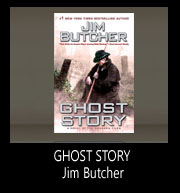 Jim
Butcher – Ghost Story (2011)
"Jim Butcher's "Dresden Files" series is a fast-moving hard-boiled detective
series laced with magic, sex, vampires, werewolves, comic- book references,
fairies and angels — fallen and not. It's very entertaining. Dresden finds out
that with his death, Chicago has been invaded by various evil magical gangs, all
fighting for territory. This is taking a deadly toll on the good guys, most of
whom were Dresden's good friends. Being dead doesn't stop Harry Dresden from
being the man he always was: a stubborn, forceful protector of the city and its
denizens — both human and not — from all evil creatures great and small. Being
dead just makes it a bit more difficult." ~
Read Review: Tish Wells - denverpost.com, Wikipedia,
Amazon Books and
Website
Jim
Butcher – Ghost Story (2011)
"Jim Butcher's "Dresden Files" series is a fast-moving hard-boiled detective
series laced with magic, sex, vampires, werewolves, comic- book references,
fairies and angels — fallen and not. It's very entertaining. Dresden finds out
that with his death, Chicago has been invaded by various evil magical gangs, all
fighting for territory. This is taking a deadly toll on the good guys, most of
whom were Dresden's good friends. Being dead doesn't stop Harry Dresden from
being the man he always was: a stubborn, forceful protector of the city and its
denizens — both human and not — from all evil creatures great and small. Being
dead just makes it a bit more difficult." ~
Read Review: Tish Wells - denverpost.com, Wikipedia,
Amazon Books and
Website
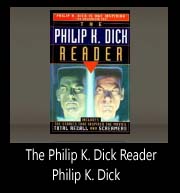 Philip
K. Dick – The Philip K. Dick Reader (1997)
"Many thousands of readers consider Philip K. Dick the greatest science fiction
mind on any planet. Since his untimely death in 1982, interest in Dick's works
has continued to mount, and his reputation has been further enhanced by a
growing body of critical attention. The Philip K. Dick Award is now given
annually to a distinguished work of science fiction, and the Philip K. Dick
Society is devoted to the study and promulgation of his works." ~
Read Review: Kenneth Mark Hoover - thewesternonline.com,
Wikipedia,
Amazon Books and
Website
Philip
K. Dick – The Philip K. Dick Reader (1997)
"Many thousands of readers consider Philip K. Dick the greatest science fiction
mind on any planet. Since his untimely death in 1982, interest in Dick's works
has continued to mount, and his reputation has been further enhanced by a
growing body of critical attention. The Philip K. Dick Award is now given
annually to a distinguished work of science fiction, and the Philip K. Dick
Society is devoted to the study and promulgation of his works." ~
Read Review: Kenneth Mark Hoover - thewesternonline.com,
Wikipedia,
Amazon Books and
Website
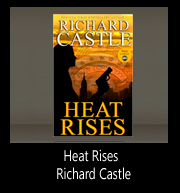 Richard Castle – Heat Rises (2011)
"In this new mystery, Detective Nikki Heat is called to the S&M dungeon where
the body of man who turns out to be a priest, Father Graf, is found strapped to
an apparatus, dead, with evidence of torture. Was that torture part of some
hidden, kinky game Graf was involved in, or something worse? Heat, her partners,
Ochoa and Raley (standing in for Esposito and Ryan from the TV show), have
little to go on, but soon uncover a rather intricate plot that waxes over
numerous suspects and leads."
~ Read Review: Scott D. Parker - scottdparker.blogspot,
Wikipedia,
Amazon Books and
Website
Richard Castle – Heat Rises (2011)
"In this new mystery, Detective Nikki Heat is called to the S&M dungeon where
the body of man who turns out to be a priest, Father Graf, is found strapped to
an apparatus, dead, with evidence of torture. Was that torture part of some
hidden, kinky game Graf was involved in, or something worse? Heat, her partners,
Ochoa and Raley (standing in for Esposito and Ryan from the TV show), have
little to go on, but soon uncover a rather intricate plot that waxes over
numerous suspects and leads."
~ Read Review: Scott D. Parker - scottdparker.blogspot,
Wikipedia,
Amazon Books and
Website
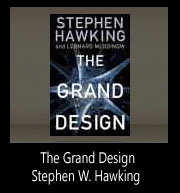 Stephen
Hawking and Leonard Mlodinow – The Grand Design (2010)
"In "The Hitchhiker's Guide to the Galaxy," Douglas Adams famously had his
characters ask a computer to provide the ultimate answer to "Life, the Universe,
and Everything." As Stephen Hawking and Leonard Mlodinow point out in their book
"The Grand Design," the computer's response -- 42 -- was less than helpful.
Hawking, who needs no introduction, and Mlodinow, a Caltech physicist with a
string of excellent books to his credit, have taken on that ultimate question in
a somewhat more rigorous form by asking three related ones: Why is there
something instead of nothing? Why do we exist? Why does this particular set of
laws govern our universe and not some other set?"
~ Read Review: James Trefil - Washington Post,
Wikipedia,
Amazon Books and
Stephen Hawking's website
Stephen
Hawking and Leonard Mlodinow – The Grand Design (2010)
"In "The Hitchhiker's Guide to the Galaxy," Douglas Adams famously had his
characters ask a computer to provide the ultimate answer to "Life, the Universe,
and Everything." As Stephen Hawking and Leonard Mlodinow point out in their book
"The Grand Design," the computer's response -- 42 -- was less than helpful.
Hawking, who needs no introduction, and Mlodinow, a Caltech physicist with a
string of excellent books to his credit, have taken on that ultimate question in
a somewhat more rigorous form by asking three related ones: Why is there
something instead of nothing? Why do we exist? Why does this particular set of
laws govern our universe and not some other set?"
~ Read Review: James Trefil - Washington Post,
Wikipedia,
Amazon Books and
Stephen Hawking's website
 Charles Dickens - A Christmas Carol (1843)
"Charles Dickens’ A Christmas Carol is the definitive Christmas story. Frank
Capra’s It’s A Wonderful Life may try each year to nudge it from its place at
the top, but Dickens’ Victorian fairy tale reigns triumphant. (The fact that it
has been adapted so many times for film, television, stage and radio gives it an
advantage.) Yet when A Christmas Carol was published in 1843, the idea of
Christmas as we know it – the essential winter holiday steeped in Victoriana –
had yet to be invented. Christmas was a one-day holiday. Christmas cards were
not introduced until 1846, and crackers did not appear until the mid-1850s. It
is nigh on impossible to imagine an English Christmas without A Christmas Carol.
That may be because it was present at the beginning of creation, as it were."
~ Written by Christopher Bryant, Copyright © Polari Magazine.
Amazon Books
Charles Dickens - A Christmas Carol (1843)
"Charles Dickens’ A Christmas Carol is the definitive Christmas story. Frank
Capra’s It’s A Wonderful Life may try each year to nudge it from its place at
the top, but Dickens’ Victorian fairy tale reigns triumphant. (The fact that it
has been adapted so many times for film, television, stage and radio gives it an
advantage.) Yet when A Christmas Carol was published in 1843, the idea of
Christmas as we know it – the essential winter holiday steeped in Victoriana –
had yet to be invented. Christmas was a one-day holiday. Christmas cards were
not introduced until 1846, and crackers did not appear until the mid-1850s. It
is nigh on impossible to imagine an English Christmas without A Christmas Carol.
That may be because it was present at the beginning of creation, as it were."
~ Written by Christopher Bryant, Copyright © Polari Magazine.
Amazon Books
 Philip Van Doren Stern - The Greatest Gift (1943)
"For almost seventy years, people the world over have fallen in love with Frank Capra’s classic Christmas
movie It’s a Wonderful Life. But few of those fans know that Capra’s film was based on a short story by Philip
Van Doren Stern, which came to Stern in a dream one night. Unable at first to find a publisher for his evocative
tale about a man named George Pratt who ponders suicide until he receives an opportunity to see what the world
would be like without him, Stern published the story in a small pamphlet and sent it out as his 1943 Christmas
card. One of those 200 cards found its way into the hands of Frank Capra, who shared it with Jimmy Stewart, and
the film that resulted became the holiday tradition cherished today."
Amazon Books
Philip Van Doren Stern - The Greatest Gift (1943)
"For almost seventy years, people the world over have fallen in love with Frank Capra’s classic Christmas
movie It’s a Wonderful Life. But few of those fans know that Capra’s film was based on a short story by Philip
Van Doren Stern, which came to Stern in a dream one night. Unable at first to find a publisher for his evocative
tale about a man named George Pratt who ponders suicide until he receives an opportunity to see what the world
would be like without him, Stern published the story in a small pamphlet and sent it out as his 1943 Christmas
card. One of those 200 cards found its way into the hands of Frank Capra, who shared it with Jimmy Stewart, and
the film that resulted became the holiday tradition cherished today."
Amazon Books
|
Top of Page | ||
